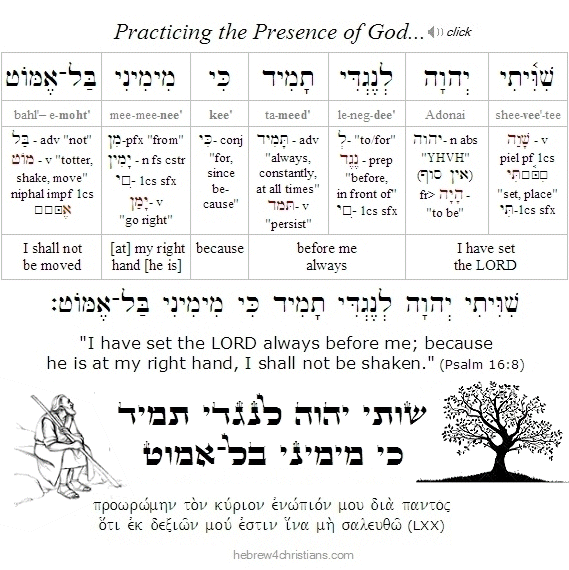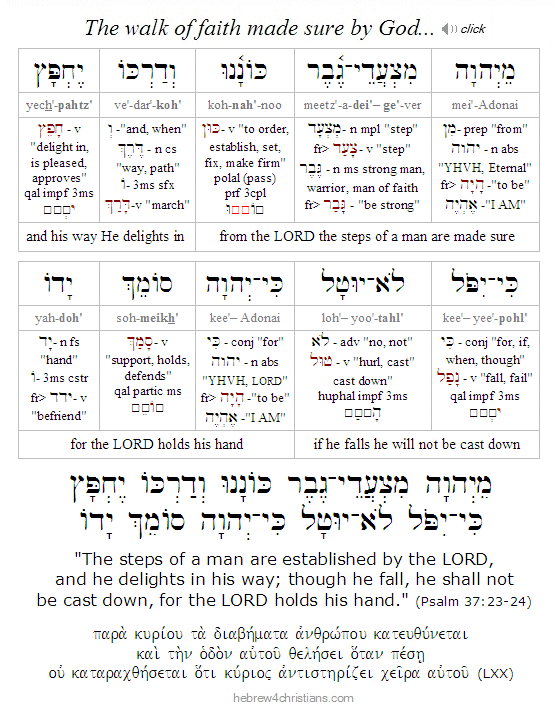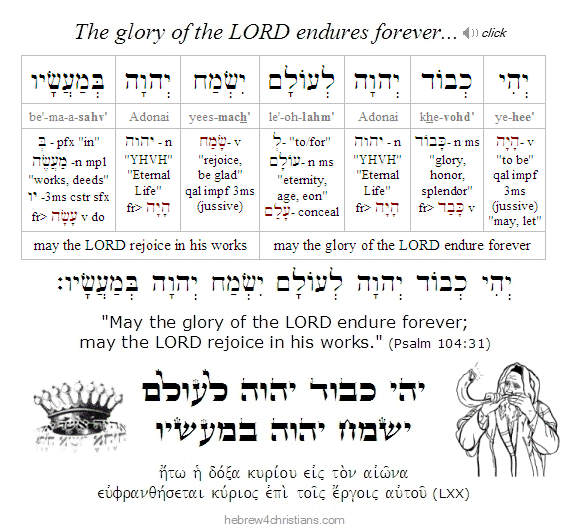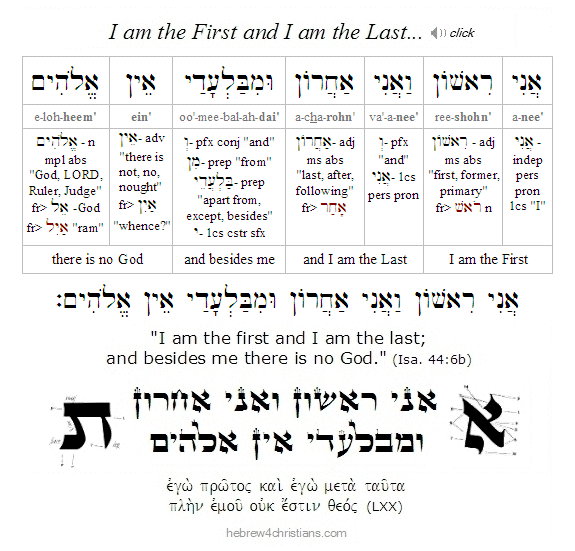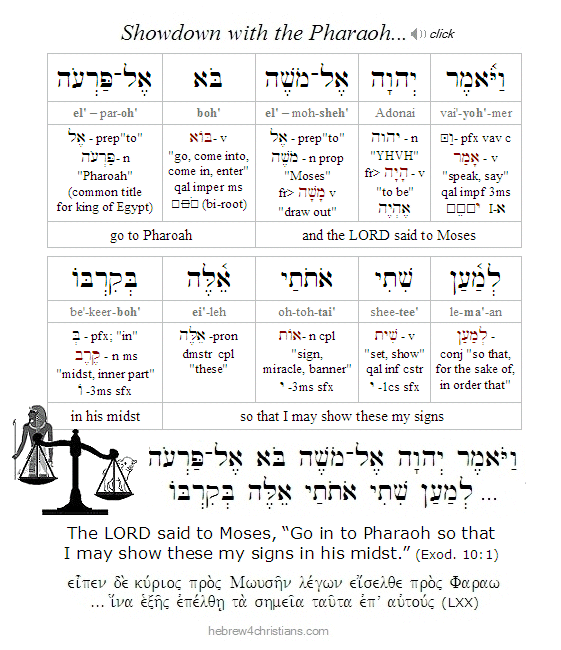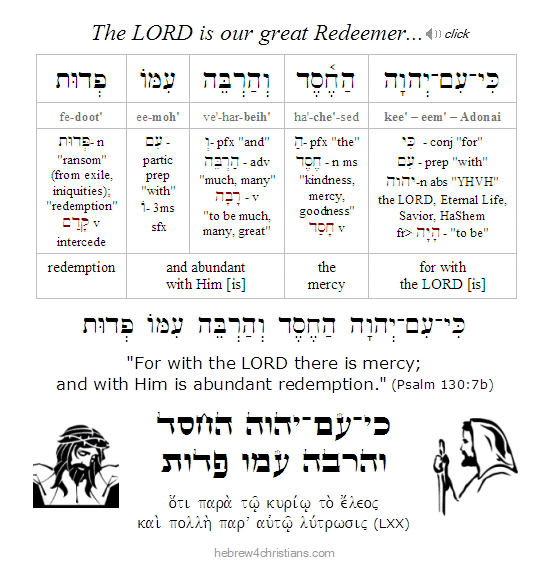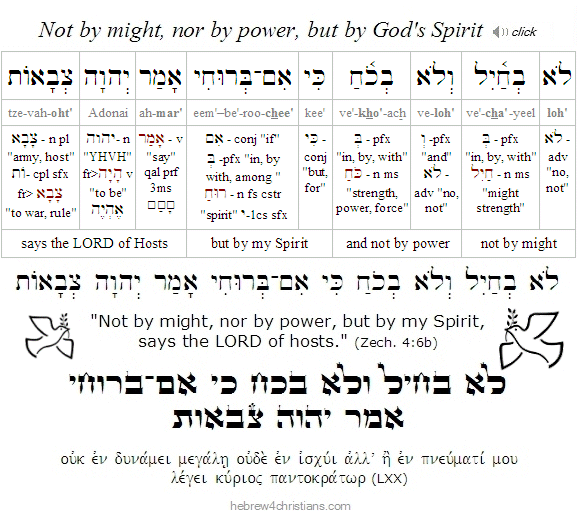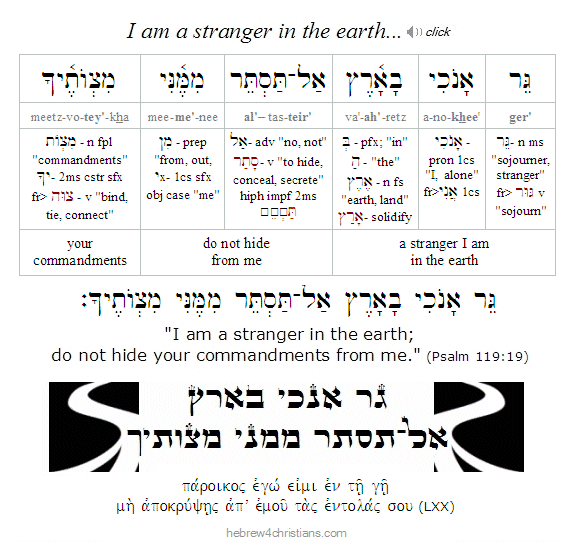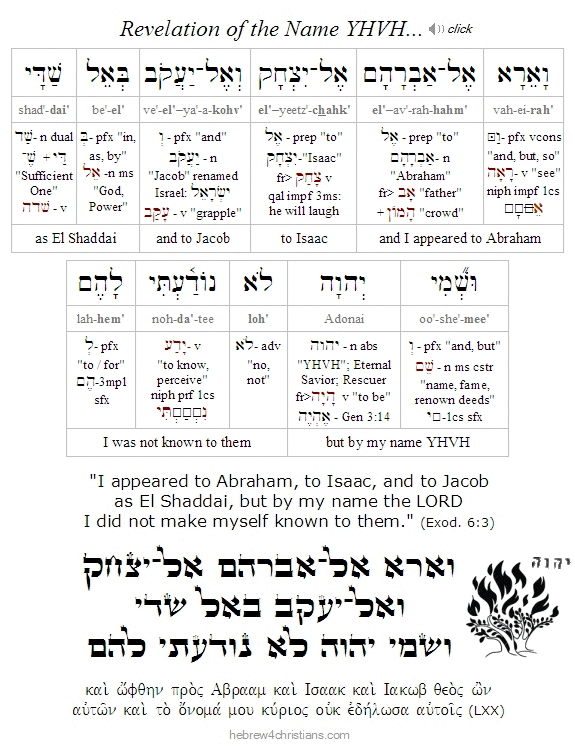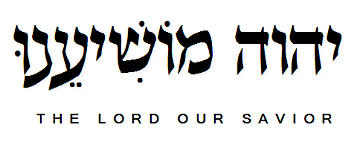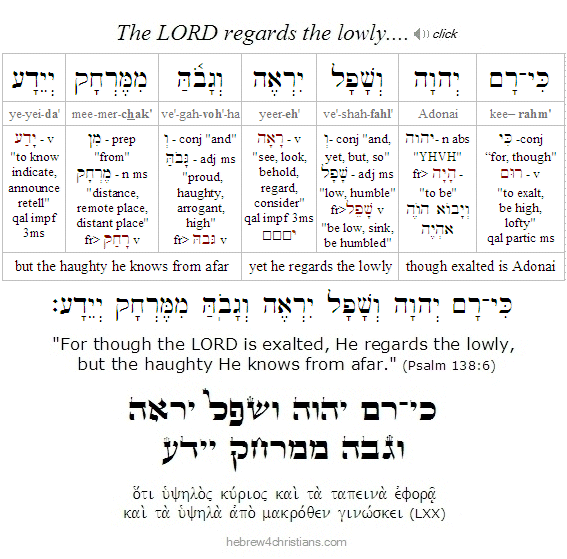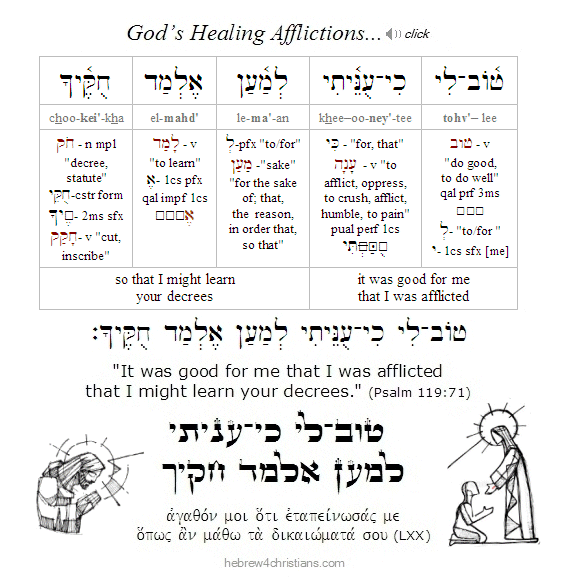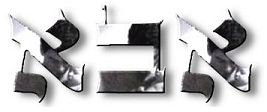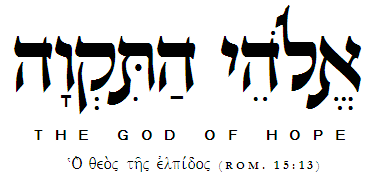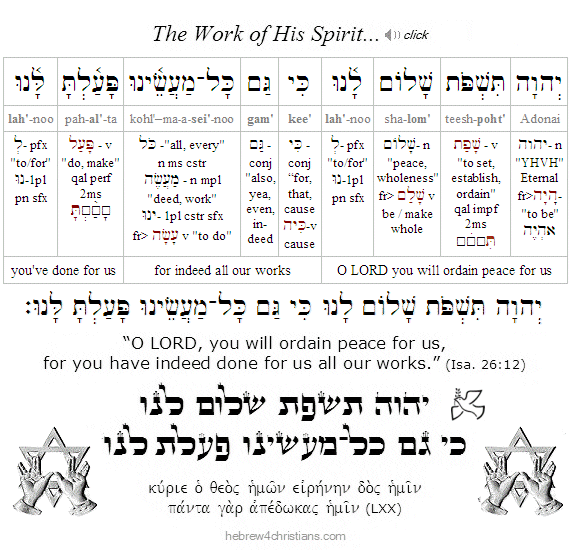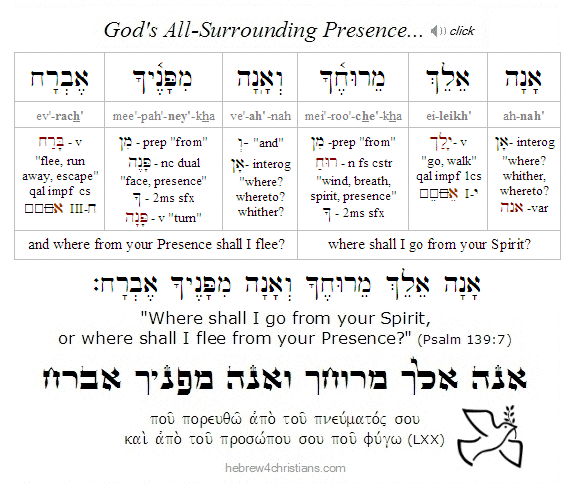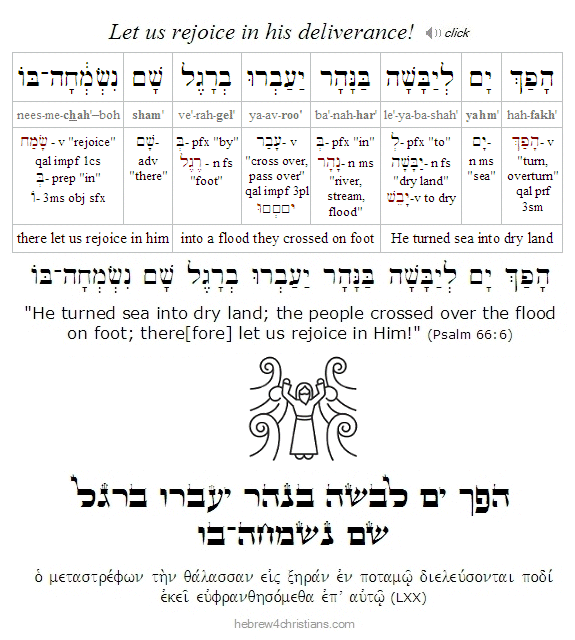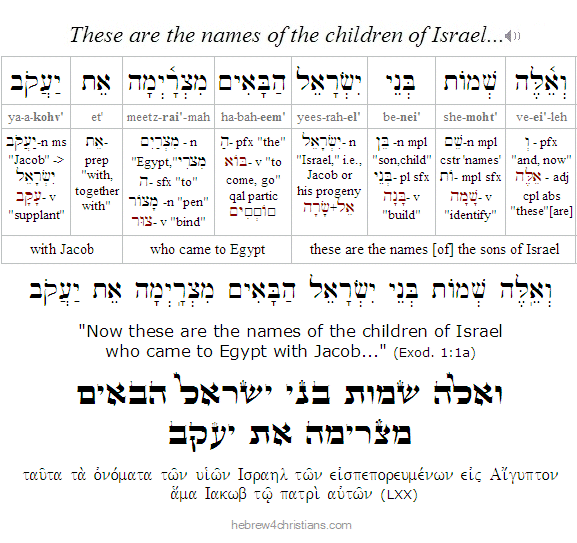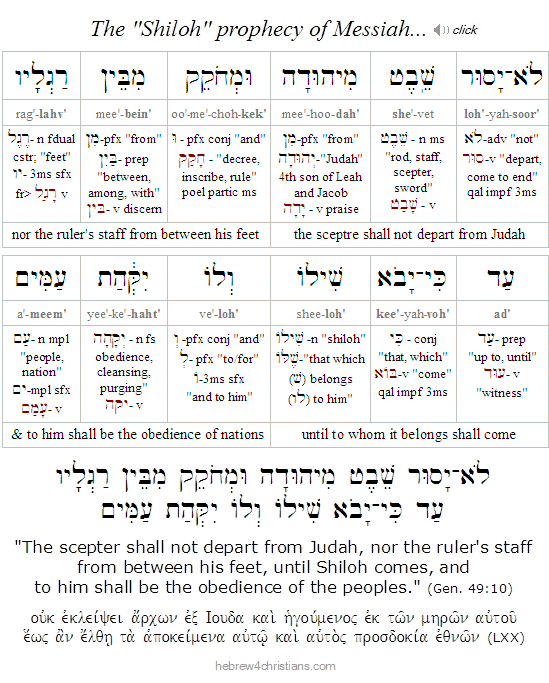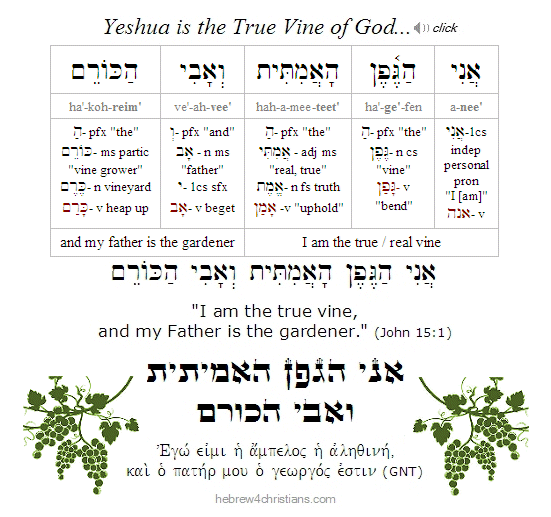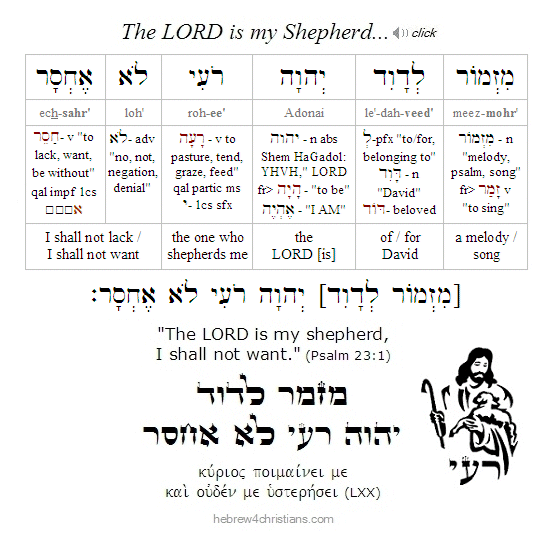|
Jewish Holiday Calendar
For January 2025 site updates, please scroll past this entry....
The Torah divides the calendar into two symmetrical halves: the Spring and the Fall, indicating the two advents of Messiah. The Biblical year officially begins during the month of the Passover from Egypt (called Rosh Chodashim, see Exod. 12:2), and the spring holidays of Passover, Unleavened Bread, and Firstfruits both recall our deliverance from Egypt and also our greater deliverance given by means of the death, burial, and resurrection of the Messiah, the great Passover Lamb of God. Yeshua was crucified on erev Pesach, buried during Unleavened Bread, and was resurrected on Yom Habikkurim (Firstfruits). The holiday of Shavuot (i.e., "Pentecost") both commemorates the revelation of the Torah at Sinai as well as the revelation of the Ruach HaKodesh (Holy Spirit) at Zion.
The intermediate months of summer end with the advent of the sixth month of the calendar, called the month of Elul, which recalls the time Moses interceded on behalf of Israel after the sin of the Golden Calf. To commemorate this time of our history, we likewise focus on teshuvah (repentance) in anticipation of Rosh Hashanah and especially in anticipation of Yom Kippur, the great "Day of Atonement." In Jewish tradition the 30 days of Elul are combined with the first ten days of the seventh month (called the "Days of Awe") to set apart "Forty Days of Teshuvah" leading up to the Day of Forgiveness for Israel. Immediately following Yom Kippur, the mood changes as we begin preparing for a joyous week-long celebration called Sukkot (i.e., "Tabernacles") that concludes with the holiday of Simchat Torah.
The winter holidays (חגי החורף) remember special times when God acted on behalf of His people so that they would triumph over their enemies, and therefore they prophetically picture the final victory in the world to come:
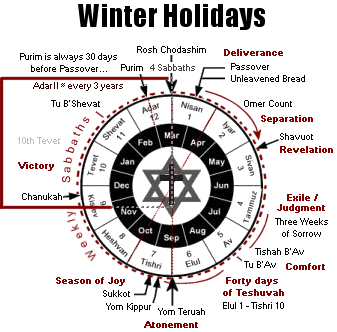 |
The Winter Holidays:
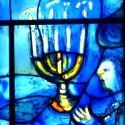
Note that in accordance with tradition, the following holiday dates begin at sundown:
- Month of Tevet (Mon., Dec. 30th [eve] - Wed. Jan. 29th [day])
- Month of Shevat (Wed. Jan. 29th [eve] - Thurs. Feb. 27th [day])
- Month of Adar (Thurs. Feb. 27th [eve]) - Sat. March 29th [day])
- Month of Nisan (Sat. March 29th [eve]) - Sun. April 27th [day])
 |
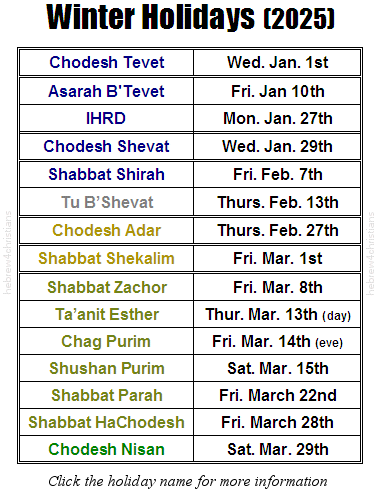 |
Note: For more about the dates of these holidays see the Calendar pages....
January 2025 Updates
Note: If any page content appears to be missing, please refresh the page...
Sanctifying the Truth...
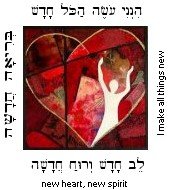
01.31.25 (Shevat 2, 5785) How do we share the message of God with others? How do we reveal the truth of Messiah in this world? In other words, how may the Spirit of God be manifest within us? The Scriptures say first to "sanctify the Messiah" within our hearts and then we will be ready to give a reason for our hope -- though we must do so in humility and reverence before heaven" (1 Pet. 3:15). We sanctify the Lord by choosing to make sacred place for him within our consciousness; we enshrine him and esteem him beautiful within our affections and actions (Exod. 15:2). When God said to his people, "Let them make for me a sacred place (i.e., mikdash: מִקְדָּשׁ) that I may dwell in their midst," then, he was inviting them to make room within their hearts (בְּתוֹכָם) for His Presence to be revealed (Exod. 25:8). As Yeshua taught us: "The Kingdom of God is within you" (Luke 17:21).
King David understood this principle: "I have set the LORD always before me..." (Psalm 16:8). In other words we must open our eyes to see; we must humble ourselves to believe; and we must open our hearts before the greatness of God. This is the first step, as Yeshua taught us: Avinu shebashamayim, yitkadesh shemekha - "Our Father in heaven, let your Name be sanctified" (Matt. 6:9). As we sanctify the Lord we bear witness of the truth of Reality, and the Spirit of God will empower us to living signs of the Divine Presence. "But the fruit of the Spirit (פְּרִי הָרוּחַ) is love, joy, peace, patience, kindness... (Gal. 5:22-23).
"Know therefore this day and lay it to your heart, that the LORD is God in heaven above and on the earth beneath; there is no other" (Deut. 4:39). Note that the phrase "lay it to your heart" in this verse may better be rendered as "return to your heart" (וַהֲשֵׁבתָ אֶל־לְבָבֶךָ), suggesting that the truth of the LORD is found there – within the heart that truly seeks him (Jer. 29:13). Hashivenu! In other words, the truth is found in the heart's seeking for the LORD and His love. Know this truth today... "The most important part of teaching is to teach what it is to know," that is, to know "in your heart."
Shabbat shalom and love to you, chaverim...
Hebrew Lesson
Psalm 16:8 reading (click):
Stewardship for Life...
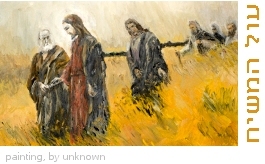
"One life on this earth is all that we get, whether it is enough or not enough, and the obvious conclusion would seem to be that at the very least we are fools if we do not live it as fully and bravely and beautifully as we can." - Frederick Buechner
01.31.25 (Shevat 2, 5785) When I first read the parable of the "unjust steward" (see Luke 16:1-13), I was a bit puzzled. Yeshua tells the story of a certain rich man who had discovered that his "steward" (or manager) was stealing from him, and he therefore decided to remove him from his service. The steward, in his desperation, then quickly called his employer's debtors and gave each a significant discount on the debt they owed. In this way the steward sought to gain their favor so that he would be taken care of in days to come...
Now what is surprising about this story is that Yeshua commended the unjust steward for his shrewdness, and then he cryptically added: "Make friends for yourselves by means of the "mammon of unrighteousness" (μαμωνᾶ τῆς ἀδικίας), that when it fails, they may receive you into the eternal dwellings" (Luke 16:9). Wait, what? How are we to understand this?
At first glance the story seems simple enough, at least in worldly terms: Do someone a favor in their need, and they will reciprocate regarding your need: "Scratch my back, and I will scratch yours." It is likely that the steward thought that if he did some favors for others, they would return the favor in the days to come. Moreover the steward, savvy as he was, likely understood that the interest charged to the debtors was technically forbidden by Jewish law, and therefore he reasoned that his wealthy employer could not accuse him of larceny without therby incriminating himself. He could therefore leverage the loss of his job and make a profit for himself at the same time. Despite the devious ploy, however, the rich man "commended" (i.e., ἐπαινέω, "praised") the steward because he had acted shrewdly. "Check Mate..."
Now this story is not to suggest that our righteous Lord in any way approved of such devious financial schemes and deception, though it is likely Yeshua told the story to illustrate the importance of seizing opportunities in life with an eye to future benefit. He was drawing a comparison: just as this unjust steward sought to manage his desperation to secure for his future, so the godly should manage their resources and opportunities so that they will be welcomed into the "eternal habitations" of heaven itself. If worldly wealth can be used to gain friends that will welcome you into their hearts, then how much more should such wealth be used to secure the "true riches" of blessing of the world to come?
Yeshua admonishes both his followers as well as those who rely on worldly wealth: The one who is faithful with little is faithful also in much, but the one who is unjust in the least is unjust also in much. If we are not trustworthy in handling worldly wealth, how will we be so regarding heavenly riches? He therefore said that it is not possible to serve both God and "mammon," a word that means possessions of all kinds -- not just money or silver. If you place mammon as your highest good or concern, you cannot serve God, since covetousness, desire, and various fears will demand all of your heart, soul, and strength.
Our stewardship of mammon is therefore a spiritual test, since mammon will either control us as we seek worldly power and personal satisfaction, or we will yield all that we have to the LORD for godly and righteous purposes that will yield interest in this world and riches in the world to come. When Yeshua said "gain friends so that you will be welcomed into eternal habitations," he meant that we should be rich toward God by helping others, by promoting organizations that teach and share the message of the gospel, and so on (Luke 12:21).
Therefore invest your life and your resources "shrewdly" for eternal purposes. Whether you have much or little, do what you can for the sake of the Kingdom of God. The stewardship of your resources has eternal significance and consequences. Imagine that when your life is over how the account ledger will read... Will your life be credited by giving the gifts you were given for the blessing of others, or will it expose your worldly debits and fears? "Follow the money" and you will see what you find to be most important, after all.
We are all stewards - not owners - of whatever we have. In Hebrew, we do not say "I own x," but instead say "there is to me x" (יש לי) implying that God alone is the Source and Owner of reality. Wealth can be a blessing or a curse depending on how it is used. Our Lord teaches that we should be "shrewd" in our investments for the sake of what really matters. The choices we make today will follow us tomorrow, and indeed, for eternity.
We are all in the divine school, being educated for eternity. May God help us to be good "talmidim" (students, learners, disciples) as we work through the exercises of our lives...
Hebrew Lesson
Proverbs 11:18 reading (click):
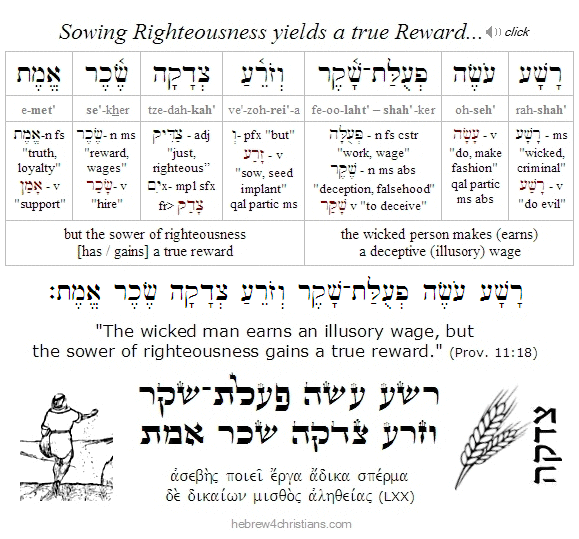 |
Not losing your mind...

01.31.25 (Shevat 2, 5785) The Apostle Paul foretold that the time before the "End of Days" would be "perilous" and full of unrelenting human depravity and lawlessness (2 Tim. 3:1-5). Yeshua warned that apostasy would abound and that the hearts of many would run cold as ice (Matt. 24:12). In light of the raging spiritual war going on all around us, the following needs to be emphatically restated: "The important thing is to not lose your mind..."
The mind is the "gateway" to your heart, and it is therefore essential to guard your thinking by immersing yourself in the truth... "Not losing your mind" therefore means being grounded in what is real, and it therefore means understanding your identity and provision as a child of God. "God has not given us the spirit of fear, but of power and of love, and of a sound mind" – literally, a "delivered" mind, "healed" from chaos and despair (2 Tim. 1:7). The Greek word "sound mind" (σωφρονισμός) comes from a verb meaning "to be made safe," in the sense of being under restraining influence of the Spirit of God... The closest Hebrew word might be musar (מוסר), or "moral discipline."
Part of the task of "guarding your mind" is being able to discern between good and evil. "The fear of the LORD is to hate evil" (Prov. 8:13) and as the prophet cried out, "Hate what is wrong, love what is right" (Amos 5:15). We must love the truth and abhor the lie (Psalm 119:163, Zech. 8:19; Prov. 12:22). Tolerating sin in a world ripe for judgment is a tacit form of "collaboration" with the enemy. Indeed, the only thing regarded as intolerable in the devil's world is the denial that people have the "liberty" to sin. But the Lord is clear on this point: "Woe to those who call evil good and good evil, and who turn darkness into light and light into darkness, to those who turn bitter into sweet and sweet into bitter. Woe to those who are wise in their own eyes, and shrewd in their own sight!" (Isa. 5:20-21). It is the truth that sets people free, but this presupposes the ability to discern how we become enslaved to deception. Therefore we are instructed: "You are to distinguish between the holy and the common, and between the unclean and the clean" (Lev. 10:10).
Someone who loves you will to help you stay honest with yourself: The truth of God's moral law is likened to a Father's moral correction that leads his child to life (Prov. 6:23).
Hebrew Lesson
Psalm 119:105 Hebrew reading (click):
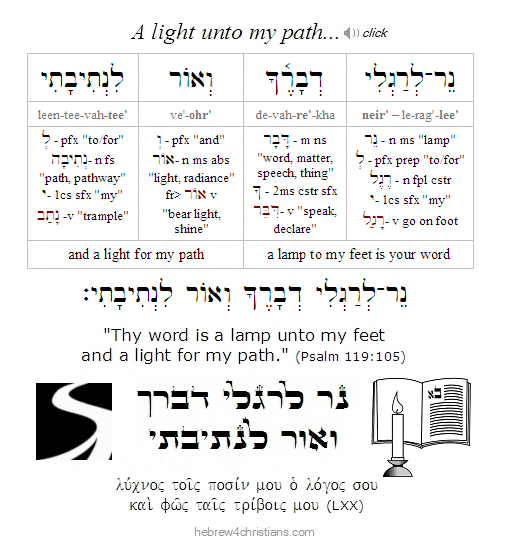 |
Shelter of the Most High...
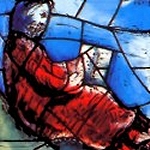
01.31.25 (Shevat 1, 5785) The "world" is a place of fearful exile from the Lord. To find healing, turn away from its faithless messages and listen (shema) to the great promises of God. As it is written: "He who abides in the secret of the Ascended One will dwell in the shadow of Shaddai" (Psalm 91:1).
The sages say that Moses wrote Psalm 91 as he dwelt in the secret place (סֵתֶר) of the Most High God, in the "midst of the dark cloud" (Exod. 24:18), a place of sacred and holy concealment. The thick clouds are a "hiding place" for him (Job 22:14). Notice that the one who "abides" in the secret of the Most High dwells in an ascended place of rest – being lifted up above the surrounding madness of this fallen world of flux and shadows. The Hebrew word means to lodge or to "sleep" (לִין), connecting it with death and resurrection. By dwelling in the death and resurrection of Yeshua, God will shield you with His Presence and make evil powerless before you.
When you "abide" in the secret of Elyon - the Ascended One - you are concealed by the dark clouds of His Glory, and the Presence of Shaddai overshadows you... The LORD will save you from the ensnaring trap and from the devastating pestilence (Psalm 91:3). By abiding in the truth that God's Presence pervades all things at all times - you become a "stranger" (גֵּר) with the LORD in this world, a "sojourner" (תּוֹשָׁב) who awaits the recompense of the wicked and the healing of the world at the end of the age. "You will tread on the lion and the adder; the young lion and the serpent you will trample underfoot" (Psalm 91:13).
We are made secure only on account of the LORD our God Yeshua, who gloriously ascended over the powers of this age, the hidden principalities of darkness, and who made safe passage for us to come by means of his sacrificial death on the cross. Yeshua is the Bridge and the Way to the truth that sets you free, though He indeed is the narrow bridge. Because of Him alone, we have access to the Divine Presence, the Holy of Holies made without human hands. Yeshua is the Ascended LORD of Glory, the Master of all possible worlds, and the King over all things. Nothing can stop Him or thwart His victory secured for those who trust in Him.
Hebrew Lesson:
Psalm 91:1 Hebrew reading (click):
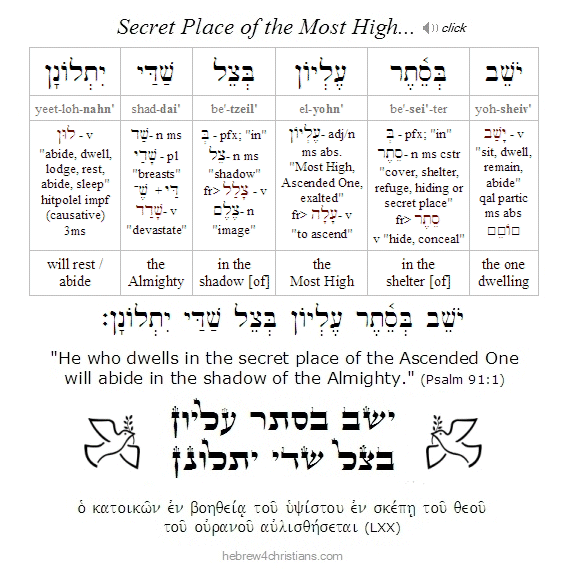 |
Since God hides Himself in this world (Isa. 45:15), we must humbly seek His face to enter into the place of His holy concealment in all things. God is Elyon – High above - but He dwells "with the lowly and the broken of heart" (Isa. 57:15). Therefore the LORD our God is called Shaddai (שַׁדַּי) – our Sustainer, Provider, Refuge, and Home. Just as we can be surrounded by the "shadow of death" (tzal mavet), so we can be surrounded by the "shadow of Shaddai" (tzal Shaddai). Like a powerful eagle brooding over her chicks, so Shaddai covers you with wings of protection (Psalm 91:4).
Seeing the Invisible...
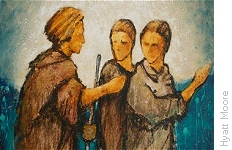
In this age we catch only "glimpses" of God as we walk by faith, not by sight. Faith allows us "see" past the scrim of this world but for a moment. "For now we see through a glass darkly..." There awaits for us, however, just beyond the veil, the substance of our hope, and then we will behold His glory "face to face..."
01.31.25 (Shevat 1, 5785) Two men walked along the "road to Emmaus" from Jerusalem after hearing about the empty tomb of Yeshua. Apparently these two men, named Cleopas and Simon, associated with the disciples of Yeshua and knew Mary Magdalene, Salome, and Mary the mother of James, as well Peter and John (Luke 24:22-24). However, for unknown reasons they had left from Jerusalem, perhaps to return to their home town after the Passover pilgrimage. While they were Jewish believers in the Lord, they struggled to make sense of what happened to Yeshua and why he was crucified...
"Now while they were talking and reasoning together, Yeshua himself drew near and went with them. But their eyes were restrained, so that they did not recognize him" (Luke 24:15-16). Their eyes were "restrained," the Greek verb indicates that they were withheld or prevented from seeing. This recalls how Mary Magdalene looked on and failed to recognize Yeshua at the empty tomb, supposing him to be a gardener instead (John 20:24-25).
Soren Kierkegaard comments that the Savior walks unseen on the way with us, as he did with these two sad people, but we are often unaware of his presence. "We wish, sigh, and are occupied, yet just as we can tell the time by observing the shadows our bodies cast, so we can tell a person's maturity by how near he thinks the highest is to him." Despite this, Yeshua's first post-resurrection revelation would come to these two unsuspecting men.
It's not as if Yeshua had not foretold of his death, burial, and resurrection before, but his message was somehow lost to the disciples and they could not seem to fathom its importance. Their eyes were likewise "restrained" (Matt. 16:21; Matt. 17:22-23; Mark 10:32-34, Luke 24:6-7). Nevertheless, Yeshua took the time to contextualize his mission with them: "And beginning at Moses and all the Prophets, he expounded to them in all the Scriptures the things concerning himself" (Luke 24:27). Still they were full of questions, their heads spinning over what they were being told. As they drew near to the village where they were going, Yeshua acted as though he wanted to go further. But they urged him, saying, "Abide with us, for it is toward evening, and the day is far spent." So he went in to stay with them (Luke 24:28-29). They felt lost; they couldn't keep up with what was being said, but the Lord was patient with them.
After awhile, as he was sitting at the table with them, Yeshua took bread, blessed and broke it, and gave it to them. And then came the great moment. Their eyes were suddenly "opened" and they recognized him; and he vanished from their sight (Luke 24:30-31). He "vanished" because he did not wish to be known directly at this time (1 Cor. 13:12). He "hides" so that we may learn to seek Him. It is faith that sees, the "eyes of the heart" that recognize the miracle of God's grace revealed in Yeshua. This is the season wherein we "walk by faith, not by sight" (2 Cor. 5:7); there is a coming day when all will finally be revealed (Rev. 1:7).
But what did these two men recognize? What did they see? What did they learn? Was it not that Yeshua embodies the words of Moses and the Prophets, and the Psalms, as he later reaffirmed to the other disciples who likewise had their minds opened so they could understand the Scriptures (see Luke 24:44-45)? Yeshua is the Lamb of God, the heart and center of divine revelation. "Then their eyes were opened" and they saw his brokenness, his wounds, his sacrificial death as the great "Passover of the LORD" given on our behalf. Their eyes were opened when they saw Yeshua lifted up upon the cross, the place where all people are drawn to God (John 3:14:-15; John 12:32).
The walk of faith is one of "unseen hope," even though our Lord is always close (Deut. 30:14). It was "toward the evening," the day far spent, in the later hours that the glimpse was given, when the heart of faith finally recognizes that God has walked by his side all through the days of life. "What will death be like?" they asked the teacher. "It will be as if a veil is ripped apart and you will say in wonder, "So it was you all along!" (De Mello).
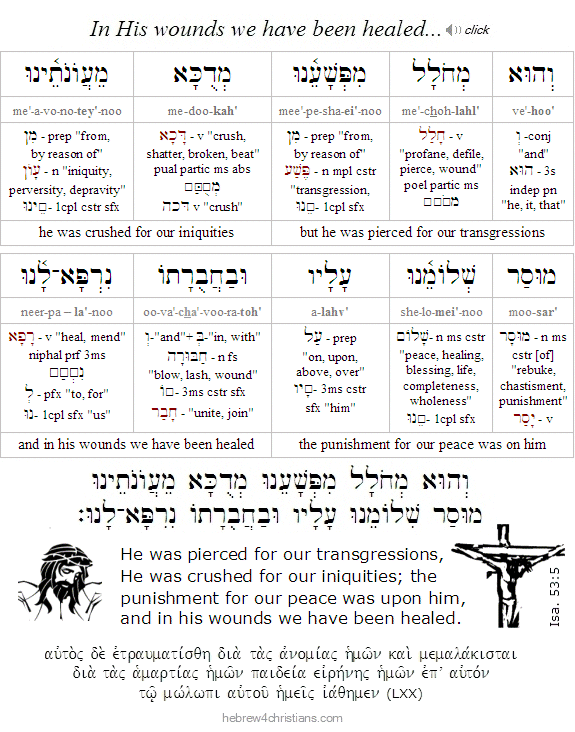 |
Teach us to Pray...
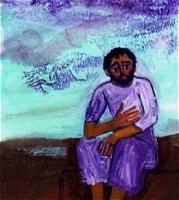
Prayer is not what is done by us, but rather what is done by the Holy Spirit within us...
01.30.25 (Tevet 30, 5785) There is only one place in the New Testament where the disciples asked Yeshua to teach them something, and that was when they said, "Lord, teach us to pray" (Luke 11:1). Yeshua then responded by giving them a pattern of prayer that's been called "the Lord's Prayer," though it's better to think of it as a model for prayer instead of a formulaic petition to recite. After all, the disciples asked "Teach us to pray," not "teach us a prayer," as if a special prayer could serve as a sort of incantation to propitiate God.
Yeshua points us to the Father. He did not suggest using Pharisaical expressions such as "Barukh attah Adonai," "Ribbono shel Olam," or "Elohei Avoteinu," nor did he endorse praying three times a day as decreed by the elders of the Great Assembly. No, Yeshua taught us to come to God using the simple word "Father." This is the language of familiar intimacy that expresses the trust a young child has for his earthly father.
So Yeshua teaches us to pray in heartfelt confidence that God is our caring heavenly Father, and this implies that we understand and regard ourselves as his beloved children. We have access to God's heart in a direct and meaningful way.
As God's beloved children, we are to honor and our heavenly Father and to esteem his will and vision for our destiny. "Holy is Thy name"; "Thy will be done"; "Thy kingdom come" - all these matters come before requests for our "daily bread" -- and even before matters of our need for forgiveness of sin. Of course God cares for our daily needs, our forgiveness, our deliverance from evil, and so on, but Yeshua concentrates our focus on the Father and our identity as his children first of all. Da lifnei mi attah omed: "Know before whom you stand."
Regarding our personal petitions, it is wise to understand that your Heavenly Father gives what you need, not what you may want at the time. "Ask and it shall be given you" means "keep on asking" (Luke 11:9). If a recurring request seems to go unanswered, remember that initial barriers are not necessarily refusals but are meant to yield what is best for you (Rom. 8:28). We can be confident, however, that God hears us when we pray and that he gives "good gifts" to those who ask Him (Matt. 7:11) -- in particular, gifts of the Holy Spirit (Luke 11:13). God gives wisdom to those who ask for it (James 1:5) and imparts the "spirit of wisdom and revelation to know him better" (Eph. 1:17). If we ask in accordance with his will, we have confidence that he will act on our behalf (1 John 5:14-15). These are "spiritual blessings in heavenly places" representing the deepest need of our hearts.
We are instructed to "present ourselves to God as those who are alive from the dead" (Rom. 6:13), indicating that we are to come confident of his acceptance because of what Yeshua has done on our behalf. We are "crucified with Christ" (Gal. 2:20) and share in his resurrection life. In the Torah the "daily sacrifice," or korban tamid (קָרְבַּן תָּמִיד), was offered to the LORD every morning and evening upon the altar, which corresponds to being a "living sacrifice" (i.e., korban chai: קָרְבָּן חַי) to the LORD (Rom. 12:1-2). We are to "pray without ceasing," which means living what we believe in all that we do. We take up our cross daily (Luke 9:23). We come "boldly" before the throne of grace. We are made "alive from the dead" to access God's presence and heart for us at all times. We have been made new creations, members of God's household, esteemed, eternally beloved....
Hebrew Lesson
Matthew 6:9b reading (click):
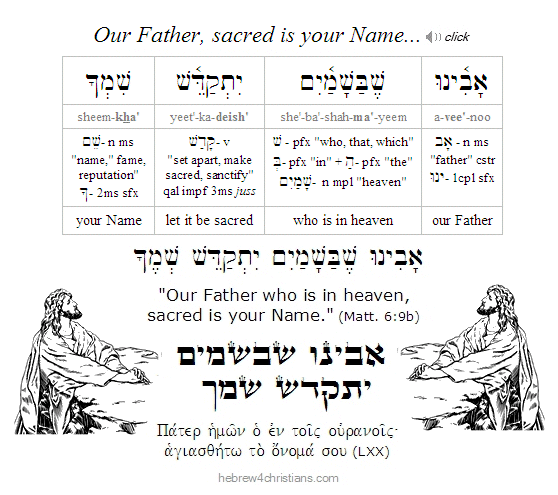 |
Essential Jewishness...
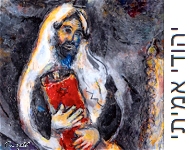
01.30.25 (Tevet 30, 5785) In this week's Torah reading, parashat Bo, we read about the final plague that God would bring upon Pharaoh and the Egyptians. The previous nine plagues were terrible in consequence and clearly demonstrated God's justice and power, but the death of the firstborn (i.e., makkat bechorot: מַכָת בְּכוֹרוֹת) was the final blow that would finally move Pharaoh to repent of his oppression of the Israelites.
According to some of the Jewish sages, the final plague was intended to impugn the ancient institution of "primogeniture," that is, the special status and privilege given to the firstborn son. Consider, for instance, the Torah's narratives about Cain and Abel, Ishmael and Isaac, Esau and Jacob, Reuben and Judah, Manesseh and Ephraim. Or think about the choice of Moses or King David. In each of these cases the firstborn son was "passed over" by God; and in each case genuine devotion to God was the decisive factor. In other words, the Torah makes the point (repeatedly) that personal godliness is more important than genealogy or genetics. Unlike ancient Egypt, people are not to be given special treatment because of their birth order or their lineage, certainly not before the Master of the Universe who is "no respecter of persons" (Deut. 10:17, 16:9; Prov. 24:23, Rom. 2:11, etc.). "Freedom from slavery" means more than recreating yet another caste system...
But what about Israel being called the "firstborn son" of God (בְּנִי בְכרִי יִשְׂרָאֵל)? The sages state that this status must be regarded as sacred because of God's promise to the Jewish people, but individually speaking, if a particular Jew does not keep the Torah or choose to keep faith with the LORD, he or she will be "passed over" as well... Okay, but what about the selection of the Levites? Were they not "exchanged" for the firstborn sons of Israel because of the sin of the Golden Calf? Yes, but that in itself lends credence to the idea that status as a favored child of God comes through faith and obedience, since it was the Levite tribe that did not lapse in faith by worshipping the golden calf idol (Exod. 32:27-28). Later, of course, the Levites became itinerant teachers in Israel (living in Cities of Refuge), but eventually spiritual leadership was assumed by the Sages who through study and devotion to the Torah became the chosen heirs of Israel. By the time of Yeshua personal godliness was recognized as more important than physical lineage or genealogy...
All of this leads to questions about the meaning or essence of "Jewishness." First we need to understand that the word "Jew" (i.e., yehudi: יְהוּדִי) comes from the patronym "Judah" (יְהוּדָה), which derives from a Hebrew root "yadah" (יָדָה) that means "to confess, to give thanks, to laud, or to praise." Note that every letter of the Divine Name (יהוה) appears in the word Judah (with the addition of the letter Dalet (ד) that indicates the door or way to God).
In Jewish tradition, there are two basic views about the essential character of the Jewish people (יַהֲדוּת). First, Rabbi Yehuda Halevi takes an ethnocentric approach by claiming that the Jewish soul is somehow different than the non-Jewish soul, possessing a mystical quality called "segulah" (סגולה). The Jew is therefore "ontologically" different than the Gentile, possessing a "higher-grade" neshamah (נְשָׁמָה), or soul. This is the "tribalist" mentality that is often found in various ultra-Orthodox communities... Maimonides, on the other hand, who was more Greek-minded, stated that there is nothing extraordinary about the Jewish soul in itself, but only if a Jew keeps the Torah is he worthy of the name, and if not, he is just like a non-Jew. It is obedience to the Torah - living God's will - that makes a Jew special and holy.
Rabbi Abraham Isaac Kook (1865–1935), the first Ashkenazi Rabbi of the modern State of Israel, attempted to mediate these views by quoting the Talmud (Sanhedrin 59a): "You shall therefore keep my statues and My ordinances, which if a man (adam) does, he shall live by them..." (Lev. 18:5). R' Meir interprets that the Torah's choice of the general word "man" (adam) means that even a non-Jew who keeps the Torah is as great as the High Priest.
In other words, personal godliness is the issue, not genealogy. Jews cannot rely on their mere inclusion of ethnic Israel for righteousness (though God has indeed promised a glorious future to ethnic Israel). Indeed, if a Jew is ungodly, then a godly Gentile is considered more righteous than they (Rom. 2:27). Once again, individual godliness is more important than ethnic identity or genetics.
The Apostle Paul, the quondam student of Gamaliel the Elder (רַבַּן גַּמְלִיאֵל הַזָּקֵן) -- who was the grandson of the renowed Torah sage Hillel the Elder (הלל הזקן) -- had argued along these same lines in his epistle to the Romans:
"Circumcision indeed is of value if you obey the law, but if you break the law, your circumcision becomes uncircumcision. So, if a man who is uncircumcised keeps the precepts of the law, will not his uncircumcision be regarded as circumcision? Then he who is physically uncircumcised but keeps the law will condemn you who have the written code and circumcision but break the law. For no one is a Jew who is merely one outwardly, nor is circumcision outward and physical. But a Jew is one inwardly, and circumcision is a matter of the heart, by the Spirit, not by the letter. His praise is not from man but from God." (Rom. 2:25-29)
The very first occurrence of the word Torah (תּוֹרָה) in the Scriptures speaks of Abraham's obedience to God's instruction (Gen. 26:5), and the second occurrence occurs in the verse that says, "There shall be one law for both the native and for the stranger..." / תּוֹרָה אַחַת יִהְיֶה לָאֶזְרָח וְלַגֵּר (Exod. 12:49), referring to the observance of Passover. Torah - in terms of general instruction regarding the will of God - was always meant to be for all people...
Finally, what do we make of the idea that ethnic Israel is called the "first born" of God (Exod. 4:22)? Well, despite the fact that "Jewishness" is a matter of the heart - not of genetics - there are still prophetic promises given to the physical descendants of Abraham, Isaac, and Jacob to inherit the land, to be supernaturally preserved as a people, and to be recipients of the Millennial Kingdom of God on the earth. The LORD has always had a remnant of Israel (i.e., she'arit Yisrael: שארית ישראל) that has believed in Him - and this remnant today includes those Jews who have accepted Yeshua as their Messiah. But the Hebrew prophets are explicit: There awaits a future yet to be fulfilled for ethnic Israel. Yeshua confirmed this when He said He would return to Jerusalem at the end of the "End of Days." As the Apostle Paul said: "And in this way all Israel will be saved, as it is written, 'The Deliverer will come from Zion, he will banish ungodliness from Jacob'" (Rom. 11:26).
So what might all this mean for you? Well, if you are someone who genuinely trusts in Yeshua as your Savior and Israel's Messiah, then you share the heritage and glory of Israel -- regardless of your personal DNA or your particular genealogy. By God's mercy you have been "grafted in" to the covenants, blessings, and promises given to the "commonwealth of Israel." As Paul says, you are no longer an "alien" or "stranger" to God's family but can call upon the LORD God of Israel as your God (Eph. 2:12). As a follower of the Jewish Messiah, you are now made a "Jew inwardly" (i.e., yehudi shebe'lev: יְהוּדִי שֶׁבַּלֵּב) with a circumcised heart (Rom. 2:29, Col. 2:11). You understand that just as the LORD God of Israel will never forsake His covenant promises to the descendants of Abraham, Isaac, and Jacob, neither will He ever forsake His covenant love for you... Amen. Bless His glorious Name!
Hebrew Lesson
Genesis 29:25b reading (click for audio commentary):
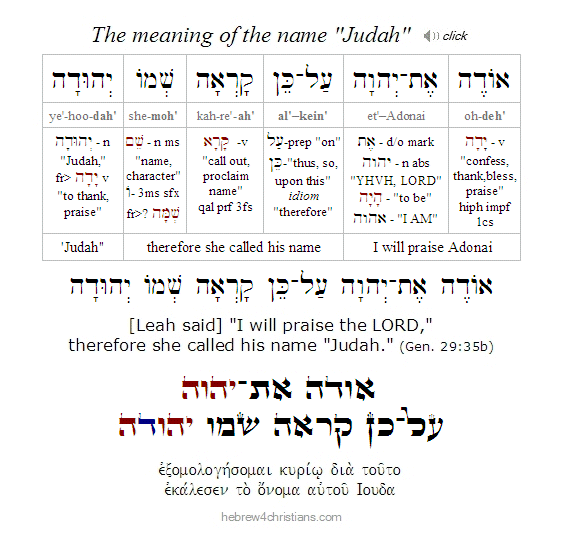 |
Finding True Life...
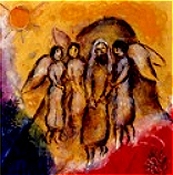
You can't die "in him" if you have never lived in him; but if you live in him, nothing can separate you from his love and life...
01.29.25 (Tevet 29, 5785) The Hebrew word for "life" is chayim (חַיִּים), which is written in the plural to imply that life cannot be lived alone... Embedded within the word itself are two consecutive Yods (יי), representing unity in plurality (Yod-Yod is also a Name of God). Therefore the LORD is called Elohim Chayim (אֱלהִים חַיִּים), "the Living God," and we only come to life through our union with Him.
The word chayim may be formed from the word chai (חי), meaning "alive," combined with the particle im (אם), "if," suggesting that being alive is conditional on our union with God in the truth. This explains the Scripture: "Whoever believes in the Son has eternal life (חַיֵּי עוֹלָם); whoever refuses the Son shall not see life, but the separation of God remains" (John 3:36). Life and peace are therefore inextricably connected, and those who refuse Yeshua, the Prince of Peace (שַׂר־שָׁלוֹם), therefore separate themselves from unity with God. Yeshua alone is the means of receiving the divine life: "Whoever has the Son has the life (הַחַיִּים); but whoever does not have the Son of God does not have the life" (1 John 5:12).
God has "made us alive together with Messiah" (Eph. 2:5). The two Yods in the word "life" (חַיִּים) can also be seen as the two outstretched arms of Yeshua, or one Yod can represent our spirit and the other represents the Spirit of God. God's life is such that it is never diminished as it shared but instead abounds even more. This is alluded to by the Hebrew word for love (i.e., ahavah: אהבה), the gematria of which is thirteen (1+5+2+5=13), but when shared with another it is multiplied: 13 x 2 = 26 - the same value for the Sacred Name (יהוה), i.e., (10+5+6+5=26). The love of God given in Yeshua is the very life of the universe.
Hebrew Lesson
John 6:63a reading (click):
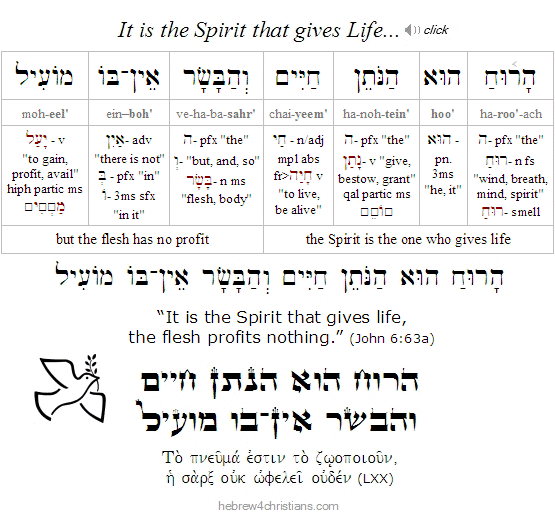 |
Testing and Endurance...

01.29.25 (Tevet 29, 5785) When the Apostle Paul wrote, "in everything give thanks, for this is the will of God" (1 Thess. 5:18), he surely foresaw the prospect of suffering. Indeed, it is through "much tribulation" we enter the kingdom of God (Acts 14:22). We do not ask God to insulate us from all troubles, but rather to be given courage to carry on despite whatever tests he permits in our lives. Hence one of our standard blessings is: בָּרוּךְ אַתָּה יהוה הַנּוֹתֵּן לַיָּעֵף כּחַ / barukh attah Adonai ha'noten lai'ya'ef koach: "Blessed are You, LORD, who gives strength to the weak." The Lord never "breaks" before offering His blessing (Mark 6:41), and personal brokenness is the means of instilling His character within us (Gal. 2:20). Indeed in the Torah we read: "I am the LORD your Healer" (אֲנִי יְהוָה רפְאֶךָ; Exod. 15:26). The sages comment that just as someone who wishes to repair an object will need to take it apart, so it is with God. When we seem to be broken in pieces we cry out for deliverance and healing, but inwardly we are being conformed to the deeper image of Messiah. Like Jacob, we wrestle with God to know our wound as well as our healing.
As it is written in our Scriptures: "So we do not lose heart. Though our outer self is wasting away (διαφθείρεται), our inner self is being renewed day by day. For this light momentary affliction (θλῖψις) is preparing for us an eternal weight of glory beyond all comparison, as we look not to the things that are seen but to the things that are unseen. For the things that are seen are transient, but the things that are unseen are eternal" (2 Cor. 4:16-19). As our Scriptures also affirm, God is "the Father of Mercies and God of all comfort" (אַב הָרַחֲמִים וֵאלהֵי כָּל־נֶחָמָה). The Lord "comforts us" (literally, "calls us to His side," παρακαλέω) in our afflictions so that we may be able to comfort those who are afflicted with the same comfort with which we ourselves are comforted by God (2 Cor. 1:3-4). Amen.
Hebrew Lesson
Psalm 29:11 Hebrew reading:
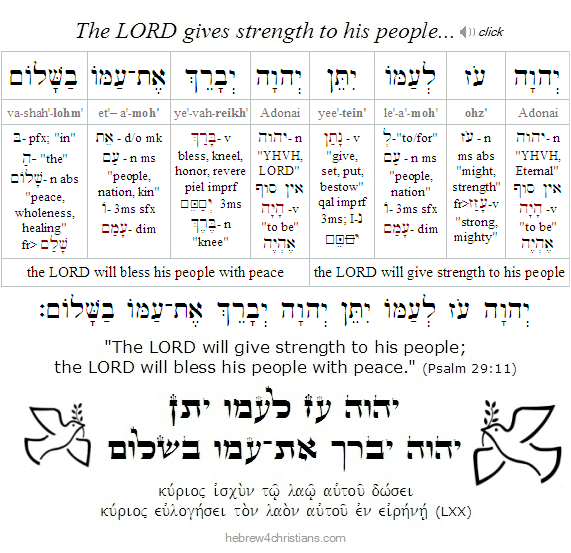 |
The Great Lamb of God...
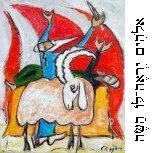
01.29.25 (Tevet 29, 5785) From our Torah portion this week (i.e., parashat Bo) we learn that though God instructed each household to select its own lamb for the Passover, the Torah refers to "the" Lamb of God, as if there was only one: "You shall keep it [i.e., the Passover lamb] until the fourteenth day of this month, when the whole assembly of the congregation of Israel shall slaughter him (אתוֹ) at twilight (Exod. 12:6).
Note that the direct object "him" (i.e., oto) in this verse can be read as Aleph-Tav (את) combined with the letter Vav (ו), signifying the Son of Man who is First (א) and Last (א)... Indeed there is only one "Lamb of God" that takes away the sins of the world, and that is our Savior, Yeshua the Messiah, blessed be His Name!
רָאוּי הַשֶּׂה הַטָּבוּחַ לְקַבֵּל גְבוּרָה
עשֶׁר וְחָכְמָה וְכּחַ וִיקַר וְכָבוֹד וּבְרָכָה
rah·oo'·ee · ha·seih · ha·tah·voo'·ach · le·ka·beil · ge·voo·rah
oh'·sher · ve·chokh·mah · ve·koh'·ach · vee·kar · ve·khah·vohd · oov·rah·kha

"Worthy is the Lamb who was slain, to receive power and wealth and wisdom
and might and honor and glory and blessing"
(Rev. 5:12)
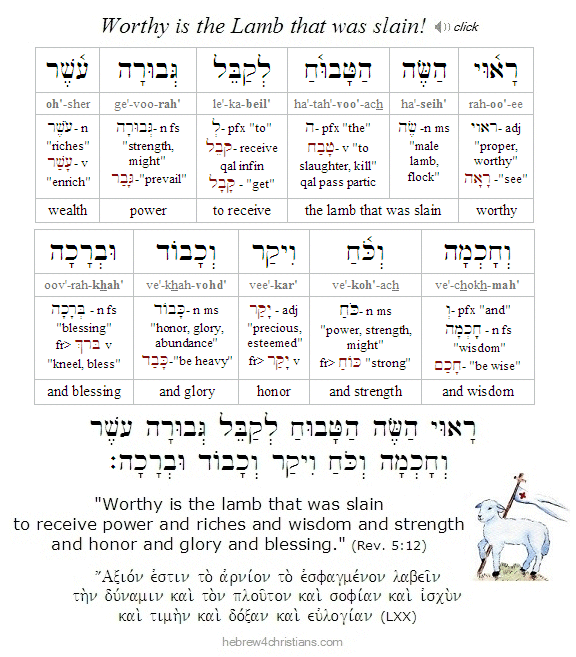
Finding the Way of Escape...
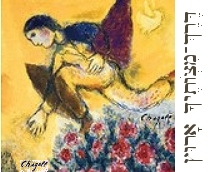
01.29.25 (Tevet 29, 5785) Where it is written, "God is faithful, and he will not let you be tempted beyond your ability, but with the temptation he will also provide the way of escape, that you may be able to endure it" (1 Cor. 10:13), we note that the Greek text says that God will actively "make with the temptation the way of escape" (ποιήσει σὺν τῷ πειρασμῷ καὶ τὴν ἔκβασιν) so that you may be able to bear it.... When I was younger, I thought of temptation as the appeal to gratify my flesh, to impulsively seek hedonistic pleasure, and so on, but now I understand "temptation" (πειρασμό) to encompass far more than just that.
For instance, whenever I regard my life in human or "natural" terms, apart from the consciousness of God's all-pervading and sustaining Presence, then I am surely under temptation. Fear, anger, despair, grumbling self-pity, and so on -- all are temptations to unbelief... This encouraging verse, then, assures us of the Divine Presence in every moment, at every turn of our journey, and in every circumstance. God is always present to help you as you turn to him in faith -- even when you are ashamed, fearful, or in dismay over your present circumstances.
The sages state in this regard: "God creates the cure before the plague," meaning that His love is the foundation of all things: עוֹלָם חֶסֶד יִבָּנֶה / olam chesed yibaneh: "steadfast love built the world" (Psalm 89:2). Just as God created mankind only after He created the pathway of repentance (i.e., the "Lamb slain from the foundation of the world": Eph. 1:4, Heb. 4:4, Rev 13:8), so the escape from temptation was likewise foreseen and provided. In all things, then, may we humble ourselves and seek God's face, understanding our radical dependence upon Him for our deliverance.
Hebrew Lesson
Psalm 37:23-24 reading (click):
When you become alive to the truth that the LORD is your "Rock" -- the very ground upon which you live, move, and have your being -- then your steps are made sure. When you are unsure of your way, however, when you walk in uncertainty, you are unsteady in your resolve and are tempted to regard your life as being without any solid foundation or direction.... As you commit your way to the LORD, your steps are made sure, for you are walking before his Presence, and therefore you are upheld by his power...
In all your struggle remember that salvation is found in the power and righteousness of God, and not your own will or resolve (Rom. 1:16). I'm so glad it's not the strength of my grip that keeps me holding on to God, but the strength of his...
The Focus of the Heart...
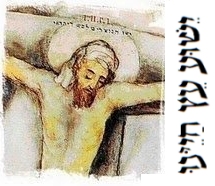
01.28.25 (Tevet 28, 5785) "I determined not to know any thing ... apart from Yeshua the Messiah and him crucified" (1 Cor. 2:2). This mode of "not knowing apart" bespeaks a radical intimacy that mediates and transforms all other thought within you. It is the axiom of spiritual existence, the matter of "first importance," the heart of everything: to know the healing love of Messiah and the power of his resurrection on your behalf (Phil. 3:10).
When you accept the Divine Presence in Yeshua, everything becomes simple, unified, and focused. Choosing to know everything "through" Yeshua moves you to the center of reality - where the present moment is lit up with the glorious light of the eternal... You begin to see past the distractions of this world - "for God is not in the earth, wind or fire" (1 Ki. 19:11-12) - beyond the ups and downs of your life, the hunger and thirst of your heart, past all your fears, desires, and sorrows, to hear the "still small voice" (i.e., kol demamah dakkah: קוֹל דְּמָמָה דַקָּה), to enter wonderful peace, the place of God (i.e., ha'makom: הַמָּקוֹם) which is your true home, the habitation of our all-loving Father who calls you by name...
"To all who overcome I will give a bright stone..." (Rev. 2:17). But what do you overcome if not unbelief, the fear that the miracle is not for you, the terror that you are not welcome in the most significant sense of reality? Many forfeit the highest for the sake of lesser things. We overcome despair by means of faith - by trusting in the One who gives us the victory (1 Cor. 15:57; 1 John 5:4-5). There is no "overcoming" apart from the love of God, who takes us up into his life and gives us his triumph over sin and death. Glory belongs to the Lord...
Hebrew Lesson
Psalm 104:31 Hebrew reading (click):
Anxiety and True Love...

01.28.25 (Tevet 28, 5785) It is written in our Scriptures: "Be anxious for nothing, but in everything by prayer and supplication, with thanksgiving, let your requests be made known to God; and the peace of God, that surpasses all understanding, shall guard your hearts and your thoughts in Yeshua the Savior" (Phil. 4:6-7).
"Be anxious for nothing..." What liberation of heart and soul is here commended; what consoling balm for wounded past; what divine remedy offered to meet our need! "Be anxious for nothing," and this includes the anxiety of being nothing, for the word is perhaps better (though less poetically) rendered as "don't be anxious for anything." That is, don't be troubled with cares; don't be inwardly divided, unsure of what matters most. "Be anxious for nothing." Don't allow anything to steal your secret hope and joy...
Salvation means deliverance from what binds you. It relieves you from heavy burdens, the crack of the whip upon your back, the tiresome realm of meaninglessness and monotony. Salvation is "lightness of being," heavenly repose that passes all "natural" reasoning.
This is the very message of peace embodied in our Lord, spoken plainly and without condition: "Come unto me, all you that labor and are heavy laden, and I will give you rest. Take my yoke upon you, and learn of me; for I am meek and lowly in heart: and ye shall find rest unto your souls." Come unto him and find your comfort. Come as you are, but come...
You might object by saying that you are unworthy; you are weak and wretched of heart, that your faith is small... Indeed it is so, but what of it? What are you saying before the face of God's Redeemer and our Savior? Could it be any other way for you?
"Come unto me all who that labor and are heavy laden..." Weary over you afflictions, the common sorrows in this vale of tears, yet, even more so weary of your own self, that tiresome inner conversation within yourself, the self you have contemned and reprimanded because you have measured yourself against illusion, the self that has at times betrayed you and even enticed you to self-destruction...
Do you compare yourself to others? Do you measure yourself against some ideal and judge yourself unfavorably? Do you recoil at your own mediocrity? Are you ashamed of your inadequacies? Do you want to be someone else? To "lose" yourself in the fantasy of being other than who you are? Or do seek above all to be in control? Do you push back in defiance, drink sour grapes, and become bitter over at your unjust fate? Do you protest that you were given a bad hand of cards? Are you in despair over your lack of perfection, your "dust and ashes" existence?
O "fearfully and wonderfully made," do you fear being invisible, unknown, small, insignificant, and unworthy? Are you embarrassed over your own image?
God is so awesome he made himself as nothing for your sake... Before the Lord we "fall at his feet as one dead," but it is he who lays his hand upon you, saying "Fear not; I am the first and the last." I hear profound pathos in these words of comfort from our Lord. Wisdom realizes we are but nothing, but love insists we are everything. A note for each pocket: one says "I am dust and ashes," the other, "For me the world was created."
Before God we will indeed feel our insignificance and our wretchedness, but before God we will also find our eternal value and beauty. We fall on our face in our nothingness; we rise to our feet as God's beloved child.... We fall at his feet as one dead -- this is our despair over ourselves -- yet the pierced hands of his love take hold of us, consoling us... "Don't be afraid... I am the First and I am the Last... I am the source and end of all that matters most; I reach out and touch you in love for you.
The first and most significant step is to "show up" (or to be taken up in a vision) to confess your great need for God. We may have "sanctified ambivalence" when we do so; we may feel both fear and desire; we may look upon ourselves in despair as we are drawn to God's glory and beauty... But like Ruth we dare to lay at the feet of Boaz in hope of his love.
Find God or die. And even if you have failed as much as "seventy times seven times" in your faith, and even if - as Peter did - you have denied him in your heart, you have found courage to come back, to refuse to give up your hope. As the holy Scripture encourages: "Lord, to whom shall we go? you alone have the words of eternal life." There is no other...
When you die and come before God's glorious presence, the Lord will not compare you to Moses or the great prophets but will simply require you to confess who you really are. "Your heavenly Father sees in secret and will reward you openly." True, there is judgment but it will turn on whether you have accepted God's love for your life. You may have squandered some opportunities to serve and honor God, but even that is redeemed by our gracious and compassionate Savior. God is able to work "all things together" for his glory and for your good... Confessing the truth of God's salvation is the heart of right judgment.
So accept yourself as accepted in the beloved. Your life is not an accident; it's not a mistake; you were meant to be born and to come into this world. Your life really does matter, and it matters on levels of which you cannot yet comprehend. God has a purpose and deep reason for your life, exactly and such as it is (Jer. 29:11). Trust that God's love is overcoming all your darkness and fear. "Be anxious for nothing..." Amen.
Hebrew Lesson
Psalm 139:14 reading (click):
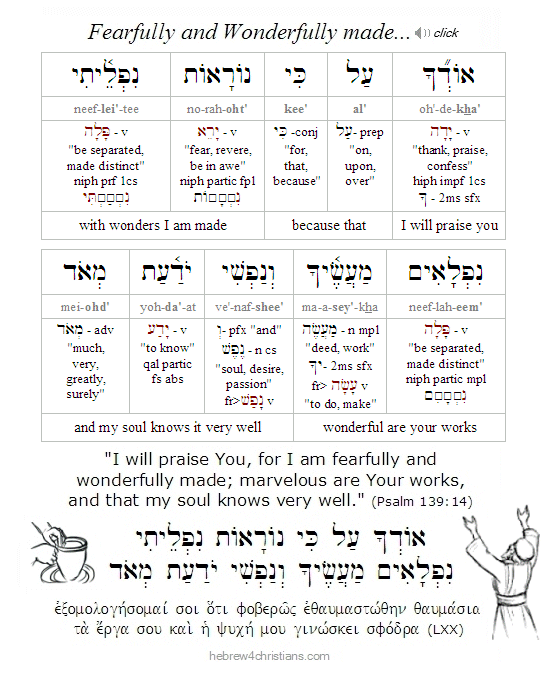 |
The Exodus Parable...
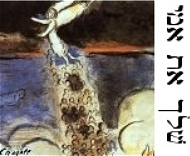
"And beginning at Moses and all the Prophets, He expounded to them in all the Scriptures the things concerning Himself" (Luke 24:27). "Now these things happened as an example, but they were written down for our instruction, on whom the end of the age has come" (1 Cor. 10:11).
01.27.25 (Tevet 27, 5785) The great Exodus of Israel from Egypt (יציאת מצרים) is the central parable of the Torah, and indeed of the entire Bible itself. It provides a picture of our salvation given in our Messiah Yeshua. The bondage of the Israelites to Pharaoh represents humanity's slavery to sin; redemption from this bondage is effected by trusting in the blood of the sacrificial lamb of God; deliverance from death to life is depicted through baptism into the Sea of Reeds; the journey to truth represents the pilgrimage to Sinai, and so on.
It is important to see that the great redemption in Egypt led directly to revelation given at Sinai exactly 49 days later, and when the LORD God there gave his people the Ten Commandments, he did not begin by saying he was their Creator, but rather their Redeemer: "I am the LORD your God (אָנכִי יְהוָה אֱלהֶיךָ), who brought you out of the land of Egypt, out of the house of slavery" (Exod. 20:2). This is because the purpose of the creation itself is to demonstrate God's redemptive love and to be known as our Savior and Redeemer, just as Yeshua is the "Lamb slain from the foundation of the world" (Rev. 13:8; 1 Pet. 1:18-20; Eph. 1:4; 2 Tim. 1:9). "All things were created by Him (i.e., Yeshua), and for Him" and in Him all things consist (συνεστηκεν, lit. "stick together") (Col. 1:16-17).
Creation therefore begins and ends with the redemptive love of God as manifested in the Person of Yeshua our Mashiach, the great Lamb of God and our Savior... He is the Center of Creation - the Aleph and Tav - the Beginning and the End (Isa. 44:6; Rev. 1:8). All the world was created for the Messiah: "For from him and through him and to him are all things. To him be glory forever. Amen" (Rom. 11:36).
Hebrew Lesson
Isa. 44:6b reading (click):
Tears in His Bottle...

01.27.25 (Shevat 27, 5785) "Godly sorrow works teshuvah (repentance) unto salvation" (2 Cor. 7:10). This deep sorrow is more than just sadness or regret over some sin or wrongdoing of your past. Genuine godly sorrow expresses inner poverty - being "poor in spirit" - wherein the heart realizes that sin is not something "out of character," as if it did not really come from you, but rather that it is a dreadful sickness of your own soul, an inner power or corrupting force from which you need divine intervention and deliverance (Jer. 17:9). We are not sinners because we sin; we sin because we are sinners...
The Puritans prayed for the "gift of tears" by which they meant the healing virtue of experiencing genuine repentance before God. They asked God for help because doing teshuvah - really doing it as opposed to just thinking you did - requires a miracle, a profound change of direction, a new way of seeing. In general our lives are a tangled web of deceit, self-deception, ignorance, folly, and so on, and when we are confronted with a particular sin, we are quick to rationalize and even deny our responsibility. Jean Paul Sartre would call this mauvaise foi, or "bad faith," that is, the habit of denying that our actions have real consequences for which we alone must bear. Often it takes many years to truly understand the depth of our inner corruption, the sickness of our souls, the way we deceive ourselves and make excuses for the sorrows and pains we have caused others and ourselves.
So how long has it been since you have wept over your sinful condition? Not how long has it been since you have revisited some regret from your past - but how long has it been since you have "collapsed in on yourself," confessing the horror and revulsion over your forlorn and desperate soul? Do you feel in your bones the awfulness of your sinful life? Or are you quick to make excuses for your wretchedness? Do you find fault in others to justify your own hardness of heart? Do you harbor secret resentment enabling you to hold on to your sickness? These are "worldly sorrows" that work death (2 Cor. 7:10). We may give lip service that we are sinners, but do we feel the grief and weight of our sin? Do we abhor ourselves and repent in dust and ashes? (Job 42:6). Dear friend, how can God wipe away every tear from our eyes in the next world if we have not wept in this one?
On the other side of our confession of brokenness we discover that God consoles us for the wounds we suffer in this life. It is written in our Scriptures: "You have kept count of my miseries; store my tears in your bottle. Are they not in your book?" (Psalm 56:8). The LORD "numbers" or "recounts" the heartaches and wanderings of your life; He keeps an account or a record of your trouble in His "scroll of remembrance" (Mal. 3:16). God does not overlook the anguish of your heart but carefully numbers each of your tears, storing them "in His flask," which may allude to the ancient custom of putting tears shed for the death of someone into a small container (i.e., "tear bottles"). The picture is one of profound intimacy and comfort, when in the world to come the LORD will personally console you for your sorrows. Not one pain of your life will be overlooked by heaven.
May our hearts be both softened and full of conviction as we ponder these things. Amen.
Hebrew Lesson
Psalm 56:8 Hebrew reading (click):
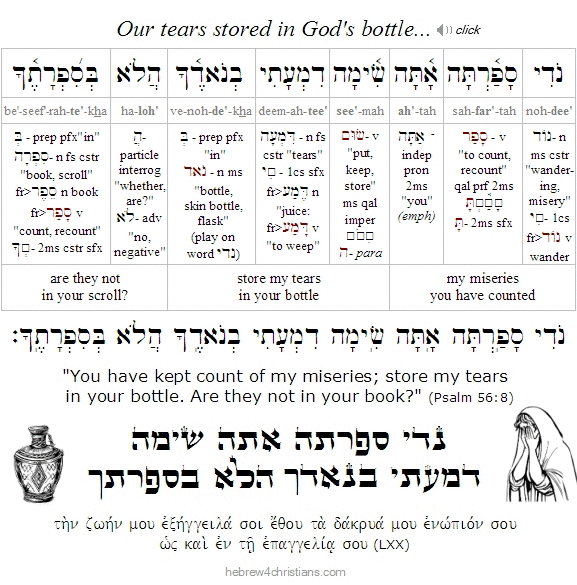 |
Should we live in fear of ourselves? After all, "the heart is deceptive above all things and desperately wicked" (Jer. 17:9), and it is woefully easy to fool ourselves regarding our sins (1 Cor. 8:2; Gal. 6:3; James 1:26). Well on the one hand we should indeed be afraid of our own sinful condition and abhor the sin in our lives, but on the other we must practice hope in God and trust in his healing and deliverance. Moreover, we can experience freedom from dread by receiving the joy that comes from the assurance that we are accepted in the Beloved. We must understand our sin in relationship to the wounds of the Savior, since without that connection, our repentance will be vain indeed.... God has not given us a spirit of slavery to fall back into fear; and there is no fear in His love (Rom. 8:15; 2 Tim. 1:7; 1 John 4:18). Of course we all will fail the test apart from the grace and love of God, and no one can be approved by means of the unaided will. We all need a miracle from God to love Him in the truth and to pass the test -- but God is the One who performs miracles for us. The LORD is Adonai Nissi (יהוה נִסִּי), the God of my miracle...
Providential Impediments...

"No faith is so precious as that which lives and triumphs through adversity. You would never have believed your own weakness had you not needed to pass through trials. And you would never have known God's strength had His strength not been needed to carry you through." - Charles Haddon Spurgeon
01.27.25 (Tevet 27, 5785) The midrash says Moses had a speech impediment, and that is why he described himself as "heavy of mouth and of tongue" (כְּבַד־פֶּה וּכְבַד לָשׁוֹן), unfit to speak on behalf of God (Exod. 4:10). God reassured him, however, by reminding him that his limitation was by divine providence: "Who has made man's mouth? Who makes him mute, or deaf, or seeing, or blind? Is it not I, the LORD? Now therefore go, and I will be with your mouth and teach you what you shall speak" (Exod. 4:11-12).
The sages comment that God did not cure Moses of his stuttering because He wanted the Israelites to know Moses as his chosen messenger. When he spoke in the Name of the LORD, the stuttering disappeared and Moses spoke with fluent ease. This was to teach the people not to trust in human oratory or wisdom, but rather in the power of God (see 1 Cor. 2:1-5). Just as Paul, the "Moses of the New Covenant," was given a "thorn in the flesh" (σκόλοψ τῇ σαρκί) to keep him humbly relying upon God for his sufficiency to serve (2 Cor. 12:7-10), so Moses was rendered entirely dependent upon the LORD to speak as his mediator.
But he said to me, "My grace is enough for you" (i.e., dai lekha chasdi: דַּי לךָ חַסְדִּי), "for My power is made perfect in weakness" (i.e., ki ba'chulshah tushlam gevurati: כִּי בַּחֻלְשָׁה תֻּשְׁלַם גְּבוּרָתִי). Therefore I will boast most gladly of my weaknesses, that the power of Messiah may tabernacle (ἐπισκηνόω) within me (2 Cor. 12:9).
Hebrew Lesson
Isaiah 40:29 commentary (click):
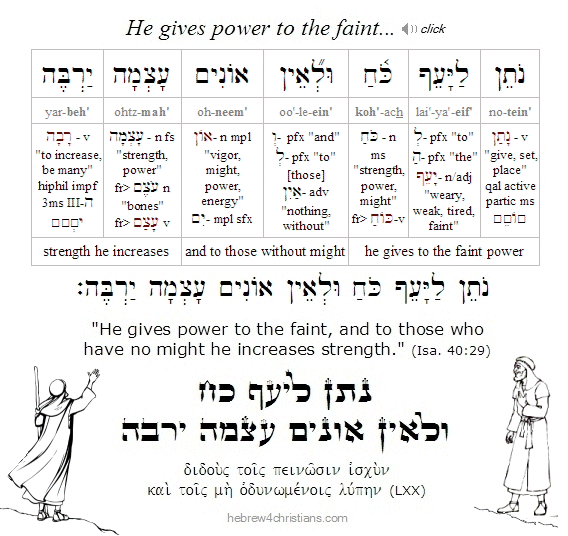 |
Exodus and the Lamb...
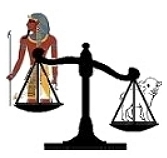
This week we think about the great Passover prophecy and the subsequent exodus from Egypt, and how that revealed truth about the "greater Exodus" that was given by Yeshua (Luke 9:29-31). Moreover the Exodus judgments against Pharaoh foretell of the coming "End of Days" when God's judgments will befall the "Pharaoh" ("man of sin," or Antichrist) on a global scale...
01.26.25 (Tevet 26, 5785) Shalom dear friends... Our Torah reading for this week (i.e., Exod. 10:1-13:16) begins with God commanding Moses "to go" (i.e., bo: בּא) before the Pharaoh to announce further apocalyptic judgments upon Egypt. The purpose of this power encounter was to vindicate God's justice and great glory (deliverance/salvation) by overthrowing the tyranny of unjust human oppression. Pharaoh's nightmare of "one little lamb" outweighing all the firstborn of Egypt was about to be fulfilled....
Hebrew Lesson
Exodus 10:1 Hebrew reading (click):
Recall that last week's Torah (i.e., parashat Va'era) retold how Pharaoh defiantly refused to listen to Moses' pleas for Israel's freedom, despite seven devastating makkot (plagues) that came upon Egypt in God's Name (יהוה). In this week's portion (i.e., parashat Bo), the battle between the LORD and Pharaoh comes to a dramatic conclusion. The last three of the ten plagues are unleashed upon Egypt: a swarm of locusts devoured all the crops and greenery; a palpable darkness enveloped the land for three days and nights; and all the firstborn of Egypt were killed precisely at the stroke of midnight of the 15th of the month of Nisan... In this connection note that the word בּא ("go") and פרעה ("Pharoah") added together equal the gematria of משׁיח ("mashiach"), providing a hint of the Messianic redemption that was foreshadowed in Egypt. Every jot and tittle, chaverim!
Before the final plague, God instructed the Jewish people to establish a new calendar based on the sighting of the new moon of spring. On the tenth day of that month, God told the people to acquire a "Passover offering" to Him, namely an unblemished lamb (or goat), one for each household. On the 14th of that month ("between the evenings") the animal would be slaughtered and its blood sprinkled on the doorposts and lintel of every Israelite home, so that God would "pass over" these dwellings when He came to kill the Egyptian firstborn that night. The roasted meat of the offering was to be eaten that night with unleavened bread (matzah) and bitter herbs (maror). God then commanded the Israelites to observe a seven-day "festival of matzah" to commemorate the Exodus for all subsequent generations.
Because of this, our corporate identity begins with a shared consciousness of time from a Divine perspective. The mo'edim (festivals of the LORD) all are reckoned based on the sacred calendar given to the redeemed Israelite nation. As it is also written in the Book of Psalms: "He made the moon for the appointed times" / עָשָׂה יָרֵחַ לְמוֹעֲדִים (Psalm 104:19). Undoubtedly Yeshua followed this calendar, as did His first followers (Gal. 4:4).
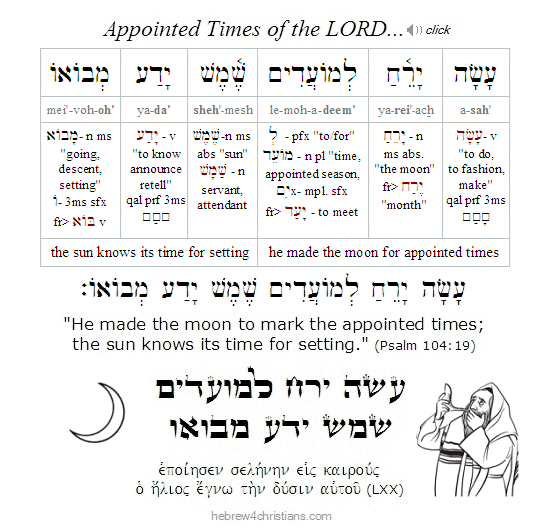 |
Just before the dreadful final plague befell, God instructed the Israelites to ask their Egyptian neighbors for gold, silver and jewelry, thereby plundering Egypt of its wealth (this was regarded as "uncollected wages" for hundreds of years of forced labor and bondage - not to mention for the services of Joseph, whose ingenuity brought the world's wealth to Egypt in the first place). Moses then instructed the people to prepare the Passover sacrifice, that is, the korban Pesach (קָרְבָּן פֶּסַה) - the Passover lamb - and to smear its blood on the two sides and top of the doorway, resembling the shape of the Hebrew letter Chet (ח). This Hebrew letter, signifying the number eight, is connected with the word חי (chai), short for chayim (חַיִּים), "life." The blood of the lamb (דַּם הַשֶּׂה) not only saves from the judgment of death, but also is a symbol of divine life given for our redemption. The "life is in the blood."
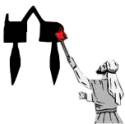
The dreadful final plague - the death of the firstborn - at last broke Pharaoh's resistance and he not only allowed the Israelites to depart without any conditions, he urged them to go. Because they left in great haste there was no time for their dough to rise. The Torah states that there were 600,000 adult men who left Egypt, along with the women, children, and a "mixed multitude" of other Egyptian slaves who tagged along.
The Israelites were commanded to consecrate all the firstborn to God and to commemorate the anniversary of the Exodus each year by celebrating the LORD's Passover in conjunction with the Feast of Unleavened Bread. During this time they were to remove all leaven from their homes for seven days, eat matzah, and retell the story of their redemption to their children. The portion ends with the commandment to wear tefillin (phylacteries) on the arm and head as a reminder of how the LORD saved the Israelites from their bondage in Egypt.
Centrality of the Exodus...
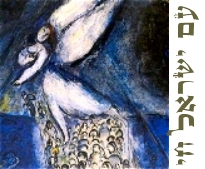
This week we are re-reading the story of the exodus for the current Jewish year...
01.24.25 (Tevet 24, 5785) The exodus from Egypt (i.e., metziat mitzrayim: יציאת מצרים) is perhaps the most fundamental event of Jewish history; it is "the" miracle of the Torah. In addition to being commemorated every year during Passover (Exod. 12:24-27; Num. 9:2-3; Deut. 16:1), it is explicitly mentioned in the first of the Ten Commandments (Exod. 20:2), and it is recalled every Sabbath (Deut. 5:12-15). The festivals of Shavuot (Pentecost) and Sukkot (Tabernacles) likewise derive from it (the former recalling the giving of the Torah at Sinai and the latter recalling God's care as the Exodus generation journeyed from Egypt to the Promised Land), as does the Season of Teshuvah (repentance) that culminates in Yom Kippur (the Day of Atonement). Indeed, nearly every commandment of the Torah (including the laws of the Tabernacle and the sacrificial system) may be traced back to the great story of the Exodus, and in some ways, the entire Bible is an extended interpretation of its significance. Most important of all, the Exodus both prefigures and exemplifies the work of redemption given through the sacrificial life of Yeshua the Messiah, the true King of the Jews and the blessed Lamb of God...
The deeper meaning of exile concerns blindness of the divine presence. The worst kind of exile is not to know that you are lost, away from home, in need of redemption... That is why Egypt (i.e., Mitzraim) is called metzar yam - a "narrow strait." Egypt represents bondage and death in this world, and the exodus represents salvation and freedom. God splits the sea and we cross over from death to life. Since Torah represents awareness of God's truth, Israel was led into a place of difficulty to learn and receive revelation (Gen. 46:1-7). Out of the depths of darkness God's voice would call his people forth. Likewise we understand our "blessed fault," the trouble that moves us to cry out for God's miracle in Yeshua... Indeed the New Testament states that Yeshua "appeared in glory and spoke of his exodus (τὴν ἔξοδον αὐτου) which he would accomplish at Jerusalem" (Luke 9:31).
Shabbat Shalom and thank you for your prayers and support that keep me going over here. Peace and love be with you in our beloved Moshia Yeshua.
Hebrew Lesson
Psalm 81:10a reading (click to listen):
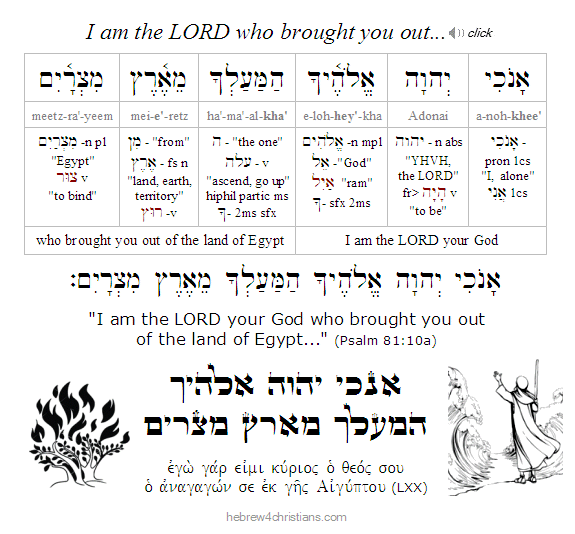 |
The Shortest Prayer...
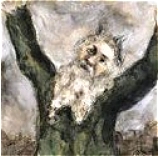
01.24.25 (Tevet 24, 5785) Sometimes the shortest prayers are the best, since God is not impressed with human loquacity or religious talk (Prov. 10:19). Besides, your Heavenly Father knows what you need before you even ask Him, so you neither need to explain things to Him nor resort to flattering appeals or vain repetitions (Matt. 6:7-8).
The shortest prayer in the Torah is only five words long: El na refa na lah (אֵל נָא רְפָא נָא לָהּ), "God please heal her please," spoken by Moses on behalf of his sister Miriam who became metzora (Num. 12:13). Other good prayers are simply "Help Lord," "Thank you, Lord," and "Yes, Lord." What matters in prayer is the earnestness of heart, not the use of fine words. There is no "shibboleth" or "password" required to open the gates of heaven, just as there is no special name for God that must be invoked. The LORD sees beyond our words and heeds the passion of heart that cries out to Him in sincerity... God is likened to a good father who hears his child crying for his or her daddy.
This reminds me of a joke I once read. One Chanukah a rabbi arrived at shul but was surprised to see only one person, an elderly Jewish farmer, who came to the service. "Should I proceed?" asked the rabbi, and the farmer replied: "Sure, why not?" The rabbi then asked, "Well, it is worth having a service for such a small congregation?" The old farmer responded: "Let me tell you, Rabbi, that when I take a bucket of food to the hens, and only one turns up, I don't send it away hungry..." The rabbi, moved by this simply analogy, then went up to the bema and proceeded to lead the single Jew through the entire morning service, including a long and very forceful sermon on Chanukah, its history and tradition, and carefully reviewed the laws of lighting the menorah.
When he finally finished, he turned to the farmer and asked:"Was that all right?" "You know rabbi," the farmer dourly replied, "when I take a bucket to the hens and only one turns up, I don't give it the whole bucket!"
The Scriptures teach, "When words are many, transgression is not lacking, but whoever restrains his lips is prudent" (Prov. 10:19). However, the Scriptures also teach that "a word fitly spoken is like apples of gold in a setting of silver" (Prov. 25:11). When we speak with others, it is wise to search for just the right words spoken with the just right tone at just the right time. May God give us all wisdom. Shalom, chaverim.
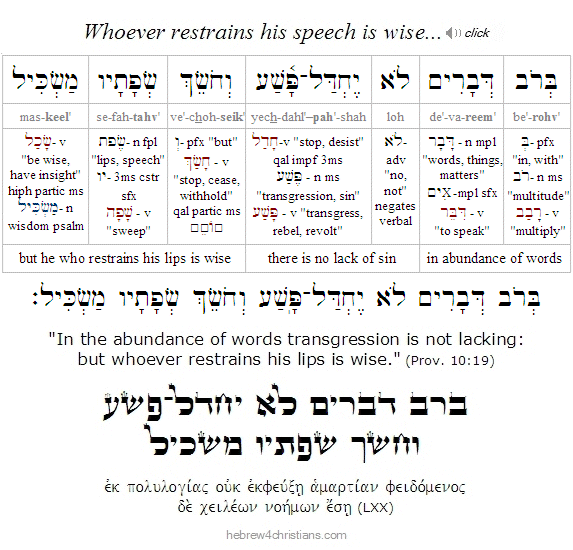 |
Praise in Lamentation...
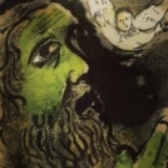
01.24.25 (Tevet 24, 5785) What if we were to come to such brokenness of heart that there would be nothing left to say, nothing but an inward groaning or roar that renders naught our every word, leaving us in muted sorrow, perplexity, sickness of heart, and fear... Will not our silence be heard?
We need to trust God in our darkness and with our darkness, and by that I mean that we need to believe that the Sovereign Lord is allowing trouble for our ultimate good, despite our inexplicable losses, our grief, our sorrow and our pain. It takes great faith to trust God in our anguish, to offer our pain in praise.
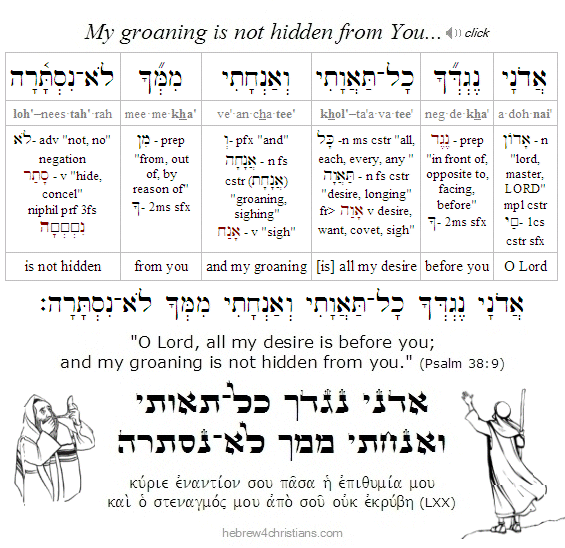 |
God understands the ache of your heart: "O Lord, all my desire is before you; my groaning is not hidden from you" (Psalm 38:9). Be encouraged: If you ask for bread, your Heavenly Father will not give you a stone. God will help us, and he will help us before we even know that he is helping us! Therefore do not be anxious, and do not fear, for "your heavenly Father knows what you need before you ask Him." God will make everything new, in the name and for the sake of his great love...
The word was given for our upbuilding and edification: "Let him who walks in darkness and has no light trust in the Name of the LORD (יִבְטַח בְּשֵׁם יְהוָה) and rely on his God" (Isa. 50:10). Trusting in God (i.e., bittachon - בִּטָּחוֹן) does not mean that we are obligated to affirm that this is "the best of all possible worlds," though it does mean we believe that eventually God will wipe away every tear and make all things right.. O Lord, make everything new, revive the hurting, in the name and for the sake of thy love, Amen...
"So it was, while they conversed and reasoned, that Yeshua himself drew near and went with them. But their eyes were held back so that they did not recognize Him. Then said to them, 'What kind of conversation is this that you have with one another as you walk and are sad?'" (Luke 24:15-17). Note that when the disciples were confused and distraught, Yeshua drew near to them in their anxiety and sadness... It was only later, after he took bread, blessed it, broke it, and then gave it to them were their eyes open, and they rejoiced in the truth of God. The brachah (blessing) was the signature statement of our Lord regarding his role as the Lamb of God. The entire account reminds me somewhat of John 21:3-13.
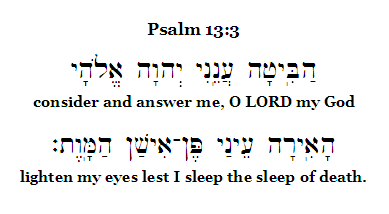 |
Knowing His Name...
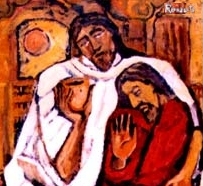
01.23.25 (Tevet 23, 5785) From our Torah this week (Va'era) we read that God said to Moses: "I appeared (וָאֵרָא) to Abraham, Isaac, and Jacob as El Shaddai (אֵל שַׁדָּי), but by my name the LORD (יהוה) I did not make myself known to them" (Exod. 6:3). Here we are faced with a puzzle, since the Torah clearly states that God revealed Himself as the LORD YHVH to the patriarchs. For example, to Abraham God said, "I am the LORD (אֲנִי יְהוָה) who brought you out of Ur of Kasdim" (Gen. 15:7), and to Jacob he said: "I am the LORD (אֲנִי יְהוָה), the God of Abraham your father and the God of Isaac (Gen. 28:13). In light of this, how then do we make sense of God's statement that He was not known as YHVH to the patriarchs?
The traditional explanation is that God was stating that the patriarchs had not directly experienced His mastery over creation through the signs and wonders He would perform as Israel's Savior and Redeemer. The patriarchs understood God as El Shaddai (אֵל שַׁדַּי), the all-sufficient One who nurtured the fledgling nation and who foretold Israel's future (Gen. 17:1-2; 28:3; 35:11), but Moses (and the Israelites) would now come to know God's attributes of covenantal faithfulness (chesed) as the "Promise Keeper" by directly witnessing his saving acts. Indeed, the Name YHVH implies that God is the Faithful One, since the name is formed by permutating the letters of the Hebrew root "to be": hayah (was), hoveh (is), and yihey (will be), which implies there is no power that can prevent God from fulfilling His promises. YHVH is Lord of lords and King of kings whose word can never fail (Deut. 10:17; Dan. 2:47). Ein od milvado (אֵין עוֹד מִלְבַדּו): "there is no truth apart from Him" (Deut. 4:35,9).
The name "ehyeh asher ehyeh" (אֶהְיֶה אֲשֶׁר אֶהְיֶה) means "I shall be as I shall be," that is, "I shall be with those who desire that I shall be with them. I reveal myself to those who seek for me, and as I am sought, so I will be found. According to your faith be it done unto you: Blessed are they that hunger and thirst for righteousness, for they shall be filled..."
Note that the question of the Name of God is raised both in last week's Torah portion (Shemot), where Moses asked God's Name to validate his mission to Israel, and again in this week's portion (Va'era), where God made the puzzling statement that the patriarchs did not know his Name as YHVH (יהוה). The entire question of God's name resolves to be a question about our ability to understand the very heart of God more than anything else (it's a matter of Who, not What). This is demonstrated by the fact that the name YHVH (יהוה) was revealed yet again to Israel after the dreadful sin of the Golden Calf, when Moses learned that it meant Compassion, Grace, and Love (see Exod. 34:6-7). This second revelation of the Name foreshadowed the promised New Covenant to come. Indeed the full meaning of God's name was revealed in the last gasp of Yeshua as He died upon the cross for our atonement, when he breathed out the great exhalation of all that he came to be for us... (Mark 15:37).
Hebrew Lesson
Psalm 9:10 podcast (click to listen):
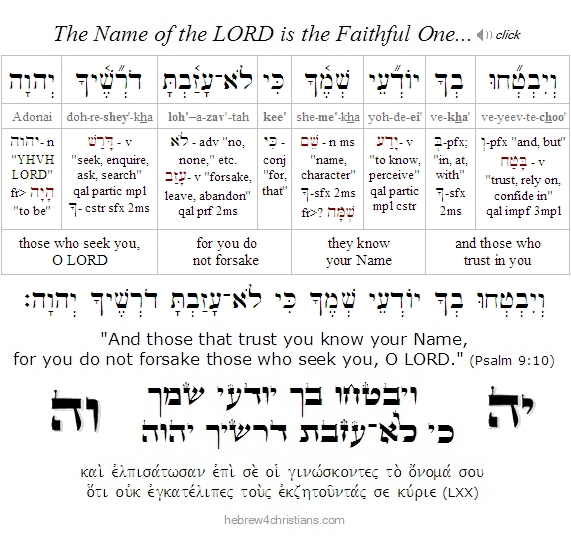 |
For more on this subject, see the article: Yeshua and YHVH.
Awakening to Redemption...

The following is related to our Torah reading for this week, Parashat Va'era...
01.23.25 (Tevet 23, 5785) The Divine promise was "I will bring you out (וְהוֹצֵאתִי) from under the burdens of Egypt" (Exod. 6:6), though later the people "romanticized" their captivity and wanted to return there to eat their "free fish" (Num. 11:5). The sages note the word "burdens" (i.e., sivloht: סִבְלת) can also mean "tolerance" (the related word savlanut, סַבְלָנוּת, means "patience" or "tolerance") which suggests that the people had tolerated their enslavement and made it "work" for them... Despite the hardship of their slavery, the Israelites rationalized their condition as being "normal" or acceptable.
There is no worse slavery than to be enslaved to your own heart and mind, to believe that you cannot escape or are not worthy to be redeemed. Is this not one of the devices of Satan - to blind our hearts to the truth of God's love for us? The "bringing out" (יְצִיאָה) of the LORD is therefore something more than the physical escape from the shackles of the body, but instead involves freedom (חֵרוּת) from the shackles of the mind. The most severe form of slavery is to not understand that you are slave, that is, to be asleep, full of vanity and illustion, as you imprison your own heart in the hopelessness of fate.
And are we not likewise at risk to be enslaved by the various comforts and deceptions offered up by this world and its principalities? Have we not likewise tolerated our own slavery -- our addictions to comfort, pleasures, a life of worldly propaganda and "free fish"? Are we really ready to leave all that behind to experience the glory of Zion? People may profess that they want to know God, that they "hunger and thirst for righteousness" and earnestly desire that the kingdom of heaven be manifest, and yet they can't get away from their favorite television shows, super bowls, political intrigues, pop idols, and other the fads of the day... We must be careful not to become comfortable in our exile – to become "friends of this world" – by losing faith's voice of protest; we must be careful not to be distracted from beholding spiritual reality and the ultimate healing to come. We are away from home, friends! When the hour comes and we hear "gemar ha'tikkun" – the great "it is finished" sound of the shofar summoning us all to follow Yeshua to the Holy Land -- will we be ready to leave everything behind?
The story is told by Abraham Twerski how Rabbi Nachum of Chernobyl once stayed at an inn, and as was his custom, he arose at midnight to recite lamentations over the destruction of the Temple and the exile of the people... The innkeeper, hearing his wailing, arose to see what the trouble was, and could not understand why the rabbi was sitting on the ground, mourning and praying... Nachum explained that we continually mourn the loss of our land and our exile, and that we cry out to God to hasten the ultimate redemption, when Mashiach will take us out of exile and lead us back to Jerusalem, our beloved Zion....
The innkeeper asked, "Will we all go to Jerusalem?" "Of course," Rabbi Nachum said. "But what will become of my little farm, my cows and chickens?" the innkeeper asked. "What account are these compared to our being in exile? Nachum replied. "We are repeatedly attacked by the Tartars, they carry out pogroms, killing and pillaging our people! In Jerusalem we will be free of such persecutions!"
The innkeeper was still not satisfied. "I must talk to my wife about this," he said. When he later told his wife what Rabbi Nachum said about the redemption by Mashiach, she said, "And how can we leave our farm and the cows and chickens that we worked so hard to get?" The innkeeper then explained how we would be free of the pogroms and persecutions of the bands of Tartars. The wife thought a bit and then said, "Go tell the rabbi that when Mashiach comes, he should take the Tartars to Jerusalem, and we can live here in peace."
There is hope, however, for all of us to be redeemed. Later in our Torah reading God said to Pharaoh, "I will bring about redemption (i.e., pedut: פְדֻת) between my people and your people (Exod. 8:23). The sages note that the word redemption (i.e., pedut) occurs three time in the Scriptures, explaining three types of exile. The first concerns the redemption from Egypt (יציאת מצרים), as mentioned above; the second refers to the remnant (שְׁאֵרִית) of the Jewish people redeemed in the days of Messiah: "He will send redemption to his people" (Psalm 111:9); and the third refers to the ultimate deliverance of the individual soul's bondage to his lower nature and evil characteristics. This is the "abundant" redemption mentioned in Psalm 130 - "for with the LORD there is the mercy, and with him is abundant redemption." This is the redemption that corresponds to the "abundant" life given in Yeshua our Messiah (John 10:10).
Hebrew Lesson
Psalm 130:7b reading (click for audio):
The "Torah" of Pharaoh...
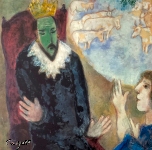
The passions grafted on wounded pride are the most inveterate; they are green and vigorous in old age. - George Santayana
01.23.25 (Tevet 23, 5785) Though he sometimes appeared to change his mind in light of the revelation of God, Pharaoh nevertheless reverted to his older thinking after the crisis seemed to pass. Therefore the Torah states that after each of the first five plagues, Pharaoh hardened (lit., "strengthened") his heart. It was only after five successive opportunities to face reality, to renounce his claim to be god, and to turn to the LORD in humility, however, that God ratified Pharaoh's will by "helping him" become the person he decided to be. Therefore after the sixth plague we read, ve'chazek Adonai et-lev paroh: וַיְחַזֵּק יְהוָה אֶת־לֵב פַּרְעֹה - "And the LORD strengthened Pharaoh's heart" (Exod. 9:12).
"The Torah of Pharaoh" (התורה של פרעה) teaches us that God will never force a sinner to turn away from their sin, but if they willfully continue to sin, they may eventually become unable to turn, trapped in a very difficult place.... The Shemot Rabbah states: "The Holy One, blessed be He, gives someone a chance to repent, and not only one opportunity but several chances: once, twice, three times. But then, if the person still has not repented, God locks the person's heart altogether, cutting off the possibility of repentance in the future." There is a very real risk that those who choose to be at war with God, who flatly refuse repeated appeals to turn to the LORD, will become progressively "strengthened" in their resolution to defy reality... And that, friends, is the "Torah" that Pharaoh teaches....
There are midrashim that Pharaoh eventually did repent, after seeing the destruction of his armies in the sea, so there is still hope for the most hardened of heart, but alas....
Hebrew Lesson
Psalm 95:8 reading (click):
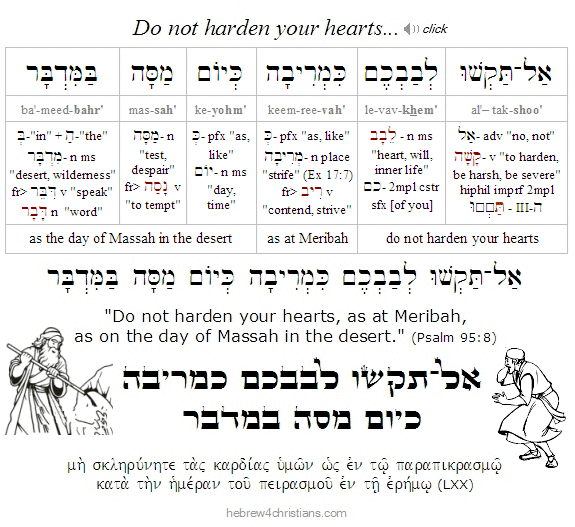 |
The tragic story of Pharaoh reminds us how pride can blind the heart. As Abraham Heschel said, "In a controversy, the instant we feel anger, we have already ceased striving for truth and have begun striving for ourselves." The truth needs no defense. If we find ourselves getting defensive or hostile, we need to take a step back and ask ourselves what we really believe... If we seek to use truth as a weapon, or as a means to rationalize our self-will, then we are not "in the truth," even if our facts in the matter may be correct. We must be careful not to find ourselves using the truth for our own agenda. Yeshua's words haunt the heart: "Without me you can do nothing" (John 15:5).
Kierkegaard notes: "The proud person always wants to do the right thing, the great thing. But because he wants to do it in his own strength, he is fighting not with man, but with God." Indeed, how many people seek visions, dreams, and private prophecies while they forsake the Spirit as it broods over the hearts of those around him or her? How many seek to "know God" as a matter of the pride of heart?
The Koretzer Rebbe was asked for instruction how to avoid sin. He replied, "Were you able to avoid offences, I fear you would fall into a still greater sin - that of pride" (Hasidic). The antidote to pride is the "fall of the soul," that is, those besetting sins and painful failures that (hopefully) bring us back to reality - namely, to the place of brokenness and our need for divine intervention... When we get "sick of our sickness" we enter into holy despair, and then the cry of the heart for lasting deliverance can be truly offered.
Hebrew Lesson
Proverbs 16:18 reading (click for audio):
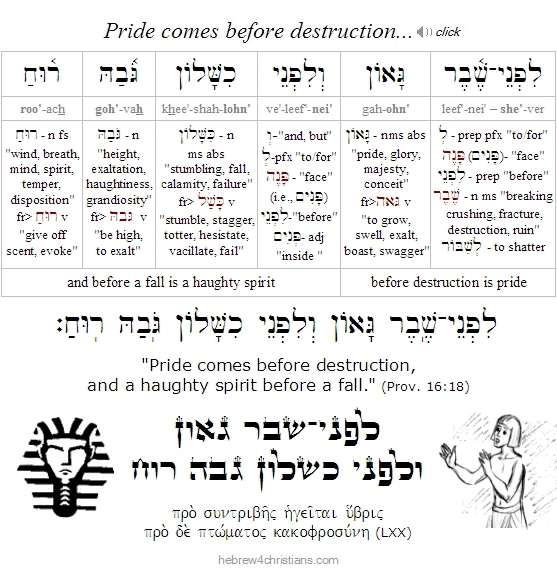 |
Note that the warning of Pharaoh's tragedy is not just for those who defy faith in the LORD God of Israel, for the New Testament warns God's redeemed children not to harden their hearts through unbelief as well:
"For who, having heard, rebelled? Indeed, was it not all who came out of Egypt, led by Moses? And with whom was he provoked for forty years? Was it not with those who sinned, whose bodies fell in the desert? and to whom did he swear that they would not enter his rest, but to those who were disobedient? So we see that they were unable to enter because of unbelief. Therefore, while the promise of entering his rest still stands, let us fear lest any of you should seem to have failed to reach it. For good news came to us just as to them, but the message they heard did not benefit them, because they were not united by faith with those who listened." (Heb. 3:16-4:2)
Amen. Faith is the essence of obedience. "And this is one of the most crucial definitions for the whole of Christianity; that the opposite of sin is not virtue but faith." (Kierkegaard)
Slavery of Passivity...
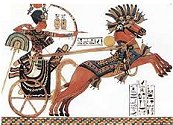
01.23.25 (Tevet 23, 5785) From our Torah portion this week (Va'era) we read, "I will bring you out from under the burdens of the Egyptians" (Exod. 6:6). The sages say the Hebrew word for "burdens" (סִבְלת) can also be read as passivity (סְבִילוּת): "I will deliver you from passivity toward your slavery...." So long as the people regarded their enslavement as tolerable, they could excuse it, rationalize it, and even defend it. Therefore God allowed tribulation to progressively increase so that the people would understand their need.
Likewise we cannot even begin to understand our need for deliverance as long as we are comfortable, numb, and dead inside... The first step toward moral freedom, then, is to be set free from our denial, to wake up, to resist evil, and to find faith that God desires something better for our lives. Passively accepting the values of this evil world means succumbing to its false claims to authority. As Bonhoeffer solemnly reminds us: 'Silence in the face of evil is itself evil: God will not hold us guiltless. Not to speak is to speak. Not to act is to act.'
"What constitutes the bulwark of our own liberty and independence? It is not our frowning battlements, our bristling sea coasts, the guns of our war steamers, or the strength of our gallant and disciplined army. These are not our reliance against tyranny in our fair land. All of them may be turned against our liberties, without making us stronger or weaker for the struggle. Our reliance is in the love of liberty which God has planted within us. Our defense is in the preservation of the spirit which prizes liberty as the heritage of all men, in all lands, everywhere. Destroy this spirit, and you have planted the seeds of despotism at your own doors. Familiarize yourselves with the chains of bondage, and you prepare your own limbs to wear them. Accustomed to trample on the rights of those around you, you have lost the genius of your own independence, and become the fit subjects of the first cunning tyrant who rises." - Abraham Lincoln (Speech at Edwardsville, 1858)
Hebrew Lesson
Psalm 118:5 reading (click):
The Hell of a Hard Heart...
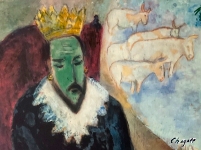
"The descent to hell is easy and those who begin by worshipping power, soon worship evil." - C.S. Lewis, The Allegory of Love (1936)
01.23.25 (Tevet 23, 5785) Spiritually speaking, a heart that is insensitive, indifferent, unfeeling, and callous toward the needs of others is regarded as "hard" or "difficult." Often such hardness comes as a result of living in a fallen world. Many wounded people live with "scar tissue" that surrounds their heart, making them feel numb and unwilling to open up and trust others. Their affections have become disordered and their ego rationalizes blaming others or seeking various forms of entitlement. "Turning off your heart" can mean suppressing any positive regard for others (empathy) while nurturing anger and self-righteousness, or it may mean withdrawing from others as a lifeless shell (both approaches vainly attempt to defend the heart from hurt). Although Yeshua always showed great compassion, especially to the wounded and broken in spirit (Isa. 42:3), He regularly condemned the "hardness of heart" ("sclero-cardia," σκληροκαρδία) of those who opposed his message of healing and love.
A hard heart is closed off and impermeable to love from others, and especially from God. It is a "difficult" (קָשֶׁה) heart, inflexible and even cruel. Scripture uses various images to picture this condition, including a "heart of stone" (Ezek. 36:26, Zech. 7:12), an "uncircumcised heart" (Jer. 9:26), a "stiff neck" (Deut. 31:27), and so on. Stubbornness is really a form of idolatry, an exaltation of self-will that refuses to surrender to God. If you are wounded and afraid to open your heart in trust to others, ask God for healing...
God wants us to have "soft" hearts that are malleable and subject to His touch and influence. Consider the Biblical analogy of a potter who works with clay (Isa. 64:8, Jer. 18:6). Hard clay is brittle and hard to work with, though soft clay can be molded and adapted for a variety of uses. Applied to our heart attitudes, soft clay represents being open and moveable, whereas hard clay represents being inflexible, intolerant, and so on. A "hard hearted" person is closed-minded, assured of his own righteousness, and unwilling to admit the possibility of being wrong. He is really a "fragile" soul who is often hidebound by traditions, unwilling to be corrected, and usually so driven by fear and suspicion that he is unable to look at other possibilities. When we find ourselves becoming rigid, inflexible, and intolerant, we may be demonstrating hardness of heart.
Hardness of heart is something all of us deal with, even those who trust in Yeshua. After all, New Covenant believers are commanded to "put off the old self with its practices" (Col. 3:9) and are urged not to harden their hearts (μὴ σκληρύνητε τὰς καρδίας) through unbelief (Heb. 3:8,15, 4:7). The flesh dies hard, however, and "putting off" the old self requires divine intervention; however, if we cry out to the LORD for deliverance (especially from ourselves) He has promised to hear us (Rom. 10:13, Joel 2:32). The awareness that we are hardhearted and self-deceived can lead to a (blessed) sense of brokenness and despair -- i.e., to the realization that own self-sufficiency is futile and ultimately self-destructive. Turning to the LORD in despair of ourselves is a mark of humility. When we are emptied of ourselves, we are delivered from pride and self-deception and thereby enabled to truly ask for God's help... This is a miracle, since all of us have "a little Pharaoh inside," clamoring ti be the center of our universe and refusing to submit to the Presence of the LORD...
May God's blessing keep our hearts soft and open toward others... May the LORD give us a new heart, and put a new spirit within us. May He remove the heart of stone (לֵב הָאֶבֶן) from us and give us a heart of flesh (לֵב בָּשָׂר). May we be lev echad - "one heart" - with one another and with the Father (Ezek. 11:19). May we be so sensitized to the Presence of God that we detect the slightest touch from His hand upon us. Amen.
Hebrew Lesson
Ezekiel 36:26a Hebrew reading (click):
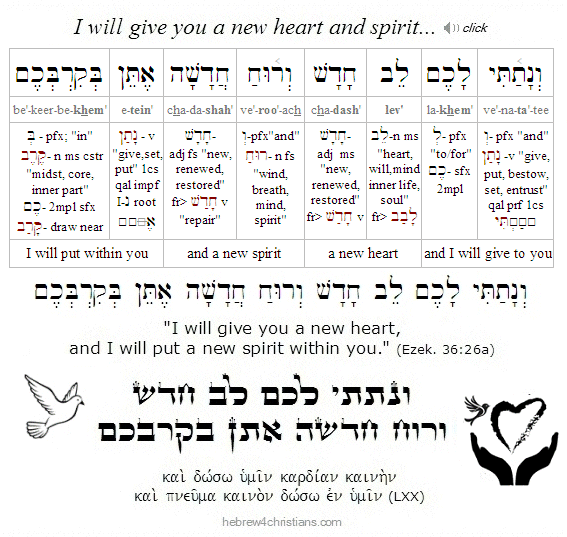 |
Torah of Empathy...

01.23.25 (Tevet 23, 5785) Our Torah portion for this week (i.e., Va'era) begins: "God (אֱלהִים) spoke to Moses and said to him, "I am the LORD (יהוה). I appeared to Abraham, to Isaac, and to Jacob as El Shaddai (אל שׁדּי), but by My Name the LORD (יהוה) I did not make myself known to them" (Exod. 6:2-3). Now the Hebrew word va'era (וארא), translated "I appeared," has a numerical value of 208, the same value as the name Yitzchak (יצחק), which suggests a connection between the Akedah (the sacrifice of Isaac) and the redemption (גְּאֻלָּה) of YHVH that culminated in the original Passover ritual given in Egypt. The story of yetziat mitzraim (יְצִיאַת מִצְרַיִם) - the Exodus from Egypt - reveals the glory of God's great empathy for His people... Yet how much more do we experience God's great empathy through the sacrificial life of His Son, Yeshua?
There is an old Chassidic story of two men sitting and enjoying a drink together. One of them then says to the other, "You know, you're my best friend. I really love you, brother!" The other man responds, "Oh yeah? If you really love me, tell me where I hurt..."
The point of this simple story is that we can't really say we love someone without taking the time to know them -- and that means knowing how they suffer. Most of us are suffering, of course, but are we able to transcend our own pain to genuinely empathize with others? Conversely, how many people do we trust enough to to confide our own pains and heartaches? The Law of Messiah (תוֹרת המשׁיח) is to bear one another's burdens (τα βαρη, "weights," Gal. 6:2), and that means making ourselves vulnerable -- and making room inside our hearts for the vulnerability of others. James tells us that personal healing comes from confessing outwardly (εξομολογεισθε) our sins (τας αμαρτιας) to one another so that we may be healed (James 5:16). Of course it's humbling to share our sins, our failures, and our hurts to another, but without an audience for the inner voice of our pain, we suffer all the more...
If someone loves us, they will know "where we hurt"; and if we love them, we will know where they hurt, too. This same principle can also be applied to our relationship to Yeshua... We take comfort that Yeshua sticks closer to us than a brother, interceding on our behalf and "knowing where we hurt." But if we say that we love him, are we are not claiming that we know him and "where he hurts?" Does Yeshua suffer today? The Apostle Paul wrote: "Now I rejoice in my sufferings for your sake, and in my flesh I am filling up what is lacking in Christ's afflictions for the sake of his body, that is, the church" (Col. 1:24). What is "lacking in Christ's afflictions" is our present sacrifice for the sake of others... Yeshua hungers with those who are hungry, thirsts with those who are thirsty, feels loneliness with those who are abandoned, shivers with those who are cold, weeps with those who are forlorn, is imprisoned with those who are incarcerated, is sick with those who are ill, and so on (Matt. 25:31-ff). Yeshua feels the pain of even the "least of these my brothers." This is where he hurts, chaverim...
The essential difference between the righteous and the unrighteous is revealed in their response shown to those in need. After all, on the Day of Judgment, both the righteous and the unrighteous will account for their choices in light of the selfsame needy and pain-riddled world. The destiny of each person will be determined by whether he or she took the time to genuinely engage the suffering of others... May the LORD help us to share His heart and passion for a lost and hurting world.
Hebrew Lesson
Psalm 116:1-2 reading (click):
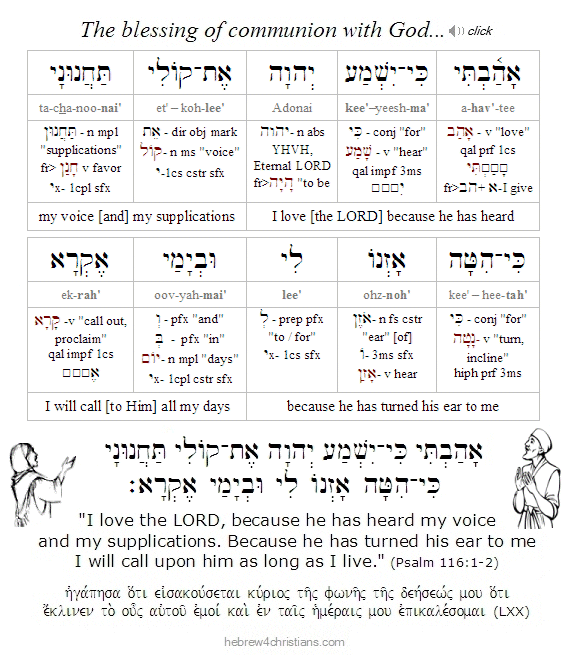 |
Gift of Holy Desperation...

01.22.25 (Tevet 22, 5785) Do you have the "gift of holy desperation"? That's the special blessing of needing God so viscerally that you will fall apart or even self-destruct apart from His daily intervention in your life... "Find God or die." You pray because your very life depends on it; you believe because without God, you would be swallowed up in darkness. "Blessed are the poor in spirit," Yeshua said, "for theirs is the kingdom of heaven" (Matt. 5:3). Note that the term translated "the poor" (οἱ πτωχοι) is derived from a word that means "to crouch as a helpless beggar." This word provides an image of someone in abject poverty, totally dependent on others for help. The "poor in spirit" are those who are painfully aware of their exile and need for help from God:
"Give me yourself, O my God, give yourself back to me. Lo, I love you, but if my love is too mean, let me love more passionately. I cannot gauge my love, nor know how far it fails, how much more love I need for my life to set its course straight into your arms, never swerving until hidden in the covert of your face. This alone I know, that without you all to me is misery, woe outside myself and woe within, and all wealth but penury, if it is not my God... O Lord my God, tell me what you are to me. Say to my soul, I am your salvation. Say it so that I can hear it. My heart is listening, Lord; open the ears of my heart and say to my soul, I am your salvation. Let me run toward this voice and seize hold of you. Do not hide your face from me: let me die so that I may see it, for not to see it would be death to me indeed." - Augustine of Hippo
The fire on the altar was to be kept burning at all times (Lev. 6:12-13) symbolizing the "inner fire of the heart." How blessed it is to be full of the fire of this inner need, this relentless groaning, this constant hunger and thirst for God and his righteousness! Even more wonderful is how the korban tamid - the daily whole burnt sacrifice of the lamb - represents Yeshua's ongoing and wholehearted passion for you to come alive to God's love... How blessed we are to receive the bread of life from the hand of our heavenly Father.
Hebrew Lesson
Psalm 51:7 Hebrew reading (click):
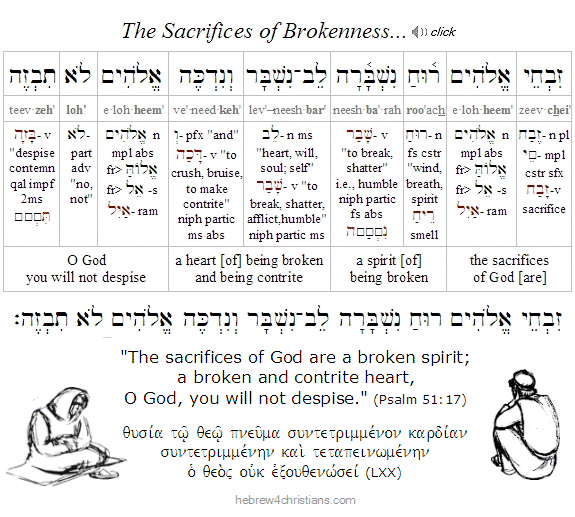 |
Spirituality often enough involves a sense of irremediable brokenness, a feeling that you are not whole, that you are a mess, and that your need for God's healing is constant and relentless... Contrary to the ideals of proud humanism, spirituality is a state of "blessed neediness," of being "afflicted in spirit," a desperate ache for God's power of healing. Those who humbly cry out to the LORD understand their great need for deliverance, "Woe is me, for I am ruined..." (Isa. 6:5). As Yeshua said, "Everyone who exalts himself will be humbled, but the one who humbles himself will be exalted" (Luke 18:14).
Soren Kierkegaard said "to need God is our highest perfection." Ponder how your heart's need impels you to reach out for life, for connection, and for healing:
"In a beautiful sense the human heart will gradually (the grace of God is never taken by force) become more and more discontented -- that is, it will desire more and more ardently, it will long more and more intensely, to be assured of grace. See, now everything has become new, everything has changed.
With respect to the earthly, one needs little, and to the degree one needs less, the more perfect one is. A pagan who knew how to speak only of the earthly has said that the deity is blessed because he needs nothing, and next to him is the wise man, because he needs little.
In a human being's relationship with God, however, the matter is inverted: the more he needs God, the more deeply he comprehends that he is in need of God, and then the more he in his need presses forward to God, the more perfect he is. Therefore, the words "to be contented with the grace of God" will not only comfort a person, and then comfort him again every time earthly want and distress make him, to speak mundanely, needful of comfort, but when he really has become attentive to the words they will call him aside, where he no longer hears the secular mentality's earthly mother tongue, the speech of human beings, the noise of shop keepers, but where the words explain themselves to him, confide to him the secret of perfection: that to need God is nothing to be ashamed of but is perfection itself, and that the saddest thing of all is if a human being goes through life without discovering that he needs God."
Soren Kierkegaard: Upbuilding Discourses
From Faith to Faith...
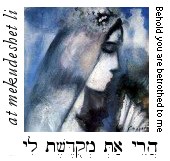
01.22.25 (Tevet 22, 5785) If you were ask to God for just one thing, what would it be? Our deepest yearnings are like prayers. Whatever the heart genuinely seeks, it will find. The person who pursues righteousness will find it, just as evil comes to the person who searches for it (Prov. 11:27). Therefore the voice of wisdom cries out, "I love those who love me, and those who seek me diligently find me" (Prov. 8:17), and the prophet shouts, "Seek the LORD while he may be found, call upon him while he is near" (Isa. 55:6). God is near to us in Yeshua, who said, "Ask, and it will be given to you; seek, and you will find; knock, and it will be opened to you. For everyone who asks receives, and the one who seeks finds, and to the one who knocks it will be opened." As you believe, so you will receive (Matt. 21:22).
 |
This is the "like for like" principle of faith. Forgive us as we forgive; judge us as we judge; love us as we love; make us righteous as we take hold of righteousness, give us courage as we believe, and so on. As Isaiah said to fearful king Ahaz: "If you will not be firm in faith, you will not be firm at all" (Isa. 7:9). Your "amen" echoes the "amen" of heaven: "Let it be done for you according to your faith" (Matt. 9:29).
The principle of "let it be according to your faith" is profound and is a two-edged sword, since it applies not just to matters of velleity and hope, but also to murmurs of the heart and discontent. The sages said that the manna in the desert would taste good or bad depending on the heart attitude of the person. Likewise, when the people arrived at Marah, they could not drink the water because it was "bitter" (מָרָה), though the Hebrew text allows us to read that it was the people themselves who were bitter - ki marim hem (כִּי מָרִים הֵם), and their bitterness made the waters seem bitter as well (Exod. 15:23).
Hebrew Lesson
Prov. 21:21 Hebrew reading (click):
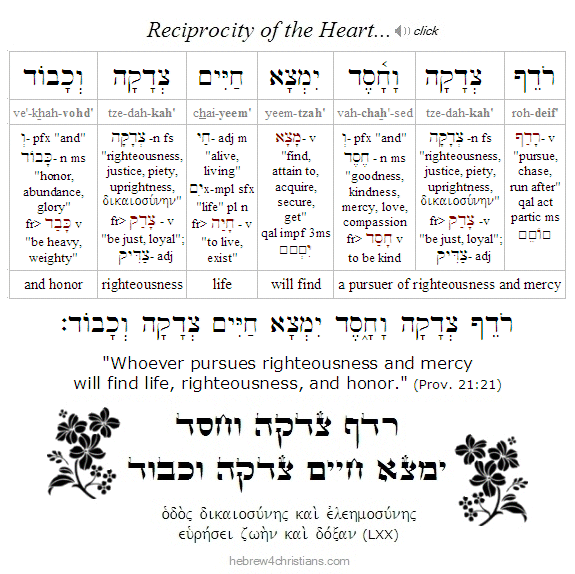 |
"Whoever pursues righteousness and kindness will find life, righteousness, and honor" (Prov. 21:21). Notice that the subject of this verse is a participle that comes from the verb radaf (רָדַף), which means to follow after, or to pursue, as in a chase or a hunt. This same verb is used when King David exclaimed, "surely goodness and love will pursue me (יִרְדְּפוּנִי) all the days of my life" (Psalm 23:6). King David understood that as he pursued God, so God's love would pursue him! In other words, as we seek, so we are sought by God; as we draw near to God, so He will draw near to us (James 4:8).
Notice further the repeated use of the word "righteousness" (i.e., tzedakah: צְדָקָה) in this verse. When we pursue God's righteousness, we will find it, and we will be declared righteous (i.e., tzaddik: צַדִּיק) and given life (i.e., chayim: חַיִּים) and honor (i.e., kavod: כָּבוֹד). "In the path of righteousness is life, and in its pathway there is no death" (Prov. 12:28). Therefore Yeshua calls us to "seek first the kingdom of God and His righteousness, and all these things will be added to you" (Matt 6:33).
The prophet expresses hope: "Let us know; let us press on to know the LORD; his going out is sure as the dawn; he will come to us as the showers, as the spring rains that water the earth" (Hos. 6:3). Salvation is "of the LORD." May God help us pursue him b'khol levavkha - with all our heart - because the He has promised, "You will seek me and find me, when you seek me with all your heart" (Jer. 29:13).
 |
Our Daily Deliverance...
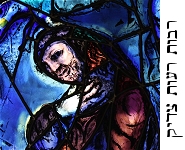
01.21.25 (Tevet 21, 5785) Just as we ask God for daily bread (לֶחֶם חֻקֵּנוּ), so we ask him for our daily deliverance: "Lead us not into temptation, but deliver us from evil" (Matt 6:13). Note that the term translated "evil" in many translations ("deliver us from evil") is a substantive rather than an adjective: τοῦ πονηροῦ, the evil one... "Give us this day our daily deliverance from the evil one...."
Our daily bread and our daily deliverance are connected with our decision to "choose life" (בַּחַרְתָּ בַּחַיִּים) -- and to always choose life -- even in moments we find difficult, distressing, and even when we might wish that we were no longer living... Choosing life means refusing to escape reality by evading the significance of our choices; it means finding the will to regard life as worthy; it implies that we will eat our bread in trust that the Lord is at work even in the darkest of hours (Passover occurred at midnight)... Choosing life means refusing to eat the fruit of death and to seek Yeshua, the Tree of Life. We live one day at a time; we only have today. We are given daily bread for this hour of our need. Today is the day of your deliverance - if you are willing to walk in it. Therefore, the Spirit of the Living God cries out, "Choose life and live!"
"Do not be grieved [even over yourself], for the joy of the LORD (חֶדְוַת יְהוָה) is your strength" (Neh. 8:10). Affirming the love, faithfulness, compassion, and salvation of God is a powerful way to defeat the enemy of our souls, who regularly entices us to despair. King David constantly asked God to help him in his spiritual struggles. "Though I walk in the midst of trouble (בְּקֶרֶב צָרָה), you preserve my life; you stretch out your hand against the wrath of my enemies, and your right hand delivers me" (Psalm 138:7). "For the enemy has pursued my soul; he has crushed my life to the ground; he has made me sit in darkness like those long dead. Therefore my spirit faints within me; my heart within me is appalled" (Psalm 143:2-3). Despite whatever struggle we may face, "the LORD is near to the brokenhearted and saves the crushed in spirit (Psalm 34:18). Indeed, the Lord God is far greater than your heart's sin and will one day entirely deliver you of sin's effect and influence. Amen.
Hebrew Lesson
Psalm 34:19 reading (click):
His Invincible Purposes...
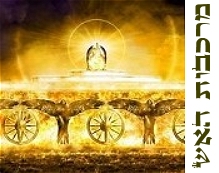
God knows the beginning from the end, but we are somewhere in the middle...
01.21.25 (Tevet 21, 5785) When you are tested, affirm your confidence. Spiritually speaking, the first step is to find hope... The Divine Light is seen by the eye of faith (עין האמונה), and therefore we find strength by trusting in God's Presence, even though we cannot presently see Him (2 Cor. 4:18; 5:7). "Trust in the LORD with all your heart, and do not lean on your own understanding. Know Him in all your ways, and He will straighten your paths. Be not wise in your own eyes; fear the LORD, and turn away from evil" (Prov. 3:5-7). Wait on the LORD and He will strengthen your heart....
We must remain steady as we fight the "good fight of faith." This is the struggle against the lie that God does not care for us and that we are therefore abandoned and on our own. We must repudiate fear and boldly lay hold of the promises of God; we must take every thought captive to the reality of God's love for us in Yeshua. As it is written, "The LORD is my light and my salvation; whom shall I fear? The LORD is the stronghold of my life; of whom shall I be afraid? When the wicked come upon me to devour my flesh, when my adversaries and enemies attack me, they will totter and fall. Even if an army is deployed against me, I will not fear; even if war is rises against me, I will remain full of trust" (Psalm 27:1-3).
The Midrash says, "The Holy One Himself, as it were, made light for the upright. Thus it says, "The LORD is my light and my salvation" (Psalm 27:1) and "When I sit in darkness, the LORD will be a light to me" (Micah 7:8). While I sit in darkness in this world, during these latter days before the promised return of Yeshua, when troubles may afflict me and lawlessness may abound – then God's light will shine brighter still, for the LORD is gracious to all who put their hope in Him, and this favor and love will be manifest for me.
Whenever I feel anxious or downcast, I need to meditate upon the greatness of God and his invincible power. His will is sovereign and no one and nothing can ever thwart his plans and purposes for our good (Rom. 8:28). Let us therefore renew our confidence in Him: The darkness of this world forever is swept back before the overmastering radiance and power of Yeshua, the King of Glory, the Root and Descendant of David, and the Bright Morning Star (Rev. 22:16). Those who believe in Him are given the "light of life" that overcomes the darkness of this world (John 8:12). We are made "more than conquerors" through the One who loves us. Nothing can overrule God's plan for our salvation, as it says: "The purpose of the LORD endures forever, the thoughts of his heart are to all generations" (Psalm 33:11).
Hebrew Lesson
Psalm 33:11 Hebrew reading:
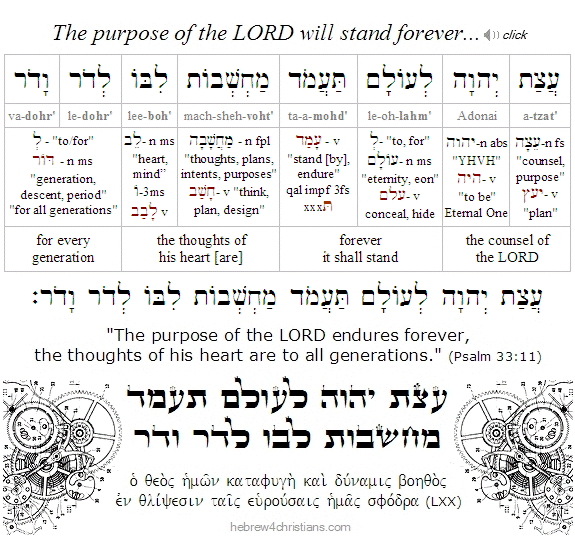 |
As we draw closer to the "end" of the "End of Days" it is important not to let our hearts grow cold or numb with fear... The devil uses mass media, the realm of politics, and stupefying "news" propaganda of this world (i.e., κόσμος) to incite the workers of iniquity to do his bidding, tempting believers in the LORD to feel discouraged, overrun with evil, and increasingly marginalized in their faith... But take heart, chaverim: the victory has already been won; God's truth will forever prevail (1 Cor. 15:57). Always remember that there is more power in one simple and heartfelt prayer before heaven than all the schemes and armies of the wicked combined. All those who are "fathered by God" conquer the world, since God imparts to us the victory of faith by means of His powerful Spirit (1 John 5:4). Therefore the heart of faith says, "In all these things [afflictions, tribulations, etc.] we are 'more than conquerors' (lit., "hyper-conquerors," i.e., ὑπερνικῶμενfromὑπέρ, "hyper" + νικάω, "to overcome") through Him that loved us (Rom. 8:37). So do not lose heart. Don't believe in the matrix of this world. Time is short; the hour approaches... "Have no fear of them, for nothing is covered that will not be revealed, or hidden that will not be known" (Matt. 10:26). Amen.
 |
Breathing God's Name...
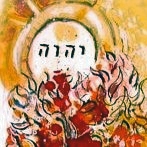
01.21.25 (Tevet 21, 5785) In the Scriptures God's Name is revealed as YHVH (יְהוָה), which means "He is Present." The Name is formed from the words hayah ("He was"), hoveh ("He is"), and yihyeh ("He will be"): הָיָה הוֶה וְיִהְיֶה, indicating God's omnipresence. Note that all the letters of the Name are "vowel letters," which mean they evoke breath and life. This is the Name revealed to Moses thousands of years before the advent of other religions (Exod. 3:14), and indeed it is the Name associated with the nishmat chayim (נִשְׁמַת חַיִּים), the "breath of life," imparted to Adam in the orchard at Eden (Gen. 2:4). It is therefore the original Name of God "breathed out" to mankind. The Name Yeshua (יֵשׁוּעַ) means "YHVH saves." There is no other Savior beside Him, there is no other Name, there is no other LORD. "For I am the LORD your God, the Holy One of Israel, your Savior." Only Yeshua the Messiah can deliver you from the wrath to come (1 Thess. 1:10).
Many people live in regret over the past or in dread of the future. The Hebrew name of God, the Tetragrammaton (יהוה), means: "He is Present." We can only find God now, today, at this hour. Today if you hear His voice... Yeshua said, "The kingdom of heaven is within you" (מַלְכוּת הָאֱלהִים בְּקִרְבְּכֶם), that is, is to be found within the heart of faith (Luke 17:21). The Name YHVH also means that God is the faithful One (הָאֵל הַנֶּאֱמָן), because all that happens occurs within the immediacy of his Presence. Human logic is based on finite reasoning and how things are connected in time and space (cause and effect), but God's "logic" transcends intermediaries and is immediately certain, not bound by temporal-spatial limitations, and therefore his knowledge is certain (Num 23:19; Eccl. 3:11; Isa. 46:10; Mal. 3:6).
The question is asked why the Torah was written without vowels, punctuation marks, and so on. The lack of vowels implies that we must bring breath (i.e., ruach, spirit) to our reading of the words; the lack of punctuation implies that we must be humble and rely on others to help us read with understanding. In other words, we must bring our heart to the reading and be open-minded to receive revelation.
 |
We need the power of the Holy Spirit to read correctly, and the Holy Spirit reveals the Living Word and glory of Yeshua: "It is the Spirit who gives life; the flesh is no help at all. The words that I have spoken to you are spirit and life" (John 6:63).
Hebrew Lesson
Zech. 4:6 reading (click):
Struggles of Faith...

Wisdom says we're nothing, love says we're everything; between these our lives flow (Kornfield).
01.21.25 (Tevet 21, 5785) Do you sometimes have trouble trusting God? Do you wrestle with fear, anxiety, or worry? Does an inexplicable dread or sense of hopelessness sometimes oppress you? Do you secretly wonder what's wrong with you - and whether you are truly saved, after all? Please hang on. Doubting and questioning are often a part of the journey of faith, and we don't have to be afraid of our questions, concerns, and difficulties... Being full of "certainty" is not the same as being full of faith, after all, since many sincere people are sincerely self-deceived, while many others experience fear, loneliness, and trouble as a result of their faith. There is so much we simply do not know, and it is dishonest to pretend otherwise. God knows your heart and its struggles; he knows all your secret fears. Thankfully, there is a special prayer included in the holy Scriptures for those times when we feel especially unsteady or insecure: "Lord, I believe, help thou my unbelief..." (Mark 9:24). These words offer an invitation to bring our (lack of) faith to God for healing....
We should not be scandalized that we sometimes struggle with our faith. After all, Yeshua constantly questioned his disciples: "Do you now believe?" (John 16:31). And that's why we are commanded to "put off" the old nature and to "put on" the new nature -- because God knows we are fickle admixtures, contradictions, carnal-yet-spiritual, inwardly divided souls that need to learn to trust in the miracle of God with all our hearts....
Of course it's easy to believe when things are going well, when faith "makes sense" or provides you with a sense of community, etc., but when things are difficult, when there are disappointments, pain, grief, losses, etc., then you need to trust in the unseen good, the "hidden hand" of God's love, despite the trouble of your present circumstances. This is part of faith's journey: leaning on God's promise despite the "valley of the shadow of death," despite the unknown. The way may sometimes be difficult, but "the tested genuineness of your faith -- more precious than gold that perishes though it is tested by fire -- will be found to result in praise and glory and honor at the revelation of Yeshua the Messiah" (1 Pet. 1:7).
Hebrew Lesson
Psalm 119:19 reading with comments:
Every Soul's Struggle...
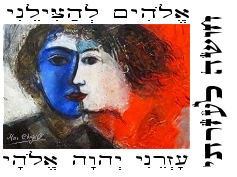
It's sadly ironic that we squander our days before we learn how precious and few they are...
01.20.25 (Tevet 20, 5785) "Everybody wants to go to heaven, but nobody wants to die..." Everybody wants the finished product of a surrendered life, but no one wants the process, the painful shattering, the revelation of the end of themselves... And yet it is only by means of affliction that the "outer shell of the seed" is broken so that new life can burst forth: "I tell you the solemn truth, unless a kernel of wheat falls into the ground and dies, it remains by itself alone. But if it dies, it produces much grain" (John 12:24). If the seed does not fall to the ground and die, αὐτὸς μόνος μένει - it remains alone - by itself...
Since we will not surrender without struggle, God must intervene and save us from ourselves. Each of us must "go to Peniel" to wrestle with the Angel; each of us must be renamed from Ya'akov ("a supplanter") to Israel ("a prince with God"). Like Jacob, we will prevail with God when we give up the fight and accept our brokenness. We win by surrendering.
It's been said that we can never know that God is all we need until God is all we have left (John 15:5). Therefore "blessed are the poor in spirit, for theirs is the kingdom of heaven; blessed are those who mourn, for they shall be comforted; blessed are those who hunger and thirst for righteousness, for they shall be filled..."(Matt. 5:3-6).
Hebrew lesson
Psalm 119:67 reading (click):
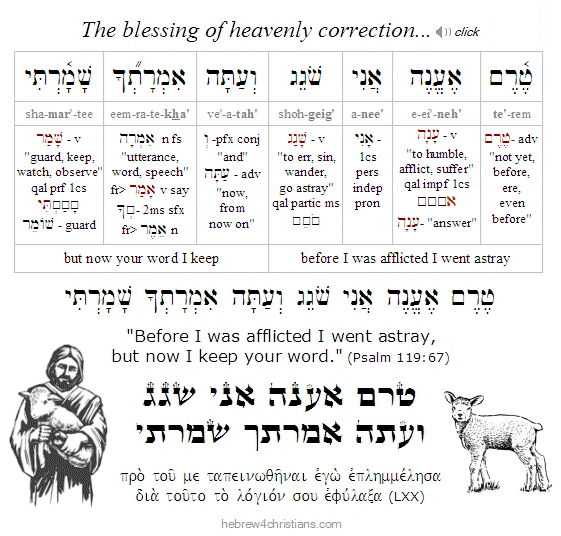 |
Source of our Breath...
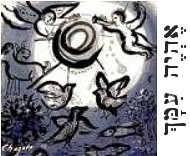
01.20.25 (Shevat 20, 5785) Though the meaning of God's Name (YHVH) was initially revealed to Moses as simply eheyeh (אֶהְיֶה), "I AM," or "I WILL BE" (Exod. 3:14), it is wonderful to realize that His Name was also revealed as eheyeh imakh (אהְיֶה עִמָּךְ), "I WILL BE WITH YOU" (Exod. 3:12; Josh. 1:5,9; Isa. 41:10,13; John 10:28; Matt. 28:20, etc.).
Just as the LORD is called Elohei ha-ruchot lekhol basar (אֱלהֵי הָרוּחת לְכָל־בָּשָׂר), "the God of the breath of all flesh" (Num. 16:22), so He is the Source of your breath, the One who exhales to you nishmat chayim (נִשְׁמַת חַיִּים), the "breath of life" that enables you to live (Job 12:10). Indeed the Name YHVH (יהוה) first appears in the Torah in regarding imparting the breath of life to Adam (Gen. 2:7).
Note further that each of the letters of the Name YHVH represent vowel sounds (i.e., breath), suggesting again that God's Spirit is as close as your very next breath. Like the wind that cannot be seen, so is the spirit the essential part of your identity. Yeshua breathed on his followers and said, "Receive the Holy Spirit" (John 20:22).
Hebrew Lesson
Job 12:10 Hebrew reading (click):
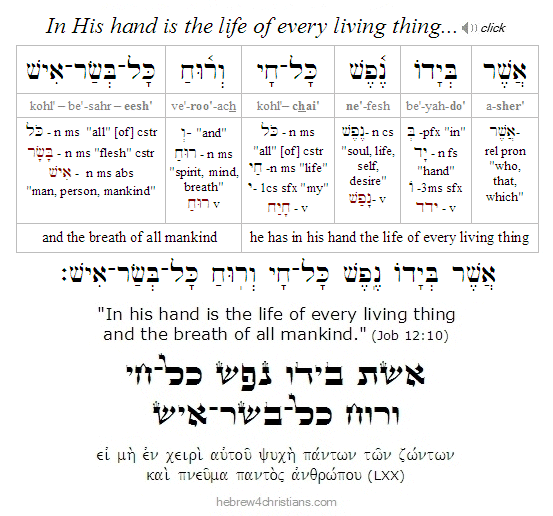 |
Parashat Va'era:
God Reveals Himself as Savior

01.19.25 (Tevet 19, 5785) Shavuah tov, chaverim. Recall that last week's Torah portion (i.e., parashat Shemot) explained how Moses and Aaron were commissioned to go before Pharaoh and deliver the message: shalach et-ammi (שַׁלַּח אֶת־עַמִּי), "Let my people go" that they may hold a feast to me in the desert" (Exod. 5:1). Not only did Pharaoh dismiss the request, but he imposed even harsher decrees against the Israelites and caused them to suffer miserably. Moses then appealed to the LORD, who reassured him that Pharaoh would eventually relent because "the greater might" of the LORD's power would deliver His people.
Hebrew Lesson
Exodus 5:1b reading (click):
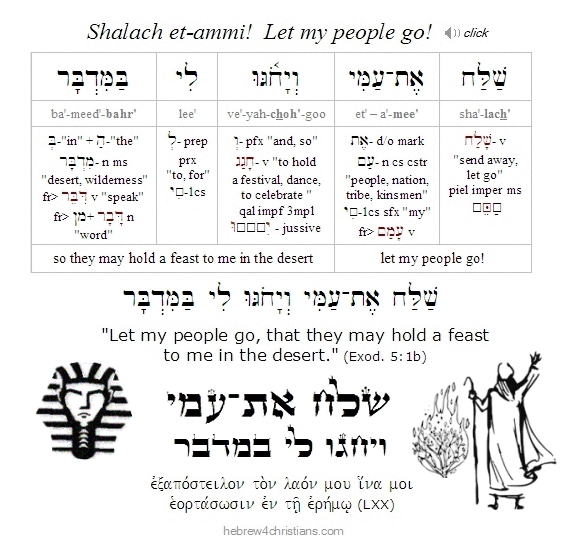 |
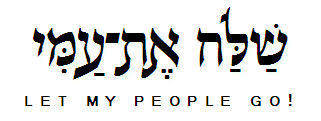 |
In this week's portion, parashat Va'era, (i.e., Exod. 6:2-9:35), the LORD told Moses that He was now going to fulfill His promise to Abraham, Isaac, and Jacob by giving the Israelites the land of Canaan, and that he had heard the "groaning of the people of Israel whom the Egyptians held as slaves" (Exod. 6:5). The LORD (יהוה) was now coming down to earth to fight and save his people! Israel would now know that He alone is their Savior and God! The "showdown" between the LORD and the so-called gods of Egypt was imminent, and God therefore encouraged the people with precious promises: "I AM the LORD (אֲנִי יְהוָה) and I will bring you out from under the burdens of the Egyptians, and I will deliver you from their bondage, and I will redeem you with an outstretched arm and with great judgment; and I will take you to me for a people and I will be to you a God; and I will bring you into the land promised to Abraham, Isaac and to Jacob as an inheritance forever (these are the "expressions of redemption" we recall during the Passover Seder every year).
Despite these wonderful promises, however, the people were unable to listen because of their "shortness of breath" (מִקּצֶר רוּחַ) on account of their harsh slavery. The LORD then told Moses: "Go in, tell Pharaoh king of Egypt to let the people of Israel go out of his land," and the great battle between the LORD and the so-called "gods" of Egypt began. However, even after repeatedly witnessing the series of miraculous plagues issued in the Name of the LORD, the despot remained proud and unmoved, thereby setting the stage for the final devastating plagues upon the land of Egypt and the great Passover redemption of Israel.
Hebrew Lesson
Exodus 6:3 Hebrew reading (with comments):
From the Midst of Thorns...
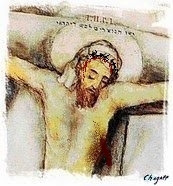
01.17.25 (Tevet 17, 5785) Why did the LORD, the Holy One, reveal Himself to Moses out of the midst of a thorny bush (סְנֶה), and not some grand tree? God lowered himself to speak from within the bush, as it is written: "For though the LORD be high, he regards the lowly" (Psalm 138:6); and "I will be with him in trouble" (Psalm 91:15).
The midrash imagines God saying to Moses: "Don't you feel that I suffer anguish whenever Israel does? Know, therefore, from the character of the place from which I speak, out of the thorn bush, that I, as it were share their suffering" (Shemot Rabbah 2:7).
God speaks to us from the place of thorns – even those about his own head – words of great comfort and deliverance. From the midst of the fire (בְּלַבַּת־אֵשׁ מִתּוֹךְ הַסְּנֶה), within the lowliest of places, covered in the thorns of our sin and shame, Yeshua speaks words of healing love. Bless his name forever!
Hebrew Lesson
Psalm 138:6 reading (click):
Out of the Straits...
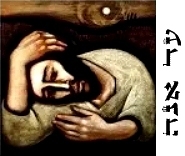
"God, Who is everywhere, never leaves us. Yet He seems sometimes to be present, sometimes to be absent. If we do not know Him well, we do not realize that He may be more present to us when He is absent than when He is present." - Thomas Merton
01.17.25 (Tevet 17, 5785) The name for ancient Egypt in Hebrew is "mitzrayim" (מִצְרַיִם) a word that can be translated as "straits" or "narrow places" (i.e., -מ, "from," and צַר, "narrow"), suggesting that "Egypt" represents a place of constriction, tribulation, oppression, slavery, and despair. The Hebrew word for salvation, on the other hand, is "yeshuah" (יְשׁוּעָה), a word that means deliverance from restriction, that is, freedom and peace. As it is written: "From my distress (מִן־הַמֵּצַר), i.e., from "my Egypt," I cried out to the LORD; the LORD answered me and set me in a wide open place" (Psalm 118:5).
But why, it may be asked, did God say to Jacob: "Do not be afraid to go down to Egypt" (Gen. 46:3)? Why did God allow this excursion into "heavy darkness" that Abraham clearly foresaw (Gen. 15:12-13)? What is there about "Egypt" that prepares us to take hold of our promised inheritance? Joseph become a prince of Egypt; however, he was still captive to Pharaoh, and later, after he died, a "new Pharaoh arose" that did not acknowledge his contribution to Egyptian history (Exod. 1:8). All that remained of Joseph were his bones – a chest of bones that were carried by Moses (and later buried by Joshua in Shechem). The "bare bones" of Joseph represented the essence of his faith, as he foresaw the time when God would rescue the family from Egypt and raise him up in the land of promise (Gen. 50:24-26; Heb. 11:22).
A general principle of spiritual life is that the "the way up is the way down" (John 12:24). As Yeshua said, "Whoever would be first among you must be slave of all" (Mark 10:44). Becoming nothing (i.e., ayin) in this world is the condition for seeing something in the world to come. Unless a seed falls to the ground it abides alone (John 12:24). But we become "nothing" by trusting in the promise of God, not by trying to do it ourselves... This is not another venture of the ego. Life in the Spirit means trusting that God will do within you what you cannot do for yourself... We can only take hold of what God has done for us by "letting go" of our own devices (Phil. 2:13). When we let go and trust, we will be transformed, carried by the "Torah of the Spirit of life" (i.e., תּוֹרַת רוּחַ הַחַיִּים, Rom. 8:2), The way is not trying but trusting; not struggling but resting; not clinging to life, but letting go...
God's way of deliverance is entirely different than man's way. Man tries to enlist carnal power in the battle against sin (i.e., religion, politics, etc.), but God's way is to remove the flesh from the equation. The goal is not to make us stronger and stronger, but rather weaker and weaker, until the ego is crucified and only the sufficiency of the Messiah remains. Then we can truly say, "I have been crucified with Messiah. It is no longer I who live, but the Messiah who lives in me. And the life I now live in the flesh I live by faith in the Son of God, who loved me and gave himself for me" (Gal 2:20). The word "Hebrew" (עִבְרִי) means one who has "crossed over" (עָבַר) to the other side, as our father Abraham did when he left the world of Mesopotamia (Gen. 14:13). Likewise it is on the other side of the cross that we experience the very power that created the universe "out of nothing" (i.e., yesh me'ayin: יֵשׁ מֵאַיִן) and that raised Yeshua the Messiah from the dead.
Hebrew Lesson
Psalm 118:5 Hebrew reading (click):
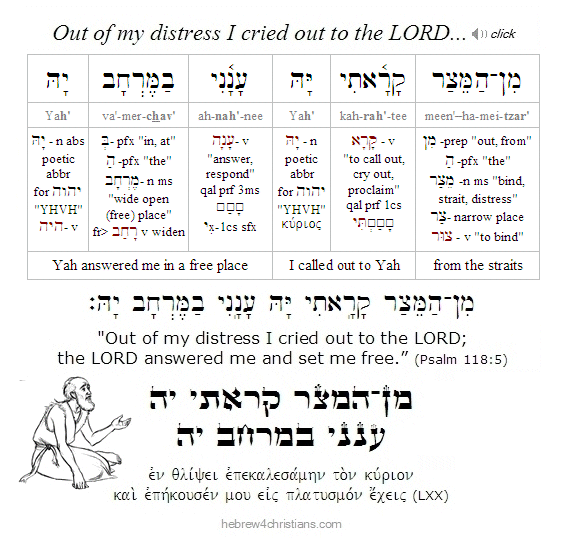 |
Teshuvah and Waste Places...
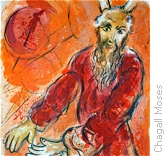
"When God wants to do an impossible task He takes an impossible man and crushes him" (Alan Redpath). The following considers the breaking of Moses in parashat Shemot.
01.17.25 (Tevet 17, 5785) Forty years before encountering the LORD in the burning bush, Moses was full of himself, a prince of Egypt "mighty in word and deed" who regarded himself as Israel's deliverer (Acts 7:22-25). But Moses' "Egyptian-styled" ego led him to regard murder and human uprising as the means of deliverance, and consequently God sent him into exile to think things through...
And it was there, in the waste places of the desert, that God's education began - the school of brokenness, teshuvah, and heart-listening... Only after this did God appear to him, calling out to the man who had lost all his former confidence in the flesh. Moses' humility mirrored the emptiness of the desert: "Who am I?" he protested, "I can't do this thing..." (Exod. 3:11). Exactly! Now he understood. Similarly, we must be careful not to regard ourselves as "strong," since the power of the flesh is useless for the purposes of heaven (Zech. 4:6). As it is written, "Thus says the LORD: 'Cursed is the man who trusts in man and makes flesh his strength, whose heart turns away from the LORD. He is like a shrub in the desert, and shall not see any good come. He shall dwell in the parched places of the desert, in an uninhabited salt land" (Jer. 17:5-6). It was only after Moses' question, "Who am I?" was answered by God's "I AM who I AM," that the "useless shrub" became aflame with power...
Moses' rod, which he had relied upon for years in the desert, was then transformed to be used as an instrument of Divine Power (Exod. 4:1-5). God entrusts the rod of His authority only in the hands of a truly broken man.... Similarly, though Moses was described as a man "mighty in word and deed," these were attributes of the flesh unrefined by the Spirit of God. Therefore, after being humbled in the desert, Moses confessed that he was kevad peh (כְבַד־פֶּה) - "heavy of mouth" - and kevad lashon (כְבַד לָשׁוֹן) "heavy of tongue," and unable to speak on behalf of the LORD. God then told him that He would "be with his mouth" to teach him what to say (Exod. 4:10-12). This likewise teaches that God entrusts the utterance of his word to the tongue of a genuinely broken man...
Hebrew Lesson
Psalm 119:71 Hebrew reading lesson (click):
His desire for your heart...

01.16.25 (Tevet 16, 5785) "And this is the confidence that we have before him, that, if we ask anything according to his will, he surely hears us. And if we know that he hears us regarding doing his will, we know that he will give us what we ask of him" (1 John 5:14-15).
It might seem obvious to you, but Yeshua wants us to believe in him; he wants us to trust in him, he wants us to know his heart - and to respond to him "with all our heart." This is breathtakingly amazing and wonderful news, is it not? Not that God demands that you obey him (or else), but that he profoundly wants your love? That he desires your attention? Your communion? And the Scripture promises us that if we sincerely ask him for this very thing, that is, to fulfill his desire for us to know his heart and to be in love with him, then we have confidence that he will enable us to truly do so...
It's not about our will to believe or to love him, for we cannot find the heart to do so apart from his grace. "The Lord did not set his love upon you, nor choose you, because of your greatness, but because the Lord loves you" (Deut. 7:7-8). God loves you with an "everlasting love," and it is by means of this love that he draws you to know him. "Come to me, all you who are heavy of heart, and I will give you rest..."
We are able to love God because of his great love for us; our love is "teshuvah" to his call to be his beloved. We love him because he first loved us, which is to say that our love must first come from him.
"Lord, I ask you to let me know your love by the grace of your heart. Your love is the agency and means to be able to love, for apart from you I can do nothing... And because it is your will - it is your desire - that I love you and trust you, I ask that you would enable my heart to do these very things, for how else can I know the depths of your heart and to love you as you have called me so to do? How can I know you apart from you?
But something holds me back, a sense that you are too high and exalted for me to draw close to you... Are you not, O Lord, high and lifted up? Who can approach the blinding light of your glorious presence? Can I take fire from the altar and bring in to my breast without being burned? It's ironic that the more I imagine your unapproachable glory, the more I realize my need for your intimacy and simplicity within my heart. O Lord, you have your own language that is beyond anything I can conceive; your thoughts transcend everything I might imagine. Yet you also speak the language of men; your words make contact with our frailty and finitude; you have made yourself know the language of our lament.
I praise you that your love and your exaltation come together in the person of Yeshua, who emptied himself of all regal power and glories to reach out to touch the lowliest of lepers.... Though you are so high and lifted up, you deign stoop so low, to the utter depths, the very dust of death itself, to deliver the outcast from the hell of their exile.
And so I find comfort that it is your good will, O Lord, to seek and to save the lost, to heal the broken of heart, and to draw even the uttermost into the warm embrace of your love. It is your heart that says to all who know the pain of their hunger for love, "Come unto me..."
Yea, it is your will, O Lord, for us to know you and the beauty of your love, and therefore to surrender ourselves to your presence and receive your blessing, as it is written: "I am my beloved's and his desire is for me." And since it is your will and desire, O precious Lord, for us to belong to you, please assure us to know ourselves as your very own. Amen."
Hebrew Lesson
Jeremiah 31:3 reading (click for audio):
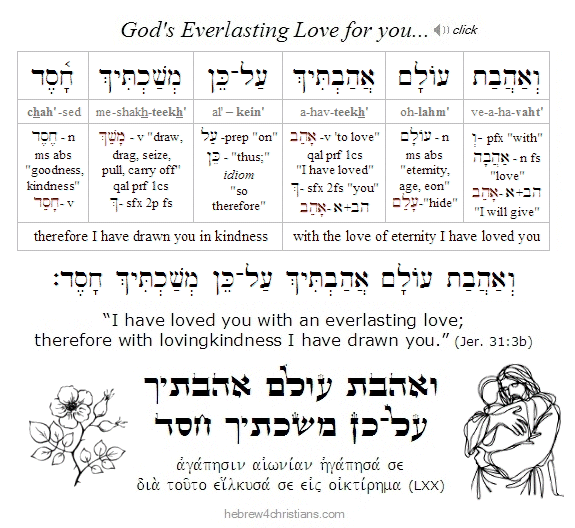 |
Theology of God's Name...
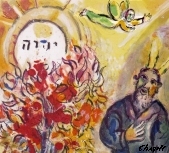
01.15.25 (Tevet 15, 5785) This week's Torah portion (the first of the Book of Exodus) is called Shemot (שְׁמוֹת, "names") because it begins with a list of the "names" of the descendants of Jacob who came to dwell in the land of Goshen: וְאֵלֶּה שְׁמוֹת בְּנֵי יִשְׂרָאֵל הַבָּאִים מִצְרָיְמָה / "These are the names of the sons of Israel who came to Egypt" (Exod. 1:1). Now while it's true that the Torah here lists the various names of the sons of Jacob, this portion more importantly refers the Names (plural) of the LORD God of Israel Himself.
To see this, let's consider the central story of this portion of Torah, namely, the commissioning of Moses at the Burning Bush (see Exod. 3:1-20). Note that the Torah states that it was the Angel of the LORD (i.e., Malakh Adonai: מַלְאַךְ יהוה) who appeared to Moses בְּלַבַּת־אֵשׁ מִתּוֹךְ הַסְּנֶה / "in a flame of fire out of the midst of a bush" (Exod. 3:1-2). But then the Torah goes on to say that the LORD (יהוה) saw Moses drawing near to the bush while God (i.e., Elohim: אֱלהִים) called out to him. God (i.e., Elohim) then commanded Moses to remove his sandals and identified Himself as the "God of Abraham (i.e., Elohei Avraham: אֱלהֵי אַבְרָהָם), the God of Isaac (i.e., Elohei Yitzchak: אֱלהֵי יִצְחָק), and the God of Jacob (i.e., Elohei Ya'akov: אֱלהֵי יעֲקב)." In this short and dramatic account we have several Names of God presented - the Angel of the LORD, the LORD, God (Elohim), and the "God of Abraham, the God of Isaac, and the God of Jacob" - all of which refer to the One true God!
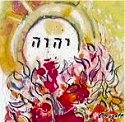 |
When God commissioned Moses to be His shaliach (שָלִיחַ) - His emissary - to go before Pharaoh and lead the children of Israel back to the Promised Land, he objected that he was unfit for the task. He protested that he was kevad peh - "heavy of mouth" and kevad lashon, "heavy of tongue," and therefore unable to speak on behalf of the LORD (Exod. 4:10). God reminded him that He was the Creator of the mouth: "Who makes him mute, or deaf, or seeing, or blind? Is it not I, the LORD?" (Exod. 4:11).
Perhaps it was because Moses was "heavy of mouth" that he continued to object to God's decision to send him to to Egypt. After all, what would Moses say if he were asked what God's Name was? Perhaps Moses couldn't speak well enough to properly enunciate the Name? It is revealing to understand the LORD's reply: אֶהְיֶה אֲשֶׁר אֶהְיֶה / "Ehyeh Asher Ehyeh ('I will be what I will be'); and He said, "Say this to the people of Israel, 'I AM (אֶהְיֶה) has sent me to you.'" Then God (i.e., אֱלהִים) went on to "spell it out" for Moses: "Say this to the people of Israel, 'The LORD (יהוה), [namely] the God of your fathers, [namely] the God of Abraham (אֱלהֵי אַבְרָהָם), [namely] the God of Isaac (אֱלהֵי יִצְחָק), and [namely] the God of Jacob (אֱלהֵי יעֲקב), has sent me to you.' This is my name forever (זֶה־שְּׁמִי לְעלָם), and thus I am to be remembered throughout all generations" (Exod. 3:14-15).
Now I included the Hebrew text here to make it explicit that the distinct Names of God in this passage (i.e., יהוה, אֱלהִים, מַלְאַךְ יהוה, and so on) all refer to the One true LORD God of Israel, Maker of Heaven and earth. Indeed, the Torah makes it clear that the Name of the LORD YHVH (יהוה) is associated with the phrase ehyeh asher ehyeh (rendered as "I AM THAT I AM" in the KJV), which derives from the Qal imperfect first person form of this verb hayah (הָיָה): "I will be." In other words, there is a direct connection between the Name YHVH and Being and Reality itself. YHVH is the Source of all being and has being inherent in Himself (i.e., He is necessary Being). Everything else is contingent being that derives existence from Him. The name YHVH also bespeaks the utter transcendence of God. In Himself, God is beyond all "predications" or attributes of language: He is the Source and Foundation of all possibility of utterance and thus is beyond all definite descriptions.
In Jewish thought, the numerous names of God revealed in Scripture (Elohim, Shaddai, Adonai, the King of Israel, etc.) are thought to reveal different aspects or attributes of God's character and will to us. They function as "short hand" for descriptions of His essence - revelations of the hidden mystery and glory of the LORD. Since taking the name of the LORD "in vain" is one of the Ten Commandments, certain conventions are used to restrict the use of any of the Names of God. These conventions derive from Jewish law (halachah) that requires that secondary rules (גְּזֵרוֹת - "fences") be placed around a primary law to reduce the chance that the main law will be violated. For example, it is common practice to refer to God as "Hashem" (the Name) or to deliberately alter the sound or spelling of the name (i.e., "Adonai"). Mystics referred to the name YHVH as "shem havayah" (שם הוויה), the Name of Being itself, so formed by transposing the letters of the Tetragrammaton.
According to Maimonides, one of the greatest Jewish theologians of the Middle Ages, all the various names and titles of God – with the possible exception of YHVH (יהוה) – are appellations that denote the Divine attributes. There is only one God revealed within Scripture and the multiplicity of names refers to different aspects of revelation rather than supposing that there is a multiplicity of deities. This idea also finds expression in the designation of God as Ein Sof (אֵין סוֹף), a theological term used to express that the essence of God is "without end" or "infinite." The revealed names of God therefore all represent some aspect of the divine nature to us in language that we can apprehend.
In the modern philosophy of language there has been much discussion about how names refer to objects. Are names arbitrary social conventions? Are they "shorthand" for a set of descriptions? Are they mental constructs or do they reveal something about reality itself?
While Gottob Frege (1848-1925) believed that the meaning (or "sense") of a proper name is derived from descriptions associated with it, Saul Kripke (1940-2022) said that names are "rigid designators" with a direct reference, and the meaning of a name is simply the object it refers to, not to a set of descriptions. Theologically this would mean that, for Frege, the meaning of the name YHVH is derived from various ways of describing the name, inductively gathering applications to form a conceptual idea of YHVH, whereas for Kripke, the meaning of the name YHVH is encountered directly in its uniqueness, and that other names may serve as descriptors but the underlying essence remains whatever it is.
Kripke's thinking more or less follows the traditional Jewish view that the numerous names of YHVH revealed in Scripture (Elohim, Shaddai, Adonai, the King of Israel, etc.) all reveal different aspects or attributes of YHVH's character and will to us. They function as "short hand" for descriptions of His essence - revelations of the hidden mystery and glory of the LORD. Since taking the name of the LORD "in vain" is one of the Ten Commandments, certain conventions are used to restrict the use of any of the Names of God. These conventions derive from Jewish law (halachah) that requires that secondary rules (גְּזֵרוֹת - "fences") be placed around a primary law to reduce the chance that the main law will be violated. For example, it is common practice to refer to God as "Hashem" (the Name) or to deliberately alter the sound or spelling by using circumlocution.
Some people seem to be obsessed with finding out how to pronounce or utter the Sacred Name of the LORD (i.e., יהוה), though Jewish tradition maintains that the Divine Name is entirely ineffable and therefore intrinsically mysterious. Indeed, attaching a name to something "labels" it and claims authority over it (e.g., when David put his name over a conquered city). Since the LORD is utterly unique, without rival, the Creator and LORD who is answerable to no one, He cannot be named. The Jewish mystics say (surely as a form of hyperbole) that the proper Name of the LORD is all the letters of the Torah sounded at once -- without interruption. This is called the "304,805 letter Name of God." That is, string together all 304,805 letters of the Torah - from the first letter of Bereshit (Bet) through the last letter of Devarim (Lamed) - and "read" this as a single "Word." Of course the point here is that no one can do this. Indeed, the Angel of the LORD asks, "Why do you ask my name, seeing it is incomprehensibly wonderful?" (Judges 13:18).
Hebrew Lesson
Judges 13:18b Hebrew reading (and podcast):
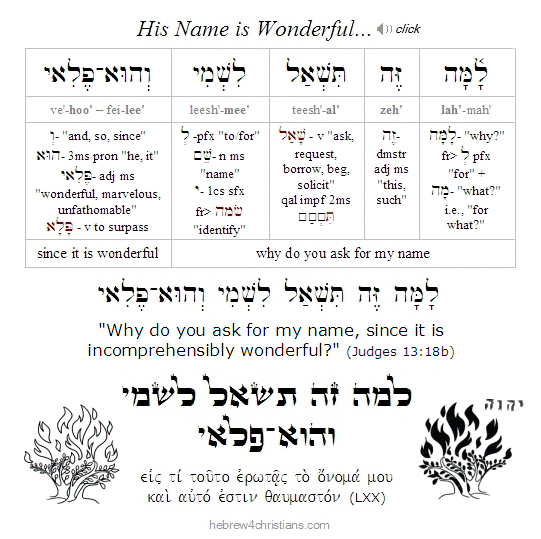 |
There are quite literally hundreds of different names, titles, metaphors, similes, allegories, and allusions given in the Hebrew Scriptures that refer to the one true God. Though YHVH is God's special Name, it is clearly a play on the verb "to be" (hayah). We do not "invoke" the Name like a magician might utter a "divine spell." God is near to us -- He's in the wind, in the heavens and earth, as close to you as your own heart (Deut. 30:14; Rom. 10:8). The really hard part is to love and obey the LORD -- not to learn how to say His incomprehensible Name. Indeed, what good would it be to know how to properly pronounce the Sacred Name of the LORD if you do not love and obey Him? If you want to call upon the Name of the LORD, seek first His kingdom and His righteousness (Matt. 6:33). Learn to know Him as your Abba...
There is the "sign" and the "signified," the name and the reference. The Hebrew word for "name" (שֵׁם) refers to more than sound made with the lips, but rather refers to truly understanding someone's reputation, character, and so on. The Name of the LORD (שֵׁם יהוה) represents the LORD God of Israel's glory, reputation, character, and mighty deeds of salvation for His people. Knowing His Name means understanding His glory as the Savior of the world (מוֹשִׁיעַ הָעוֹלָם). Indeed, personally knowing the Name of the LORD means inwardly accepting that He has valliantly acted on your behalf by saving you from the cruel bondage of your shame and sins through Yeshua, the revealed Angel of the LORD. In short, knowing who Yeshua is and what He has done for you is to know the Name of the LORD (Rom. 10:13; Phil. 2:10-11). You simply cannot know the "Name of the LORD" without knowing the Name of His Son (John 5:23; Prov. 30:4; Heb. 1:1-2).
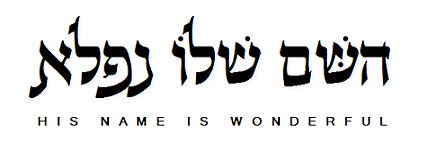 |
Postscript: The greater significance of all this is to indicate that the "Name of the LORD" is none other than Yeshua (or Jesus). Yeshua = YHVH. Compare Isa. 45:22-23 with Phil. 2:10. The idea of "Name" means more than mere phonetics; it has to do with the deeds, acts, power, reputation, and glory of God. Those who do not honor the Son do not honor the Father who sent Him (John 5:23). Denigrating Yeshua by even hinting that He is less than God Almighty is to desecrate the Name of God and engage in chilull Hashem (חילול השם).
The Breath of Hope...
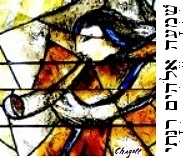
"You don't realize Jesus is all you need until Jesus is all you have." - Tim Keller
01.15.25 (Tevet 15, 5785) When Moses proclaimed the good news of God's forthcoming redemption for Israel, the Torah states that the people could not listen because they were "short of breath" (Exod. 6:9). Interestingly, this phrase (i.e., mi'kotzer ru'ach: מִקּצֶר רוּחַ) can also mean "lacking in spirit," as if in a paralyzed state of hopelessness. But how did the people become so downhearted? Had they forgotten the promise given to Abraham (Gen. 15:12-14)? Had they disregarded Joseph's final words (see Gen. 50:24-25)?
According to some of the sages, part of the reason for their "shortness of breath" (besides the cruel bondage and hard labor imposed on them) was that the Israelites miscalculated the duration of their 400 year exile, and therefore they began to lose hope. When members of the tribe of Ephraim tried to escape from Egypt some 30 years before the time of the redemption, they were all killed by the Philistines, and many of the Israelites began to believe that they would remain as perpetual slaves (Shemot Rabbah, 20:11). They became "short of breath" and could no longer receive the message of the Holy Spirit...
Indeed, life in this evil world can be suffocating at times. And though we may not be under the oppression of a cruel Pharaoh, we are affected by the "princes of this age" who spurn the message of the Messiah's redemption and love, and we are still subjected to bondage imposed by taskmasters who defy the LORD and who seek to enslave us by means of lies, propaganda, and threats of violence... The devil is still at work in the hearts and minds of many of his "little Pharaohs" that govern the world system... The Scriptures make it clear that we are engaged in genuine spiritual warfare: "For we do not wrestle against flesh and blood, but against the rulers, against the authorities, against the cosmic powers over this present darkness, against the spiritual forces of evil in the heavenly places" (Eph. 6:12).
It is evident that one of the central purposes of God's redemption is to bestow freedom and dignity upon his people. As the story of Pharaoh reveals, God does not take kindly to oppressors, dictators, and other megalomaniacal world leaders who deny the truth and who therefore seek to enslave (or kill) human beings created in His image and likeness. Just as God judged Egypt for its oppression and violence, so He will one day break the "rulers of this world" with a rod of iron and dash them in pieces like a potter's vessel (Psalm 2:9-10).
To help us "catch our breath" during this time of waiting, it is important to remember that the LORD redeems us so that we may become His children and therefore be clothed with everlasting dignity... Our redemption makes us heirs of the Kingdom of God and citizens of heaven. We must never regard ourselves as slaves - not to the State, not to the bankers, not to fear, and not to religion (Gal. 5:1). God gave up His Son for us so that we could be made free to live with honor as his dearly loved children.... All the threats of the world system - economic, political, religious, social, etc. - are ultimately made empty and vain by the glorious redemption promised to us in Yeshua our Savior.
The Scriptures declare that "we are saved by hope" (ελπιδι εσωθημεν), that is, we are saved through an earnest expectation of good to come on account of the promises of the LORD God of Israel. Amen. The LORD is called "The God of Hope" (אֱלהֵי הַתִּקְוָה), indicating that He is its Author and its End (Rom. 15:13). God both gives birth to our hope (tikvah) and is the satisfaction of our heart's deepest longings. For those with God-given hope, gam zu l'tovah – all things work together for good (Rom. 8:28). In light of God's promises, hope is the one "work" that we are called to vigorously perform: "What shall we do, that we might work the works of God?" Yeshua answered, "This is the work of God, that you trust (i.e. hope) in the one whom He sent" (John 6:28-29).
Don't let the world system destroy or impugn your hope, chaverim... If the devil can't seduce you with illusory hope or counterfeit joy, he will attempt to oppress you with fear and doubt. Fight the good fight of faith and refuse to succumb to despair. Run the race before you with endurance (Heb. 12:1). Look up, for the time of your deliverance draws near... God redeems us for the sake of His love and honor... It is the "breath of God" that gives us life and courage to face this dark and perverse world (John 20:22). May you be filled with the hope and strength that comes from the Holy Spirit. Amen.
Hebrew Lesson
Psalm 25:1-2a Hebrew reading (click):
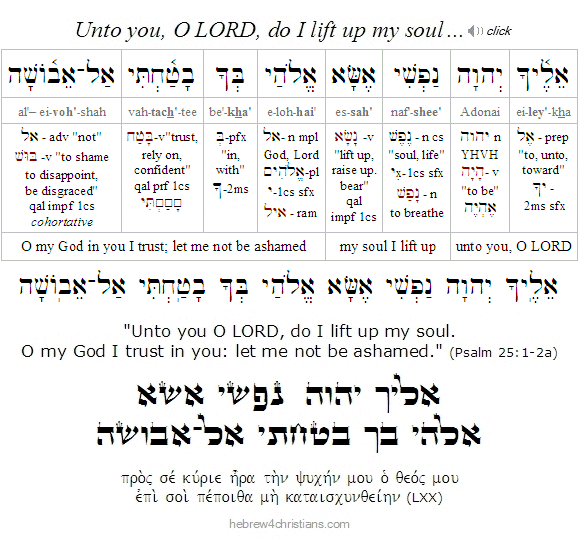 |
New Pharaoh's Dream...
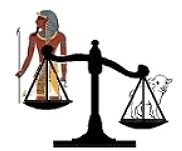
The following is related to our Torah reading for this week, Parashat Shemot...
01.15.25 (Tevet 15, 5784) According to midrash, just as Pharaoh during the time of Joseph was troubled by his dreams (Gen. 41:1-7), so was the "new king" that arose during the time of Moses (Exod. 1:8). In the new Pharaoh's dream, an old man was standing before him as he sat on his throne, holding a balance in his hand. The old man placed all the nobles and governors of Egypt on one side of the balance, and on the other side, he placed one small lamb. To Pharaoh's astonishment, however, the lamb outweighed all the leaders of Egypt! When the king asked his advisors to interpret the dream, they said it foretold of a coming king who would overthrow the kingdom of Egypt and set the Israelites free. This coming one would excel in wisdom and his name would be remembered forever as the Savior of Israel.
Of course the rest of the Book of Exodus is essentially God's interpretation of the new Pharaoh's dream, as the great events of the Exodus would reveal. The LORD God of Israel forewarned this king that Egypt would come into judgment by the Lamb of God... Indeed, the only way to escape this judgment and the wrath of God was by being covered by the sacrificial blood of the lamb... The Lamb of God is central to Israel's deliverance and becomes the focal point of the revelation of the sanctuary later given at Sinai.
Israel was redeemed from Egypt by trusting in the promise of their deliverance, as it is written, "and the people believed" (וַיַּאֲמֵן הָעָם) ... and bowed their heads and worshiped" (Exod. 4:31). Recall that the blood of the korban Pesach - the Passover lamb - was to be smeared on the two sides and top of the doorway, resembling the shape of the letter Chet (ח). This letter, signifying the number 8, is connected with the word חי (chai), short for chayim (life). The blood of the lamb (דַּם הַשֶּׂה) not only saves from the judgment of death, but it also is the means of imparting divine life and power...
Hebrew Lesson
Psalm 72:18 reading (click):
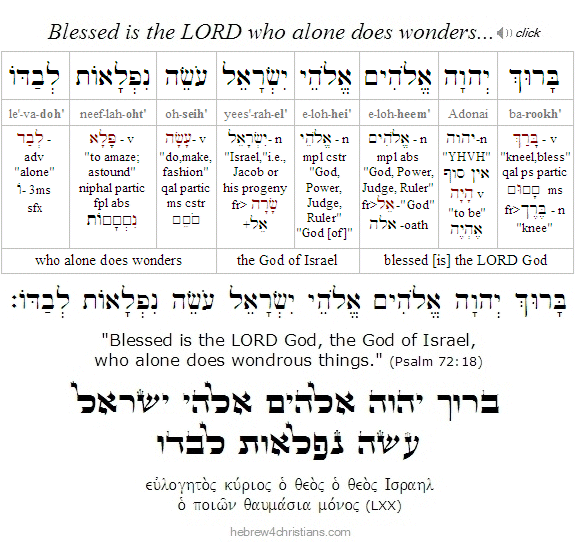 |
Mystery and God's Name...
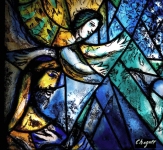
"You are encircled by the arms of the mystery of God." - Hildegard of Bingen
01.14.25 (Tevet 14, 5785) When Moses asked why he (of all people!) was chosen to be God's emissary, the LORD did not explain His decision in natural terms; nor did not appeal to Moses' past experiences, his potential, his family lineage, or even his great humility... Instead God simply said that whatever inadequacies Moses might have, being in relationship "with Him" was entirely sufficient: ki ehyeh imakh (כִּי־אֶהְיֶה עִמָּךְ): "for I will be with you" (Exod. 3:12). That is all that Moses would truly need...
When Moses neverthless sought for some way to justify his role as a prophet sent from God, he asked to know God's secret "name" (see Exod. 3:13). God's response to the request was enigmatic: אֶהְיֶה אֲשֶׁר אֶהְיֶה - ehyeh asher ehyeh: "I will be what I will be" (or I am what I am), which may be understood as, "It doesn't matter what my Name is - I will be what I will be - all that matters is that I will be with you (ehyeh imakh) -- and that is enough! Indeed, God's name is nifla (נִפלָא) - "wonderful and incomprehensible" (Judges 13:18; Psalm 139:6), since the LORD is infinite and beyond comparison to finite things (Psalm 147:5). God is the great "I AM" that pervades all of Reality (אָנכִי), the glorious Eternal Personal Presence (i.e., hayah, hoveh, ve'yihyeh) whose power constantly sustains all things. Most of all, God is declared and expressed as our Savior, the One who reveals the face of God to us all (2 Cor. 4:6).
Hebrew Lesson
Exodus 3:14a reading (click):
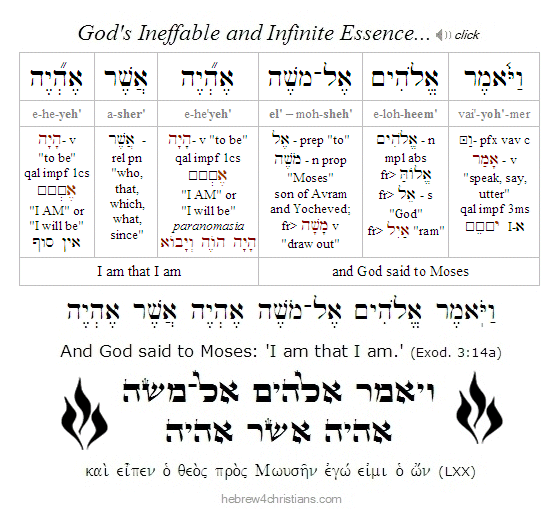 |
Regarding the perennial question of whether we can fully apprehend the inner meaning of the Name of God, we read the following vision from the New Testament: "Then I saw heaven opened, and behold, a white horse! The one sitting on it is called 'Faithful and True' (נֶאֱמָן וְיָשָׁר), and in righteousness he judges and makes war. His eyes are like a flame of fire, and on his head are many diadems, and he has a Name written that no one knows but himself (שֵׁם כָּתוּב אֲשֶׁר לא־יָדַע אִישׁ כִּי אִם־הוּא לְבַדּוֹ). He is clothed in a robe dipped in blood, and the Name by which he is called is 'the Word of God' (דְּבַר הָאֱלהִים). And the armies of heaven, arrayed in fine linen, white and pure, were following him on white horses. From His mouth comes a sharp sword with which to strike down the nations, and He will rule them with a rod of iron. And He will tread the winepress of the fierce fury of the wrath of God, the Ruler over All, the LORD God Almighty (יְהוָה אֱלהֵי צְבָאוֹת). On his robe and on his thigh he has a Name written, the King of kings (מֶלֶךְ הַמְּלָכִים) and the Lord of lords (אֲדנֵי הָאֲדנִים). And with the breath of his lips He will slay the wicked" (Rev. 19:11-16).
Notice that in this passage the LORD both has a Name that no one knows but Himself and also that is He is called 'Faithful and True,' 'the Word of God,' and so on... In other words, within Himself God's Name is something that only He can truly understand, though we can know what He is called based on the revelation and analogical language of the Scriptures. And that is enough, chaverim! Shalom.
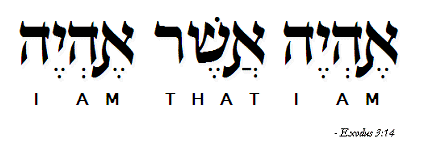 |
 |
Thorn in the Flesh...
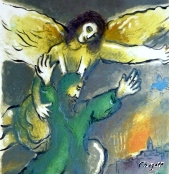
"I believe that God will give us all the strength we need to help us to resist in all time of distress. But he never gives it in advance, lest we should rely on ourselves and not on him alone." - Dietrich Bonhoeffer
01.14.25 (Tevet 14, 5785) According to midrash (Shemot Rabbah), as a very young lad Moses was once seen throwing Pharaoh's gold crown to the ground. Upon learning of this apparent act of insolence, Pharaoh devised a test to see if the child understood what he was doing. He therefore commanded that a platter with a piece of gold and a glowing piece of coal were to be presented before Moses and ordered the little boy to choose one. If Moses chose the gold, it would imply that he understood its value, and therefore he would be killed. On the other hand, if Moses chose the burning coal, he would be spared since he was unable to differentiate between gold and a glowing piece of coal. Moses began to reach out for the gold when an angel pushed his hand aside and he grabbed the coal instead. He then immediately put his hand in his mouth, but that burned his lips and tongue so badly that he had a permanent speech impediment as a result.
Later, when God commissioned Moses to speak to the children of Israel, he protested to the LORD that he was "heavy of mouth and heavy of tongue" (i.e., kevad peh ve'kaved lashon: כְּבַד־פֶּה וּכְבַד לָשׁוֹן) and therefore was unable to eloquently speak on behalf of the LORD to Pharaoh (Exod. 4:10). But the LORD said to him, "Who has made man's mouth? Who makes him mute, or deaf, or seeing, or blind? Is it not I, the LORD? Now therefore go, and I will be with your mouth and teach you what you shall speak" (Exod. 4:11-12).
When the time arrived for Moses to actually go before Pharaoh to declare God's message to let the Israelites go, he again protested to the LORD that he was a man of "uncircumcised lips" (עֲרַל שְׂפָתָיִם), an idiom that meant that he regarded his lips to be of no acceptable use to God. (Ironically the prophet Isaiah later had his lips burned to purify them to speak on behalf of God; Isa. 6:6-7). In this connection it is interesting to ask why God did not simply heal Moses of his impairment. After all, the LORD had earlier told him that He had the power to make the blind to see, the deaf to hear, and the mute to speak...
According to many of the classical Jewish commentators, God did not cure Moses of his stuttering because He wanted the Israelites to know that he was a divine messenger. When he spoke in the Name of the LORD, the stuttering miraculously entirely disappeared and Moses spoke with fluent ease. This was to teach the people not to trust in human oratory or wisdom, but rather in the power of God (see 1 Cor. 2:1-5). Just as the Apostle Paul, the "Moses of the New Covenant," was given a "thorn in the flesh" (σκόλοψ τῇ σαρκί) to keep him humbly relying upon God for his sufficiency to serve (2 Cor. 12:7-10), so Moses was rendered entirely dependent upon the LORD but thereby became a "man of words" who spoke with "circumcised lips."
"O LORD, you will establish peace for us, for You have indeed done for us all our works" (Isa. 26:12). We must always remember that God does the work "for us" (לָּנוּ) and we are His witnesses. Salvation is "of the LORD," and is not the result of our own efforts. Anything of eternal value comes from God alone, who is the beginning and end of grace. "Not by (human) might, nor by (human) power, but by my Spirit, says the LORD of hosts (Zech. 4:6).
יְהוָה תִּשְׁפּת שָׁלוֹם לָנוּ
כִּי גַּם כָּל־מַעֲשֵׂינוּ פָּעַלְתָּ לָּנוּ
Adonai · teesh·poht · shah·lom · lah'·noo
kee · gam · kohl-ma·a·sei'·noo · pah·al'·ta · lah'·noo

"O LORD, you will establish peace for us,
for You have indeed done for us all our works."
(Isa. 26:12)

Hebrew Lesson
Isaiah 26:12 Hebrew reading (click):
The LORD establishes peace for us because He is the healing source of our life. If we lose sight of this truth, we are again made subject to the "law of sin and death" (תּוֹרַת הַחֵטְא וְהַמָּוֶת), that is, the futile principle of self-justification that constitutes the "wheel of suffering." We can escape this cycle only when we accept the truth about our condition and trust God for our deliverance. It is the "law of the Spirit of Life" (תוֹרַת רוּחַ הַחַיִּים), that is, the inner reign of the Holy Spirit, that sets us free from the reign of sin that leads to death...
True and False Worship...

There is something worse than death that should concern all people, and that is discovering that, upon your death, you had missed what is most important, that you sold your soul for vanities, and that you never learned the true reason for your existence...
01.13.25 (Tevet 13, 5785) Asks the Savior: "Why do you call me 'Lord, Lord,' and not do what I tell you?" (Luke 6:46). Regarding this question Kierkegaard comments: "True worship quite simply consists in doing God's will. But that kind of worship was never to people's liking. What occupies people in every age is to arrange another kind of worship that consists of doing their own will, but in such a way that God's name, calling upon God, is connected with it, whereby people think themselves protected against being ungodly – alas, although precisely this is the most definite kind of ungodliness" (The Moment: 1854). It is easy to go wrong here. The will of God is forever to trust in his Son, and indeed, this is the "work of God" (John 6:28-29). Yet this means suffering for God, needing him, yearning for his daily blessing, being abandoned to his care for your life... When out of the depth of our need – without pretense and in despair over ourselves – we cry out to the LORD, he will surely help us. As it is written: "If we ask according to his will, he hears us" (1 John 5:14), and therefore it is the heart's need for Him that is the will of God...
"Not everyone who says to me, 'Lord, Lord,' will enter the kingdom of heaven, but the one who does the will of my Father who is in heaven. On that day many will say to me, 'Lord, Lord, did we not prophesy in your name, and cast out demons in your name, and do many mighty works in your name?' And then will I declare to them, 'I never knew you; depart from me, you workers of lawlessness'" (Matt. 7:21-23). Despite the profession and practice of their faith, these people were strangers to God... They had a false sense of assurance, believing that they were "serving God" while they really were not... Therefore the essential question here is whether Yeshua truly knows you and the need of your heart. You may know a lot about God, religion, spirituality, and yet you may remain unknown by him... Where do you find life? What are you loving? Where are you going?
"On that day many will say to me, 'Lord, Lord, did we not ... do many mighty works in your name?' And then will I declare to them, 'I never knew you" (Matt. 7:22-23). From this we understand that good works - even those done in the name of Messiah - are insufficient for life, and that something more is needed... That "something more" is the reality of relationship with him. However, even Yeshua's sacrifice on the cross can't bring you into relationship with him apart from personally receiving it for your healing... By faith you encounter Yeshua clothed in your flesh, your sin, and suffering death for you. "As long as Christ remains outside of us we are separated from him."
Hebrew Lesson
Psalm 16:2 reading (click for audio):
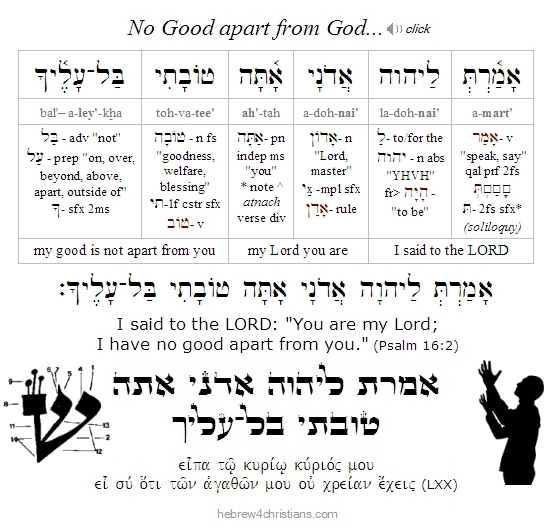 |
God Knows your Name...
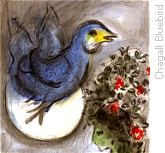
01.13.25 (Tevet 13, 5785) The book of Exodus opens with the words "ve'eleh shemot" (וְאֵלֶּה שְׁמוֹת), "and these are the names" (of the children of Israel). The LORD calls each person by name to make the journey... The Creator of all things (הבורא של הכל) calls each star by its own name (Gen. 22:17, Psalm 147:4) and yet He also knows each lily of the field and sparrow that flutters its wings (Matt. 6:28-30, 10:29). As Yeshua said, even the hairs on your head are all numbered (Matt. 10:30).
The term hashgachah pratit (הַשְׁגָּחָה פְּרָטִית) refers to God's personal supervision of our lives (hashgachah means "supervision," and pratit means "individual" or "particular"). Since God is the Master of the Universe, His supervision and providence reaches to the smallest of details of creation - from subatomic particles to the great motions of the cosmos. Of particular interest, however, are those whom He created be'tzelem Elohim: in His image and likeness. The LORD is called אלהֵי הָרוּחת לְכָל־בָּשָׂר / Elohei ha-ruchot lekhol-basar: "The God of the spirits of all flesh" (Num. 16:22), and that means that every spirit ultimately answers to Him.
We find great comfort when we understand that God has complete authority over categorically everything in the universe -- including our ultimate welfare (John 10:27-28). When we pray to the LORD God of Israel, we intuitively understand that He is completely sovereign and Lord over all things... All power, glory, authority, and dominion is His alone, and all that is in the heaven and in the earth is His (1 Chron. 29:11-12). We do not worry that He is incapable of handling our troubles or that He is unable to help us. No, we acknowledge that the God most High (אֵל עֶלְיוֹן) sustains all things by the Word of His power (Col. 1:17). He is "the blessed and only Sovereign, the King of kings (מֶלֶךְ הַמְּלָכִים) and the Lord of lords" (1 Tim. 6:15). Whenever we think clearly in light of the revelation of Scripture, we apprehend the truth about God's sovereign glory and power...
Hebrew Lesson:
Psalm 139:7 Hebrew reading (click):
Sefer Shemot - ספר שמות

"All names of God remain hallowed because they have been used not only to speak of God but also to speak to him." - Martin Buber
01.12.25 (Tevet 12, 5785) Over the next several weeks (until the end of March, 2025) we will be reading and studying the Book of Exodus (סֵפֶר שְׁמוֹת) and considering its message in light of the revelation of Yeshua our Messiah. Some of the greatest narratives of all the Scriptures are found in this amazing book, including the Israelites' enslavement and subsequent deliverance with the ten plagues by the hand of the LORD. After the great Passover, Moses led the people out of the land Egypt, crossing the Sea of Reeds, and arriving at Sinai to receive the Torah exactly 49 days later. While Moses was on the mountain, however, the people worshipped a Golden Calf, and a long period of repentance occurred until the covenant was reestablished. The remainder of the book describes the amazing vision and construction of the Mishkan (Tabernacle) -- the great Altar upon which a defect-free lamb (קָרְבָּן תָּמִיד) was offered every day and every night...
In English the word "Exodus" ("going out") comes from the title of the ancient Greek translation of the phrase Sefer Yetziat Mitzraim ("the book of the going out from Egypt"). Hence the Greek word ἔξοδος became "Exodus" in Latin which later was adopted into English. In the Hebrew Bible this book is called Shemot (i.e., שְׁמוֹת, "names"), following the custom of naming a book according to its first significant word.
Hebrew Lesson
Psalm 66:6 reading (click):
Parashat Shemot - פרשת שמות
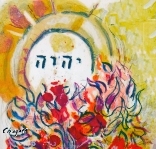
01.12.25 (Tevet 12, 5785) Our Torah reading for this week is the very first of the Book of Exodus, called "parashat Shemot" (i.e., Exod. 1:1-6:1). This portion begins directly where the Book of Genesis left off, namely by listing the various "names" (shemot) of the descendants of Jacob who came to Egypt to live in the land of Goshen.
Over time Jacob's family flourished and multiplied so greatly that the new king of Egypt – who did not "remember" Joseph - regarded them as a political threat and decided to enslave them. When the king's oppression did not curb their growth, however, he cruelly commanded the Hebrew midwives to kill all newborn Jewish boys. When the midwives bravely refused to obey, however, the Pharaoh commanded that all newborn boys were to be drowned in the Nile river (the Hebrew word for Egypt, Mitzrayim (מִצְרַיִם), can be rearranged to form the phrase tzar mayim (צַר מַיִם), meaning "torture through water," which was the plan of the nefarious Pharaoh).
During this time of terrible and appalling oppression, a family from the tribe of Levi bore a son and hid him for three months. When the baby could no longer be concealed, however, his mother Yocheved (יוֹכֶבֶד) set him afloat in the Nile River inside a basket, praying that he might somehow escape death. Miriam (מִרְיָם), the baby's sister, watched what would happen, and soon the basket was discovered by the daughter of Pharaoh, who decided to save the baby and adopt him as her own son. Miriam then cleverly offered to have her mother become the baby's wet-nurse for the princess. After the child was duly weaned, he was brought to Pharaoh's palace to live as the princess' son. The Egyptian princess named him "Moses" (משֶׁה), meaning "drawn out" (מָשָׁה) of the water.
Later, when Moses was a full-grown man, he "went out to his people and looked on their burdens." When he saw an Egyptian beating an Israelite slave, he killed the Egyptian and hid his body in the sand. The following day he tried to reconcile two Israelites who were fighting, but the one in the wrong prophetically objected: "And who made you a prince and judge over us? Do you want to kill me as you killed the Egyptian yesterday?" Upon hearing this Moses decided to flee from Egypt to Midian. There he rescued Zipporah (צִפּרָה), the daughter of Jethro (יִתְרוֹ), a Midianite priest. Soon afterward, Moses decided to work for Jethro and married Zipporah. They had a son named Gershom (גֵּרְשׁם, "a stranger there").
After nearly 40 years living in Midian as a shepherd, God called out to Moses from the midst of a burning bush (סְנֶה בּוֹעֵר) to commission him to lead the Israelites out of Egypt back to the land He promised to the descendants of Abraham, Isaac, and Jacob. When Moses protested that he was inadequate for this task, God gave him three "signs" to authenticate his message. God also appointed his brother Aaron to be his spokesperson.
Moses and Aaron then went to the Pharaoh and demanded that the Israelites be permitted to leave Egypt to worship the LORD in the wilderness. Shelach et ammi! "Let my people go!" The Pharaoh, however, dismissed Moses and his God, and increased the workload of the slaves by forcing them to make bricks without straw. This set the stage for the great "showdown" between the LORD and the worldly power of Satan, as embodied in the Pharaoh...
May we all have great joy and strength as we begin reading a new book of Torah for this new (secular) year. Chazak ve'amatz, mechayil el-chayil chaverim...
No One Knows the Hour...
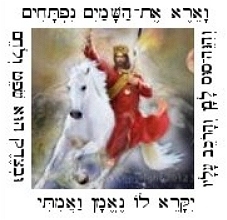
Our Torah reading for this week is Parashat Vayechi, the last portion from the Book of Genesis, which includes Jacob's blessing of his sons...
01.10.25 (Tevet 10, 5785) When the time came for Jacob (i.e., Israel) to die, he called all his sons together. According to midrash, Jacob wanted to tell them about the "End of Days" (i.e., acharit ha'yamim: אַחֲרִית הַיָּמִים) when the Messiah would come, but was prevented by the Holy Spirit. According to the Jewish sages, God prevented Jacob because He does not want anyone to know the "day or the hour" when the great King of Israel would appear...
Why not? Why wouldn't God want to tell his children the hour of the promised Messiah's appearance? According to tradition, if people knew how long they would have to wait, they might despair of life altogether, or, if they knew the exact time, they might "repent" just for that reason, and not because it came from the heart...
On the other hand, Jacob's prophecy regarding the coming of the Messiah as a future ruler from the tribe of Judah alluded to the timing of the Messiah's appearance. To review, Jacob prophesied that "the scepter will not depart from Judah, nor the ruler's staff from between his feet, until 'Shiloh' (שִׁילוֹ) comes..." (Gen. 49:10). If the regency of Judah was established in the Jewish Sanhedrin, the scepter (rod of authority) would have departed from Judah in AD 6-7 after the Romans installed a procurator as the authority in Judea. This prophecy, then, would have failed. However, since the Messiah had indeed come and was in their midst as Yeshua mi-netzeret (Jesus of Nazareth) during this time, Jacob's prophecy didn't fail.
Nonetheless, like most prophecies in Scripture, this one has a "dual aspect" or "double fulfillment." The "King of the Jews" (a synonym for the Messiah, called "Christ" by Gentile Christendom) had indeed come "before the scepter departed from Judah," but he went unrecognized since he came to fulfill the role of the Suffering Servant (Mashiach ben Yosef). The second part of the prophecy, "and to him shall be the obedience of the nations," is yet to be fulfilled. It will become a visible reality only after his Second Coming, at the end of olam ha-zeh (this present age), when Jesus comes to judge the nations (the "sheep and the goats") and establish the Kingdom of God from David's throne in Jerusalem.
Note: Jacob's prophecy that "the scepter will not depart from Judah... until Shiloh comes" includes all the letters of the Hebrew alphabet except for the letter Zayin, which is the Hebrew word for weapons, suggesting that when the Messiah comes, it will not be by means of arms or weapons, but rather by the ruach ha-kodesh.
There is an old story of the Magid of Brisk who each year would bring proof from the Torah that the Messiah would come that year. Once a certain Torah student asked him, "Rabbi, every year you bring proof from the Torah that the Messiah must come that year, and yet he does not come. Why bother doing this every year, if you see that Heaven ignores you?" The Magid replied, "The law states that if a son sees his father doing something improper, he is not permitted to humiliate him but must say to him, 'Father, the Torah states thus and so.' Therefore we must tell God, who is our Father, that by keeping us in long exile, he is, in a sense, causing injustice to us, and we must point out, "thus and so it is written in the Torah," in hope that this year he might redeem us." This same principle, of course, applies to those of us who are living in exile and who eagerly await the second coming of the Messiah Yeshua. We should continue asking God to send Him speedily, and in our day, chaverim...
Regarding the Messiah's Second Coming, we therefore find ourselves in the same position of expectation as Israel's sons who heard the original prophecy. Though Jesus told us about the "signs" of the time (and the "fig tree has brought forth its leaves," see Matt. 24:32-33), we do not know the exact "day or the hour" and therefore must be ready for his return at any time (Matt. 24:36-25:13). The Spirit and the Bride say, "Come." Maran ata, Yeshua!
Hebrew Lesson:
Genesis 49:10 reading (click):
Yeshua the True Vine...

01.10.25 (Tevet 10, 5785) Shalom chaverim ahuvim. Yeshua said, "I am the true vine, and my Father is the Gardener. Every branch in me that does not bear fruit he takes away, and every branch that does bear fruit He purges (καθαιρει), that it may bear more fruit" (John 15:1-2). In other words if you bear fruit you will experience the "purging process," and that means suffering affliction...
This might seem to you backward: Why does the fruitful branch need to be cut back? Indeed, the promise of suffering is not meant for an evil person, but for the righteous soul who trusts in God. Purging is painful but it is also purifying, yielding new growth within our hearts. Yeshua taught, "Blessed are the pure in heart, for they shall see God" (Matt. 5:8). The Greek word translated "pure" is katharos (καθαρoς), sometimes used describe the cleansing of a wound (catharsis), or to describe the unalloyed quality of a substance revealed through refining fire.
We "rejoice" in testing because that is the way of real growth, sustained hope, and the revelation of God's deep love (Rom. 5:3-4). In our afflictions we are given heavenly consolation that helps us to persevere (2 Cor. 1:3-5). Remember that we are being weaned from this present age to be made ready for heavenly glory, for things unimaginably wonderful, soon to be revealed to you. Stay tuned, friends: the best is yet to come!
Yeshua warned us, however, that "if anyone does not live in Me, he is cast off as a branch, and withers..." (John 15:6). We find life only as we remain connected to the Source and Conduit of life, who is the Messiah, the Savior and LORD. True life grows out a heart connection with Yeshua, and without that connection our lives become vain and yield no eternal significance (John 15:5). Be forewarned: it is the Torah of Messiah that if you do not live in the Vine you will wither away, since life is found in no other Source (John 14:6; Luke 3:9). But be encouraged, trusting friend: we cannot create new life by our own efforts or effect regeneration by means of our own "good works." No, the work of salvation is God's alone, and we partake of that work as we abandon our self-efforts and forsake our religious conceits (see Isa. 32:17; Mark 4:26-29).
There remains, therefore, a Sabbath for the people of God, "for whoever has entered God's rest has also rested from his works as God did from his" (Heb. 4:9-10). This "deep Sabbath" is a matter of trusting that the work of salvation has been accomplished on your behalf. Therefore "strive to enter into that rest," for the LORD always effects what is best for you. The path of peace is to surrender to God's care for your life and let the evils and dramas of this world flow past you. This is "the work of faith." Look to heavenly reality and not to the vanity and deceits of this world (Col. 3:1-4); live in Yeshua's Presence, drawing strength and vitality from your relationship with Him. The fruit of the Spirit is produced as we surrender and yield ourselves to the love and presence of God.
Hebrew Lesson
John 15:1 reading (click):
The Source of Light...
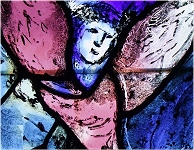
01.10.25 (Tevet 10, 5785) It is written in our Scriptures: "God is light and in him is no darkness at all" (1 John 1:5). Our Savior is "the Light of the world," the overarching Reality that gives light to every soul who is born (John 1:9). As the Source of all light, the Light before physical light, his power is irrepressible, invincible, and overcomes every shade of darkness (Gen. 1:3). Yeshua is the Logos (Λόγος), the underlying "logic" of all of creation. Unlike the transient radiance of the heavenly bodies, the Divine Light remains constant and supreme over all of creation, without any diminution or variation: God is the "Father of Lights" (James 1:17). And just as we know that the sun still shines even on the most overcast of days, so we understand that the Divine Presence is always there -- always giving, always shining, always loving us... We can trust in the power of our God to help us, since His radiance and truth pervade the darkness to enlighten our way (Psalm 112:4). As Yeshua said of his mission, "I have come into the world as light, so that whoever believes in me may not remain in darkness" (John 12:46). O precious LORD our God, let your light shine upon us...
God's blessing flows, but we must open the eye of faith for the light of God's love to shine within us brightly. As our Savior said, "Whoever has my commandments and keeps them, such is the one who loves me. And the one who loves me will be loved by my Father, and I will love him and will manifest myself to him" (John 14:21). Note that the Greek word for "manifest" means to "shine inside" (i.e., ἐμφανίζω, from ἐν, "in" and φαίνω, "shine"), indicating that the revelation would be the inward light of the Divine Presence. Indeed, the Hebrew word for "praise" (i.e., tehillah: תְּהִלָּה) comes from a verb that means "to shine" (i.e., halal: הָלַל), from which the word "halo" is derived. Similarly, the word "aura" comes from the Hebrew word "ohr" (אוֹר), meaning "light." Let your inner light shine before others so that they may see your good works and give honor to your heavenly Father" (Matt. 5:16).
Hebrew Lesson
Psalm 31:16 reading (click for audio):
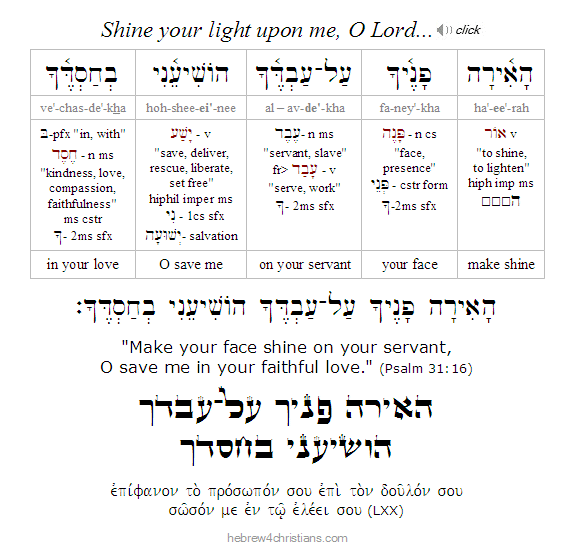 |
Healing and Anxiety...
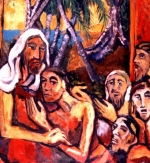
01.10.25 (Tevet 10, 5784) There are different levels of awareness, and different levels of ignorance as well. Regarding awareness, which we may call the "light of the mind," there are things we know that we know, and things that we know we do not know, the common term here being knowledge of the status of our ideas. Regarding ignorance, which we may call "darkness of the mind," there are unknown things that we supposedly know, and unknown things that we have no idea about. The former is a darkness that does not know of its darkness, while the latter is utter blindness.
The things we know that we know are truths that are "certain" within our souls. For example, Descartes' axiom that "I think therefore I am" is a foundational truth of thought. Some would also say that "God exists" is a truth that once known cannot be unknown. Other known truths include empirical observations such as oxygen is necessary for respiration, that fire burns, and so on. Of course such truth also includes things we know that we do not know, such as how God exists within himself and many (many) other things that we know that we do not understand.
There is a sort of twilight or "gray" area when we consider things we somehow "know" but are unaware of why we know them, and these may be "blind spots" in our thinking or hidden biases or murky assumptions that we might use when we interpret ourselves or the world around us. If knowledge is defined as "justified true belief," then such unknown "knowns" are more like superstitions, hunches, and unreflective opinions than genuine knowledge itself... They are shadows below Plato's "divided line." Often such "unknown knowns" are fallacies based on generalizations and cultural programming.
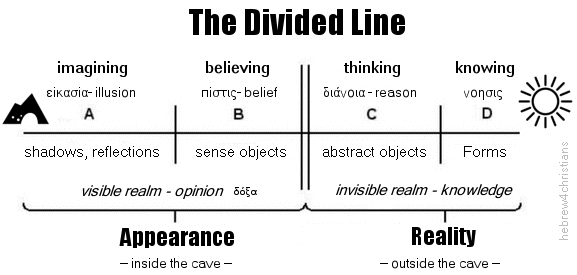 |
The shadowy twilight that does not know its darkness is dangerous because it does not see that it does not see, or it doesn't understand its limitations, and therefore it assumes, perhaps unconsciously, that it sees well enough and thereby ignores the duty to engage in self-examination or critical thinking. It is a form of stupidity to assume that your thinking is beyond falsification. "If the light that is in you be darkness, how great is that darkness!"
Finally there is realm of the "unknown-unknowns," that is utterly unknown things of which we have no idea, and of which if we had an idea would no longer be in the realm of the utterly unknown. This is the darkest pitch of the mind, utter blindness of which we simply cannot speak... As such there is nothing that can be said of this darkness other than that it is darkness unto itself, and therefore irrelevant.
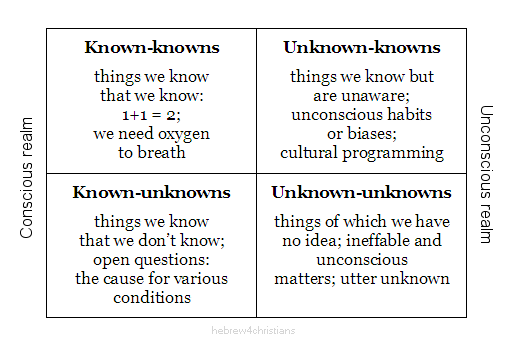 |
I should mention, however, that we should be careful not to equivocate when using the words "darkness" and "light." For instance there a "darkness of the heart" that may be sorrowful and full of gloom, though if this darkness is known as being in darkness it is still in the light of truth. Many godly people have experienced this darkness yet were still in God's light. Think of Job, Elijah, Jeremiah, Amos, Zechariah, King David, and of course Yeshua himself. This sort of darkness is not so much a cognitive darkness (though it can be) as much as an emotional darkness experienced in feelings of sorrow, grief, affliction, and even abandonment. And while this darkness may afflict the heart and soul, if it is expressed in communion with God it is given its voice in the life of faith.
The same may be said of the light. Some people may experience the light of revelation but abide in darkness by refusing to accept its authority. Think, for instance of someone who simply "professes" faith in God but this does not yield any significant difference in the manner of his life, or think of the atheist scientist who observes the wonders of nature but consigns their source to irrational and meaningless forces. When "science" goes beyond empirical observation, it runs the risk of assuming a form of metaphysical dogmatism.
But what of the darkness of mind that believes that is in the light but is not truly so? What about the darkness of hypocrisy or self-deception? Well first of all, we all sin and fall short of God's standard, so our sinfulness is an ongoing problem as we learn to surrender more and more of our hearts to God. But if someone seriously questions whether they are a hypocrite, the mask of self-deception is already being removed and the heart confesses its great need for God's healing and mercy. And in a sense we never get beyond that place, do we? However the one who loudly affirms that he is a true believer, one who says, "though others may forsake you, I never will!" has yet to fully know the depths of his need. Ironically it is the one who is sure that he has no need may be the neediest one of all...
Here again we note the essential demand to be honest with ourselves, for there can be no genuine spirituality apart from honesty of heart. "Lord I believe, help my unbelief" is the prayer of an honest soul. It is a confession of ambivalence, of double mindedness. "I hope, but I feel hopeless." "I want to love, but I feel empty inside." "I want life, beauty, and truth, but I feel numb, fading, and uncertain."
The answer to our ambivalence is always to turn to the Lord and focus on him. Have I doubted God? Have I sinned? Am I self-deceived? The remedy is always the same: Turn to the LORD and realize that whatever you are, whatever you have gone through, and whatever you hope to be, is held in His heart, and as you draw close to his heart, you will no long be anxious over yourself if only you are with Him...
Do you really love God? Don't think of love as a noun but as a verb. "O Lord, you know that I love you," said Peter, after turning away from himself (John 21:17). Perfect love casts out fear. When we quit wondering if we are of any use to God and simply surrender to his love for us, we will be filled with his glorious light. Amen.
Hebrew lesson
Psalm 36:9 reading (click):
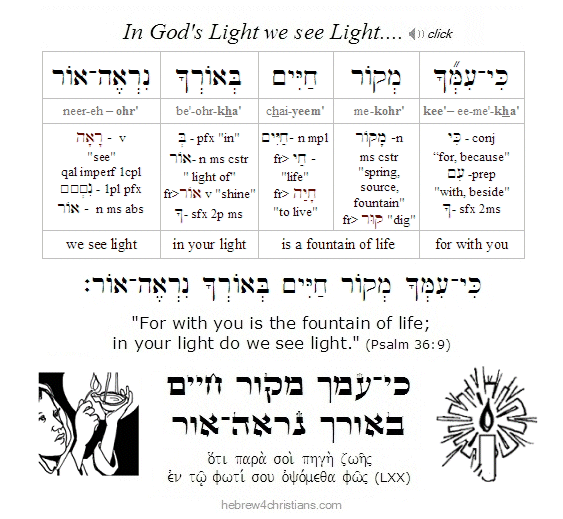 |
Overcoming Anxiety...
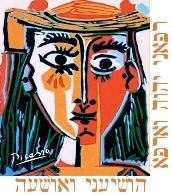
"To look away from the world, or to stare at it, does not help a man to reach God; but he who sees the world in Him stands in His presence." - Martin Buber
01.09.25 (Tevet 9, 5784) Why do we often feel anxious? Why are we filled with unease and worry about what might happen to us? Is it not because everything seems out of our control? The world around us seems threatening and unstable; our interpersonal relationships are fragile and vulnerable; our bodies are sick and faltering; we grow despondent, lonely, and grieved. Time relentlessly passes and dissolution seems omnipresent; we feel distressed, swallowed up, overwhelmed, and powerless: the smoke and ashes from our depths....
Now while it is true that everything is out of our control, it is not true we are utterly alone, the victims of unhappy chance and sorrowful fortune, for we find life in relationship with a loving God who has repeatedly told us that he is with us always, through all the byways and valleys, and that he will never leave nor forsake us. The Lord has promised to shepherd us through the present darkness; he is the ground of our being, the place of our refuge.
We do not deny reality or pretend that we are not in struggle between hope and despair. But while it is true that we are in a world that is frightening and uncertain, we are given strength by God to walk in shalom here, to bear witness of his radiant light. We are "in" but not "of" the world -- a realm that God has subjected to vanity in order to redeem it to a heavenly and eternal hope (Rom. 8:20). You are not alone, friend; you are part of God's blessing. The Lord is with you and he provides you sure refuge and abiding comfort in the midst of the storm. God is always between you and your wounds...
Just as humanity was plunged into darkness through unbelief, so we are brought to the light through faith in God's deliverance. Therefore hold fast to hope, and keep the fire of your heart burning, friend... Rabbi Nachman once told a person who was struggling with his faith: "It is written that all creation was brought into being because of people like you. God saw there would be people who would cling to our holy faith, suffering greatly because confusion and doubt would plague them. God perceived that such would overcome these doubts and troubles of heart and remain strong in their belief. It was because of this that God brought forth all creation." Amen. Repudiate anxiety and never yield to despair, since that leads to further darkness and fear. "Do not be anxious (i.e., inwardly divided, two-hearted) over anything, but in every thing by prayer bring your needs before God with gratitude, and the peace of God that surpasses all understanding (שלום אלוהים העולה על ההבנה) will guard your hearts and minds in Yeshua the Messiah (Phil. 4:6-7).
Press on and keep fighting the "good fight" of faith (1 Tim. 6:12). When the aapostle Peter lost courage at the sight of the swelling waves, Yeshua reached out his hand and took hold of him, saying, "O you of little faith, why did you doubt (lit., think twice)?" Remember that you infinitely matter to heaven; your life has great value; you are significant and you are truly loved by our Heavenly Father. "The LORD your God goes with you to fight on your behalf against your enemies to give you victory" (Deut. 20:4).
We are not alone; God will help us get through... "I am sure of this, that he who began a good work in you will bring it to completion (ἐπιτελέω) at the Day of Yeshua the Messiah" (Phil 1:6). The LORD is able to guard you (φυλάξαι) from stumbling and to present you blameless before the presence of His glory with great joy (Jude 1:24). "The LORD upholds all who are falling and raises up all who are bowed down" (Psalm 145:14). "He will sustain you to the end, guiltless in the Day of our Yeshua the Messiah" (1 Cor. 1:8). He who calls you is forever faithful; He will surely do it (1 Thess. 5:24). Yea, "the Lord is faithful (נֶאֱמָן הוּא): He will establish you and guard you against the evil one" (2 Thess. 3:3). The Spirit of the Lord says, "Fear not, for I AM with you always." Amen and amen.
Hebrew Lesson
Isaiah 41:13 reading (click):
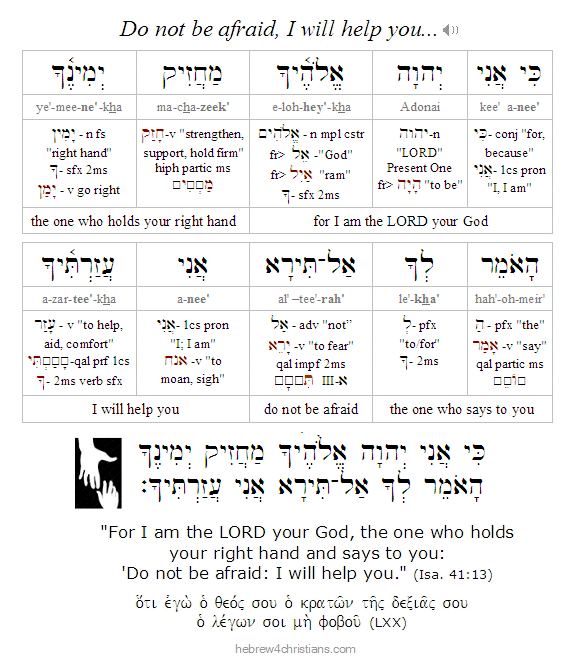 |
The Shepherd of Israel...
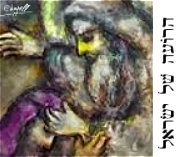
"Faith is the strength by which a shattered world shall emerge into the light." - Helen Keller
01.08.25 (Tevet 8, 5785) Among other things, the story of Joseph reveals how God's hidden hand moves for good in our lives. At the end of this week's portion (i.e., parashat Vayigash), we read that Jacob had finally arrived in Egypt and met with Pharaoh, whom he blessed. When the king asked Jacob how old he was (i.e., kamah yemei sh'nei chayekha - כַּמָּה יְמֵי שְׁנֵי חַיֶּיךָ), Jacob said he was 130 years old, though he added that his days had been "few and evil" (מְעַט וְרָעִים) when compared to the lives of his fathers (Gen. 49:7-10).
Surely Jacob had reason for regarding his life as full of troubles. Estranged from his family at a young age, he became a fugitive to escape the wrath of his wicked twin brother Esau. He fled the land of his fathers only to become an exile who was ruthlessly exploited by his uncle who tricked him into marrying his older daughter Leah instead of the younger daughter Rachel whom Jacob had requested to be his bride. Though later he was permitted to marry Rachel in exchange for additional years of servitude, he lived in the midst of a sibling rivalry and acrimonious strife between the sisters and their concubines. When he finally fled from his uncle's ranch some 20 years later to return home, Jacob learned that his mother Rebekah had died, and some time later, as he finally set foot in the promised land, his beloved Rachel died while giving birth to their son Benjamin. Tragically Rachel never got to meet Jacob's mother or father before she died.
Later, Jacob gave Joseph - who was his firstborn son from Rachel - a special tunic in recognition of his privileged status, but Joseph was cruelly betrayed by his brothers and sold into slavery. The brothers then told their father Jacob that Joseph had been killed by wild animals and showed him his blood-splattered tunic. Jacob's hope that his beloved son would become a great leader and heir of the family was shattered, and he lived under that cloud for another 22 years before learning that Joseph was indeed alive, after all...
The sages say that Jacob appeared older than his years because of his suffering, and that is why he regarded his days as "few and evil." However in this connection they note the linguistic similarity between the Hebrew word "evil" (רָעָה) and the word "shepherd" (רֹעֵה) which they thought suggested that what we perceive as evil or misfortune is nevertheless conducted by our Shepherd who guides our way (Psalm 23:1). Often we do not understand why things happen the way they do, but a person of faith refuses to indulge in self pity or to be embittered over what God has decreed for their life.
So while Jacob said that the days of his life had been "few and evil," he nevertheless reconciled himself to God's will and regarded the LORD as his Shepherd. Indeed before he died Jacob asked Joseph to bring his sons Manasseh and Ephraim to his bedside so that he could bless them as his own children. When Joseph brought them to Jacob he said: "God, before whom my fathers Abraham and Isaac walked, the God who has been my Shepherd (האֱלֹהִים הָרֹעֶה אֹתִי) all my life long to this day, the Angel who has redeemed me from all evil bless the lads; let my name be named upon them, and the name of my fathers Abraham and Isaac; and let them grow into a multitude in the midst of the earth" (Gen. 48:15-16).
At this point in his journey we see that Jacob's heart was resolved as he affirmed that the LORD was the Shepherd who had guided all his days. And just before died, he insisted on being buried in the Promised Land, in the Cave of Machpelah where Abraham and Sarah, Isaac and Rebekah, and Leah his wife were buried, being fully assured that his salvation and the redemption of Israel would be forthcoming as well.
Hebrew Lesson
Psalm 23:1 reading (click):
|



































